EUROF RUIT
PUBLISHED BY
HALL 5.2 / STAND A-50


Many companies in Europe have adapted well to new trends, demands and technical challenges
All in the balance as another year

HALL 5.2 / STAND A-50


Many companies in Europe have adapted well to new trends, demands and technical challenges
All in the balance as another year
The fresh produce business faces its biggest balancing act yet in 2025. From extreme weather events and a rising tide of costs, to shifting trade policies and supply chain pressures, the challenges continue to stack up. But for an industry rooted in resilience, every challenge is an opportunity. And that fact remains abundantly clear in this, our first of two editions for Fruit Logistica 2025 in Berlin. Over these 160 pages, you can explore various trends that are expected to drive developments here in Europe, and beyond, over the next 12 months. Nobody pretends it will be simple, but there is real enthusiasm and positivity about the growth potential of fresh produce. Importantly, Europe remains at the heart of that dynamic marketplace, and many of its companies have adapted well to new consumer trends, sustainability demands, and technical challenges. And, as markets in other parts of the world come into play, suppliers are also swapping old strategies for fresh ideas. The business may be complicated, but it’s also packed with possibility. E

Mike Knowles, Editor
Follow me on LinkedIn @mikefruitnet
ON THE COVER As the second quarter of the new millennium begins, Eurofruit reports on the major trends you can expect to encounter in the year ahead
Fruitnet Media International GmbH, Lindemannstrasse 12, 40237 Düsseldorf, Germany ©2025 Market Intelligence Limited, part of Fruitnet Media International. All rights reserved. Neither this publication nor any part of it may be reproduced, stored or transmitted in any form, including photocopies and information retrieval systems, without prior permission of Market Intelligence Limited. Eurofruit Magazine is a registered trademark of Market Intelligence Limited. Market Intelligence Limited The Food Exchange, New Covent Garden Market, London SW8 5EL, UK Published January 2025. Printed by Drukarnia Know-How, Modlnica, Poland Visit fruitnet.com for full contact details and the latest fresh produce business news.

Experience the Legend. Somewhere, nestled in the magical lands of Morocco, you’ll find a hidden, almost mythical treasure – the original tree that brought to life the exquisite Nadorcott mandarin. This treasured fruit is carefully cultivated in secluded, protected orchards that are the birthplace of the variety.
The Association of Moroccan Nadorcott Producers invites you to discover the remarkable story of a citrus revolution and a global sensation. Taste the legend for yourself!
8 BayWa’s debt problem
Restructuring casts shadow over T&G
10 News roundup
All of the latest key developments
26 Interview: Franka Rodriguez, Aldi
Retailer extends ethical model to avocados
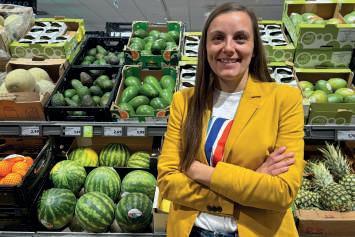
30 Interview: Gianpaolo Renino, Del Monte
Novel strategies for growth in Europe
34 Change at the top for Corbana
New GM for Costa Rica banana association
36 Comment: Shoots of growth
Technology offers a route out of stagnation
38 European expansion bodes well for grapes
Breeders and suppliers innovate to grow
50 Analysis: Getting diversification right
How exporters can reach new markets?
54 Zespri looks to healthier tomorrow
Company reports on sustainability actions
56 Citrus faces uncertainty as volume falls
But some companies are on the up
68 Dutch importer unearths local roots
Sawari brings ginger production to Europe

72 The Greenery points in new direction
New cabbage could inspire shoppers
73 GlobalGAP brings equity to markets
New scheme offers entry-level option
74 Interview: Ofer Peleg, Hazera
Seed company enters centenary year
76 Belgium’s big opportunity
Global pressures could work in its favour
82 Berry suppliers try to meet new demand
Innovation abounds as category grows
94 Kiku rebrands as Adema
97
Apple clubs, commodities, and services
Vog Products and Vip act on climate change
Sustainability in action up in the Alps
98 Jingold puts kiwifruit buyers on red alert
100
102
New marketing push for Exotic Red
Ocati sees growing interest in passion fruit
Colombian supplier spots market potential
Expansion on cards for Calypso mangoes
Perfection Fresh outlines its ambitions
104 IPD enhances transparency and trust
German group bridges trade gaps
108 Time for Egypt to liquidise some assets?
A new focus on juice may revive the market

112
114
124
126
Turkey’s Alya Fruits invests to expand
Production up but cost concerns remain
South Africa faces up to new reality
Special report on the country’s exports
French apple campaign makes India debut
Interfel adds new market to Asian promos
Maf Roda explains automation trend
New drivers for sales of sorting machines
128 Positive feedback for Sinclair’s new label
132
140
Time to switch to home compostable?
Packaging and technology updates
Value-adding innovations aplenty
Key developments in logistics
New and greener growth
150 Is Russia ready to relax restrictions?
Trade bans, frost damage, and a weak ruble
154 Interview: Global Star Group
Shahzad Zafar and Stefano Iorini
156 Fresh Take: Marrakech, Morocco
158
160
Mobile trade in an ancient marketplace
Retail trends for 2025
Fresh inspiration from the frontline
Store Check: Albert Heijn
Convenience convinces
fruitnet.com/grapecongress
Fruitnet Grape Congress brought together leading players from the table grape category to connect and share in-depth experience and expertise, whilst exploring new ideas.
instagram.com/fruitnet
Follow Fruitnet's Instagram page for regular photos and updates from the Fruitnet team.
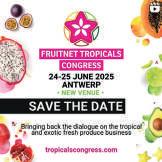
fruitnet.com/eurofruit eurofruit's news website provides regular updates on all the top stories from the European fresh fruit and vegetable business. News


https://desktop.eurofruitmagazine.com
Download the new Eurofruit app onto your smartphone or tablet from the App Store or Google Play. Stay informed of the latest fresh produce industry developments, and enjoy our magazines in new user-friendly digital formats.
linkedin.com/showcase/eurofruitmagazine
Expand your network of professional contacts and join the fresh produce conversation by visiting the eurofruit LinkedIn account. LinkedIn

x.com/eurofruit Keep up to date with news, opinions and developments from around the European fresh produce trade by following our dedicated X account.
fruitnet.com/freenewsletter
Fruitnet Daily News is the fresh produce industry's leading source of news, information and insight. Available free to all, it is essential reading for those who need to keep track of developments and trends in the international fruit and vegetable business.
https://anchor.fm/fruitbox
Listen to Fruitnet's podcast series hosted by managing director Chris White in London. The Fruitbox podcast features conversations and interviews with leading industry experts. Fruitbox

SINCE 1973
managing director, fruitnet europe
Mike Knowles
+44 20 7501 3702 michael@fruitnet.com
managing editor
Maura Maxwell
+44 20 7501 3706 maura@fruitnet.com
deputy editor Carl Collen
+44 20 7501 3703 carl@fruitnet.com
features editor
Tom Joyce
+44 20 7501 3704 tom@fruitnet.com
staff writer
Fred Searle
+44 20 7501 0301 fred@fruitnet.com
DESIGN & PRODUCTION
design manager
Simon Spreckley
+44 20 7501 3713 simon@fruitnet.com
senior designer
Qiong Wu
+61 3 9040 1603 wobo@fruitnet.com
senior graphic designer
Mai Luong
+44 20 7501 3713 mai@fruitnet.com
graphic designer
Asma Kapoor
+44 20 7501 3713 asma@fruitnet.com
EVENTS & MARKETING
head of events and marketing
Laura Martín Nuñez
+44 20 7501 3720 laura@fruitnet.com
events executive
Poppy Bowe
+44 20 7501 3719 poppy@fruitnet.com
MANAGEMENT
commercial director
Ulrike Niggemann
+49 211 99 10 425 ulrike@fruitnet.com
managing director
Chris White
+44 20 7501 3710 chris@fruitnet.com
sales director
Artur Wiselka
+44 20 7501 0309 artur@fruitnet.com
senior sales manager
Giorgio Mancino +44 20 7501 3716 giorgio@fruitnet.com
us & canada
Jeff Long +1 805 448 8027 jeff@fruitnet.com
italy
Giordano Giardi +39 059 786 3839 giordano@fruitnet.com
germany, austria, switzerland, middle east
Heike Hagenguth +20 100 544 5066 heike@fruitnet.com
morocco, france, tunisia Cristina Delof +34 93 000 57 54 cristina@fruitnet.com
south africa Fred Meintjes +27 28 754 1418 fredmeintjes@fruitnet.com
asia pacific Kate Riches +61 3 9040 1601 kate@fruitnet.com
finance director
Elvan Gul +44 20 7501 3711 elvan@fruitnet.com
accounts receivable
Tracey Haines +44 20 7501 3717 tracey@fruitnet.com
finance manager
Günal Yildiz +44 20 7501 3714 gunal@fruitnet.com
subscriptions +44 20 7501 0311 subscriptions@fruitnet.com

Franka Rodriguez aldi south group
Two years on from the launch of Aldi South Group’s responsible sourcing strategy, Franka updates Eurofruit on how the project is advancing.
fruit logistica–p26-29

Edwin Reyes promar
Edwin assesses how markets are changing through diversification and offers examples of exporters who have moved away from traditional markets.
latin america–p50-51

Andriy Yarmak eastfruit
Andriy looks at the recent stagnation of global fresh produce trade, and highlights the reasons for this, including climate change and deglobalisation.
fruit logistica–p36

Eugene Gerden
freelance journalist
As part of his report on the state of play in Russia, Eugene suggests that the country could ease restrictions on imported fruit and vegetables. russia–p150-153
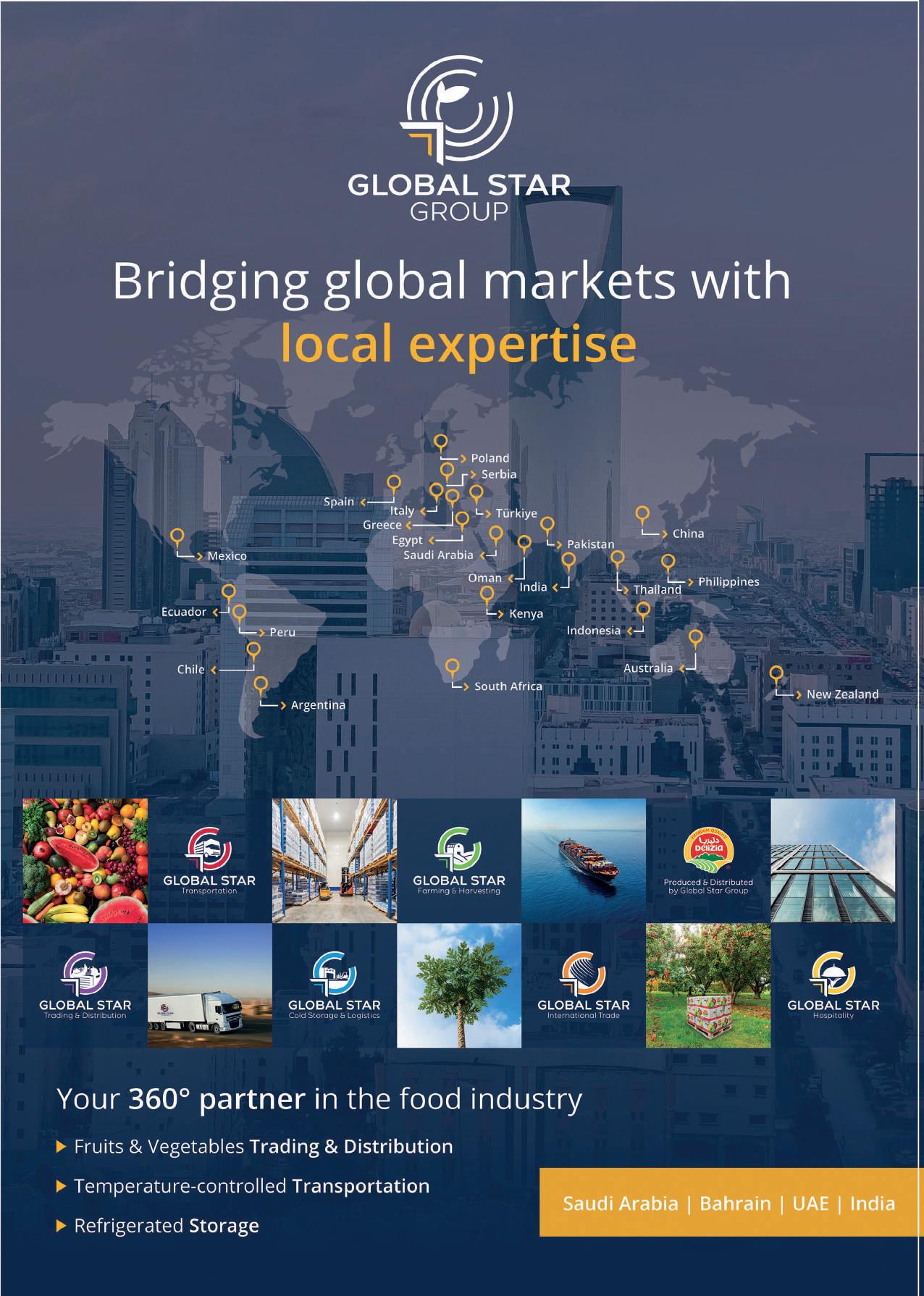

As parent company BayWa attempts to repay billions of euros in debt, it seems likely that parts of its fresh fruit and vegetable division will be sold.
by Mike Knowles

Munich-based multinational BayWa appears likely to sell New Zealand fresh produce company T&G Global next year, as it attempts to reduce its debt following a decline in revenue. The company, which also owns BayWa Obst in Germany and a majority stake in Dutch tropicals distributor TFC Holland, says it has a plan to sell parts of its business and turn around its performance, but investors and shareholders remain concerned.
The group has seen its revenues slip in the past couple of years as sales in building materials, renewable energies, and agriculture have fallen. In November, the group posted a consolidated net loss of €640.8mn for the first nine months of the year, on sales of €16.02bn – down from €18.19bn in JanuarySeptember 2023.
To avoid running out of cash and defaulting on its loans, late last year BayWa presented a restructuring plan that includes selling some of its companies outside Germany. Soon after, Reuters reported that T&G would be sold, although neither BayWa nor T&G itself was in a position to confirm or deny the suggestion. Citing an internal company presentation apparently shown to employees, Reuters indicated that the sale was not expected to occur before 2026, but had featured in an overall proposed restructuring plan that would see BayWa sell off several of its foreign assets in order to address its ongoing debt crisis.
Under the guidance of its chief restructuring officer Michael Baur, BayWa is understood to have targeted a reduction of its debt from around €5bn to €1bn during the coming years. Another Reuters report stated that the company intended to cut around 1,300 of almost 8,000 full-time staff, and close 26 of its 400 locations, by the end of 2027. And at least one other media outlet hinted that senior financial directors on the company’s board will soon depart.
By early December, BayWa’s share price dropped to below €10 per share, its lowest valuation in more than two decades. Just a couple of years ago, it was almost five times that value.
T&G itself declined to say much in response. “This is a process being led by BayWa and relates to its business and shareholdings,” it stated. “It is therefore not appropriate for T&G to comment on their position. We continue to work closely with BayWa and our board to maximise value for all shareholders.”
It wouldn’t be the first time in the BayWa era that T&G has had to roll with the punches. 2023 was an extremely difficult year for T&G, after Cyclone Gabrielle ripped through Hawke’s Bay in the February. But as New Zealand’s largest apple exporter Scales Corp indicated recently, trading conditions have since improved. A recovery in traded volume and profit looks assured. And there would likely be several potential suitors interested in securing a prime slice of New Zealand’s apple industry, not to mention a wellequipped tropicals business in TFC Holland, and other subsidiaries.
BayWa’s ex-CEO Klaus Josef Lutz was once boss of Germany’s Süddeutsche Zeitung. That same newspaper explained how the restructuring would “largely reverse the credit-financed expansion that Lutz orchestrated over the past decade” into renewable energies, commodities trading, construction materials, and of course agriculture. The company he built to such great heights is falling back to earth with a bump. E


Donald Trump’s plan for a 25 per cent duty on all US imports from Mexico and Canada, announced after November’s election victory, would be hard to digest for members of North America’s produce trade, who say it could damage supply chains and push consumer prices higher. As John Anderson of Oppy warned, the business is in for “a bumpy ride”. In a comment piece for Fruitnet, grape importer John Pandol observed that fruit and veg are “cannon fodder in trade wars”.
That tariff plan means South Africa’s entire fruit export programme to the US – including grapes, citrus, stonefruit – could be at risk. In the meantime, despite those concerns, grape suppliers in South Africa say they are pleased with their progress in North America, where Canada has emerged as their third-largest export market worldwide and the US could also take more fruit.
The floods that hit the Spanish region of Valencia in late October are expected to cost growers and exporters hundreds of millions of euros. Exporter Agro Max reported a rise in European demand for Egyptian iceberg lettuce after production in Murcia was lost. And as UK-based wholesaler Nationwide Produce observed, there is great concern about future availability of certain key items like persimmons and mandarins. However, citrus production is forecast to rise this season. Most of the damage was to agricultural infrastructure, facilities and equipment, and access to land was compromised in several locations.
The World Citrus Organisation has predicted a fall in production and exports. In its annual Northern Hemisphere citrus forecast for 2024/25, it estimated production would reach 27.3mn tonnes, 8.73 per cent lower than the previous season. Exports are expected to be 8.94 per cent down at 8.38mn tonnes. The forecast is based on data from Egypt, Greece, Israel, Italy, Morocco, Spain, Tunisia, Turkey, the US and, for the first time, Portugal. Full story—p56
Argentina has secured access for its citrus exports to Ecuador. But that won’t be enough to reverse a decline in the country’s citrus export sales, which continue to fall sharply, according to new figures shared by Federcitrus.
By the beginning of March 2025, it is expected that Egypt will have double the number of orange juice factories it had in 2024, according to one of the country’s leading fresh produce marketers, Omar Elnaggar. Full story—p108-110
The National Apple and Pear Association says France’s apple crop will be 3 per cent lower than its earlier forecast at 1.42mn tonnes – 5 per cent less than in 2023, but still in line with the three-year average. By contrast, the country’s pear forecast has been revised up by 12.6 per cent to 134,000 tonnes.

Vietnam’s fruit and vegetable exports are set to be worth more than US$7bn this year, according to a new report, as exporters benefit from better access to China, as well new opportunities in Thailand and the US. The country’s import trade is also expanding: in late November, for example, Peru was granted approval to send mandarins to the country.
Fruitnet ’s new event Fresh Produce Vietnam takes place in Ho Chi Minh City on 13-14 May 2025. Visit fruitnet.com/freshproducevietnam for more information.
Zespri aims to sell 93,000 tonnes of kiwifruit grown outside of its home country New Zealand this season as demand continues to grow. And the group believes it can sell even more from the Northern Hemisphere in future. In early December, its member growers voted overwhelmingly in favour of a plan to expand production in France, Greece, Italy, Japan and South Korea. New Zealand’s fresh produce export sales are set to increase by 8 per cent to NZ$4.3bn this year, according to a new report.
OPPOSITE—Donald Trump’s tariff plan has the potential to disrupt North America’s entire fruit and vegetable trade
ABOVE—Satellite images illustrate the extent of flooding that occurred in Valencia last October »
Freshhuelva expects Spain’s berry production to expand by 4 per cent next year as raspberries recover and strawberry plantings increase. Meanwhile, as the first Mediterranean strawberries were due to come into the market, Spanish group El Pinar reported a 20 per cent increase in sales of its strawberry plants to countries including Spain, Poland and Romania.
Chile’s avocado exports are set to increase by almost 30 per cent this season to 116,000 tonnes, up 29.8 per cent. The increase is due to higher production volumes and favourable weather conditions, according to a report from the USDA’s Foreign Agricultural Service. Meanwhile,


growers in New Zealand say they expect stronger pricing on the international market, with production in Australia and Peru set to be lower; the Philippines has clinched access to Japan for its Hass; and Guatemala is about to start supplying the fruit to the US in time for the Super Bowl.
market access for Australia’s avocado exports. However, further trade negotiation and technical work is required before shipments are allowed into the country.
Chile will export around 56,000 tonnes of table grapes, equivalent to almost 7mn cartons, to the US under the Systems Approach this season. The figures, released by the Chilean Grape Committee, signify that around 35 per cent of all grapes sent to North America for 2024/25 will be exempt from fumigation and instead undergo inspection at origin.
Frutas de Chile president Iván Marambio has met with Indian ambassador Abhilasha Joshi and asked for her help to reduce import tariffs on products like apples and kiwifruit. In the meantime, Fedefruta has warned that Chile’s cherry crop may turn out to be smaller than expected.
In the meantime, China has welcomed its first avocado imports from Tanzania. Avocados and other exotics are the focus of our Fruitnet Tropicals Congress and we’ve just confirmed the event will head to Antwerp on 24-25 June. Visit fruitnet.com/ tropicalscongress for further details.
TOP—The El Pinar team have seen strong demand ABOVE—Avocados Australia at China’s largest import expo CIIE
Avocados Australia has signed a A$300mn purchase agreement with Shanghai Huizhan International Trading in China, as well as several provisional agreements designed to improve »
Brazilian table grapes have been granted access to China, after the country’s Ministry of Agriculture and Livestock agreed on a new protocol with Chinese customs officials. The agreement was finalised during a bilateral meeting between the countries’ presidents Luiz Inácio Lula da Silva and Xi Jinping at a meeting in Brasília.





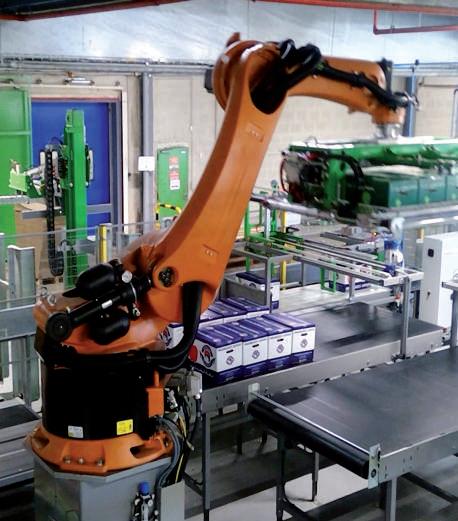

Meanwhile, Vanguard says it expects strong market demand for grapes out of southern Peru.
Production of licensed apple variety Bigbucks is booming in South Africa. According to holding company Pink Vein, more than 1.9mn cartons were packed for local and export markets in 2024 – a 56.3 per cent increase on the previous campaign. Also in the country, TruCape says it expects its biggest crop of Cheeky pears, as well as the first commercial volumes of another pear called Cape Blush.
Mauritian exporter Bella Fruitiva has started exporting breadfruit to meet growing demand in Europe. Our colleague Tom Joyce spoke to managing director Vickram Meghu about the new venture – see Fruitnet.com for the full story.
In the UK, growers warn that next season’s salad crops are reportedly at risk from post-Brexit seed and plant border controls.
Edeka has opened a brand new distribution hub in central Hamburg. The €60mn facility, which features a 15,600m2 warehouse and 50 banana-ripening rooms, could double the volume of fruit and vegetables the German retailer distributes via the city’s port.
The Netherlands’ largest retailer Albert Heijn has unveiled a new set of certification standards. Called Positive Produce for People and Planet, the programme was developed in collaboration with its fruit and vegetable suppliers.
Alistair Smith of Banana Link has called for an end to ‘overcertification’. In a comment piece for Fruitnet, he accused

certification provider Rainforest Alliance of making the compliance process overcomplicated and costly for banana growers. In response, the group’s chief programme officer Ria Stout told Fruitnet how its plan for a revised set of standards will reduce the burden on farmers.
Lidl’s UK business has seen strong category growth (+22 per cent) in fresh produce, making it the fastest-growing grocery retailer in fresh fruit, veg, and salads. The discounter has invested heavily in new and better stores, as well as the freshness of its produce. And fellow German trader Aldi is planning to test the British market by offering shoppers more loose fresh produce.
AMFresh, Spain’s largest fruit and vegetable supplier, says it is ready to spend €2bn to continue its recent expansion strategy through further acquisitions. By the end of the decade, it expects to achieve sales of €3.5bn, more than three times what they were in 2018.

Brazilian company Agricola Famosa is to acquire Spanish group Melones El Abuelo, based in Murcia. The deal creates Europe’s biggest supplier of melons and watermelons, with annual sales of around €230mn, and gives Agricola Famosa a new foothold in the market.
Peruvian exporter Camposol has revealed it achieved its highest-ever monthly earnings in September 2024, at US$30.7mn.
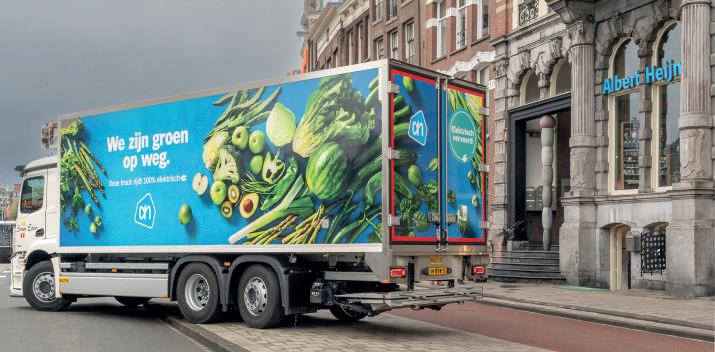

Devos and Wouters, two of Belgium’s apple and pear suppliers, plan to form one of Europe’s largest fruit companies when they combine their trading divisions in August 2025.
Strong apple sales helped BayWa Global Produce during the third quarter of its financial year, but not enough to prevent a loss for parent company BayWa Group. See p8-9 for the full story.
Prevar heralded the launch of GoodnessMe, a scab-resistant apple bred by Plant & Food Research in New Zealand and produced
in Europe by Wouters Fruit. The variety is said to be the first commercial apple to offer double gene scab resistance.
Zespri says it is working closely with the NZ authorities to weed out unscrupulous employment practices, after a labour provider in the Bay of Plenty was found to have underpaid three employees over several years.
OPPOSITE TOP—Guilherme Coelho of Abrafrutas (left) shakes hands with China’s president Xi Jinping alongside Luiz Inácio Lula da Silva (centre)
OPPOSITE BELOW—Edeka’s Markus Mosa (left) and Hamburg mayor Peter Tschentscher (right) cut the ribbon LEFT—Albert Heijn on its ‘way to green’ BELOW LEFT—Pieter Devos (left) with Wim Wouters
Organic marketer Brio (part of Gruppo Alegra) has extended the Italian avocado season with the addition of new supply out of Catania. As a result, it says, by 2025/26 the domestic season could last from October to late March.
Freshfel Europe has launched its second public consultation on environmental footprint calculations. The Technical Secretariat of what is known as FreshProducePEFCR will develop technical rules to calculate the environmental footprint of fruits and vegetables.
Bloom Fresh has won a legal victory against a grower in Italy. A court in Bari ordered the producer to remove all illegal plantings of variety IFG Eleven, known as Sugar Crisp. The breeder has also appointed new licensees in China for its protected table grape varieties, including Cotton Candy, Sweet Sapphire, and Sweet Globe. It said it had been able to defend its intellectual property rights in the country, with several infringements penalised with fines and forced removal of vines.
Growth in sales of kiwifruit, pineapples, grapes and exotics contributed to an “excellent” result for Italianowned importer-distributor Orsero Group in the first three quarters of 2024, despite a dip in its profits. Net revenues for the nine months were €1.16bn, just shy of the result recorded in the equivalent period of 2023 and buoyed by a slight increase in its produce distribution business. »
Swedish importer Ewerman, a subsidiary of Helsingborgbased company Greenfood, has signed a deal to supply fruit and vegetables to Norwegian fresh produce distributor Engrosfrukt It’s an important breakthrough for Greenfood and – despite


a large footprint in the Nordic region – its first real foray into this neighbouring market. Earlier, the group revealed that strong sales in its Picadeli salad bar business had enabled it to maintain healthy growth in the third quarter of 2024, to just over SKr1.4bn (€122.1mn).
Western Cape fruit farms that were previously part of Capespan. Elgin Valley-based Dennegeur Farm confirmed the purchase of Applethwaite Farm from Capespan’s majority owner Zeder Investments. And Zeder is understood to have sold its Theewaterskloof apple and pear farm to grower-exporter Betko
As the first major volumes of Namibian table grapes left for Europe, Capespan said it welcomed the creation of a new 20-year venture with its partner Namibian Grape Company. Meanwhile, its partner growers in the north of South Africa anticipate a marginal increase in production.
Agrovision has made its first move into cherry production with the acquisition of Chilean growerexporter ZurGroup. The deal includes state-of-the-art packing and processing facilities, as well as production areas that include 250ha planted with premium blueberries. Chile’s blueberry season has got off to a slower-than-expected start, but increased production of new varieties is said to have boosted quality.
Macquarie Asset Management has spent almost €108mn to become the majority owner of Fresh Produce Group, one of Australia’s largest fruit and vegetable suppliers. Chief executives Robert Nugan and Anthony Poiner, who founded FPG, retain the remaining shareholding and will continue to lead the business alongside the new investors.
Two South African fruit growing and marketing companies have extended their footprint in the South African apple and pear business with the acquisition of »






































































Leading vertically integrated citrus grower/shipper in North America, with complete control of our fruit, from seed to store
Highest industry standards for quality
Best-in-class brands that consumers know and love
Deeply invested in innovation, sustainability, and our communities
Complete customer-centric services and expertise: Transportation, sales, marketing, merchandising, agronomy and more


















Mountain Blue Orchards won a landmark legal case against the illegal use of its protected blueberry varieties in China. A court in Yunnan ruled in favour of the Australian company and against an unlicensed nursery that propagated the Eureka Sunrise variety.
Also in Australia, ahead of BerryQuest in late February, Piñata Farms is calling on the country’s berry industry to commit to higher-quality fruit, improved cold chains, and better retail ranges.
Scotland’s leading berry supplier Angus Soft Fruits has celebrated three decades in business. It plans to roll out new raspberries, strawberries and blackberries soon. Full story—p82-83
Kiwifruit label Zespri is the number one fresh produce brand in all of its core markets, according to a new report published by Kantar. An impressive achievement when you consider how much bigger the likes of Chiquita, Del Monte and Dole are in value and volume terms. But the fact remains, the NZ-owned brand still has plenty of room to grow in several markets.
Dole Ireland has rolled out homegrown, Grá-branded Honeycrunch
LEFT—Kantar ranked Zespri as the number one fruit brand in 15 markets
BELOW—Dole Ireland’s Honeycrunch line is sold under local market brand Grá
apples, which it hopes consumers will love not only for their taste but also their local provenance.
Fruitmasters and Limgroup have unveiled Sonrosa, a new brand for their seed-bred “hybrid strawberry of the future”. Instead of two years, a Sonrosa plant can apparently grow from seed in just 16 weeks, say the Dutch companies.
Kiku Variety Management has rebranded as Adema after 25 years in the business of developing and managing high-quality apple varieties. Chief executive Jürgen Braun said the South Tyrol-based company would continue to focus on club apples – including globally recognised premium variety Kiku and the snack brand Isaaq – as well as other trademarked commodities like Golden Parsi da Rosa, Alnova, and King Fujis. Full story—p94-96
Suppliers in the Netherlands and Belgium have secured EU support for a new, three-year marketing campaign to promote fresh berries The project, which will target young adults in the Netherlands, Belgium and Germany, is one of several new agri-food promotions to benefit from European funding.
Apple category doyenne Pink Lady has announced a new partnership with Disney to promote healthy eating in Germany, France, Spain, Italy, Ireland, Belgium, the Netherlands and Sweden. And British online retailer Ocado has agreed to sell Disney-branded apples and mandarins supplied by Orchard World


New research conducted at a Rewe store in Germany suggests marketing individual bananas as ‘sad singles’ could boost sales.
A European court has ruled that the blue-and-yellow oval beneath Chiquita’s famous banana label does not qualify for protection as an EU trademark.
Dutch importer Eosta has introduced organic, raingrown avocados from Kenya and Tanzania. The company says the fruit is grown without any need for irrigation, helping to conserve water resources and meet the needs of eco-conscious consumers.
The Fairtrade movement has secured a new partnership with the International Cooperative Alliance as it looks to encourage greater inclusion and sustainability.

Australian Grapes has begun a five-year project to promote exports. The Australian Table Grape Association will lead the programme, which has the backing of Hort Innovation and is funded by growers. Separately, Berries Australia has signed a new deal in China to promote the sale of exported blueberries.
French association Interfel kicked off its new apple marketing campaign in India with a special event in Mumbai.
At CIIE in Shanghai, Dole launched nine new products, including Smurf-branded Belgian Conference pears and Kung Fu Panda fruit gift boxes.
Fruit exporters in South Africa say they welcome state-owned Transnet’s efforts to improve operations at the Port of Cape Town. But stonefruit exporters are wary of further problems after they faced huge disruption at the port last season. Meanwhile, wrangling over new investment at Durban Container Terminal looks set to prolong the frustration for citrus suppliers.

ABOVE—Pink Lady’s new Disneybranded apple packs BELOW—Eosta’s line of rain-grown avocados from Kenya and Tanzania
Capespan says it could use Namibia’s Walvis Bay port to export more fruit from southern Africa after some encouraging results for its grapes. As Fred Meintjes reports on p116 of this edition, problems in Cape Town have also sparked renewed interest in conventional reefer services among exporters.
Shipping line MSC has launched a new grape service from Southern Africa to Europe. The Eastern Cape Express links Namibia and South Africa with Benelux and UK ports, and was due to commence in the first week of 2025.
Orsero Group wants to increase its turnover in Spain and Portugal by €100m within the next five years with the opening of a new coldstorage and packing centre in Seville, due for completion in 2029. From there, it plans to continue the impressive sales growth that Spanish subsidiary Hermanos Fernández López and Portuguese company Eurofrutas have seen over the past decade for high-value items like avocados, mangoes and kiwifruit.
»





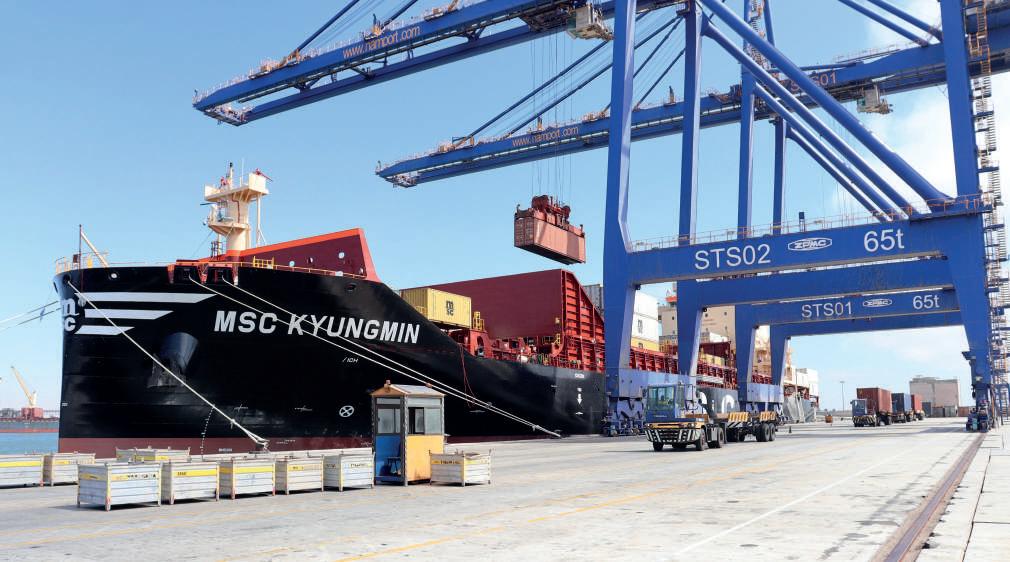

In Turkey, airfreight services have come to the aid of fig suppliers hampered by issues in the Red Sea.
DP World launched the world’s first all-electric berth at its London Gateway terminal in the UK. It has also been revealed that the port has been chosen to handle all of Maersk Line and Hapag-Lloyd’s Gemini Asia-Europe services.
Blueberries were the first product to depart Peru’s newly completed Port of Chancay – which was officially inaugurated in November – bound for to Shanghai.
CMA CGM has added a new service to link Central America with Asia.
Chilean cherry suppliers believe a new deal signed late last year between Frutas de Chile and Eastern Air Logistics can boost sales to China.
ABOVE—The MSX Kungmin ready for loading in Walvis Bay, Namibia LEFT—Carton Pack’s Gianni Leone (left) with Shane D’Souza of Clifton Packaging
Sinclair’s new compostable label, unveiled in partnership with Zespri at Fruit Attraction in Madrid, has attracted a lot of interest. However, the company says it needs help to educate people about the sticker’s environmental benefits. Full story—p128-130
In Singapore, Zespri’s pillbox packs have returned to retail shelves as the company looks to reverse a fall in post-dinner fruit consumption.
Italian packaging giant Carton Pack has acquired the UK’s Clifton Packaging
Avocado supplier Westfalia has revealed it plans to sell more of its laser-etched mangoes in Europe.
A report in Australia suggests mechanised pollination of tomatoes could reduce labour requirements by 80 per cent. And a partnership between Annogen and KeyGene in the Netherlands looks set to offer faster, more targeted breeding of specific traits in produce, starting with tomatoes.
The Port of Wilmington in the US has introduced new technology that scans fresh produce shipments and detects any issues instantly. In an age where speed is of the essence, the so-called ‘microscope’ promises to reduce waiting times at the port significantly. Meanwhile, further south at SeaPort Manatee in Florida, the damage caused by October’s Hurricane Milton has been estimated at around US$200mn. »
Fruitnet’s category-leading event Fruitnet Tomato Congress is back on 11-12 November 2025 at a new

UNITEC manufactures automated, efficient and delicate solutions, customized to satisfy every Customer’s specific needs, for each stage of their fruits handling. Thanks to 100 years of experience in handling and sorting more than 50 types of fruit and vegetables, together with the constant innovation provided by its R&D Department and its Robotics Division, the UNITEC Group, with its network of branches active worldwide, is a reliable partner you can count on, regardless of the size of your business.



FRUIT LOGISTICA
Berlin, Germany
February
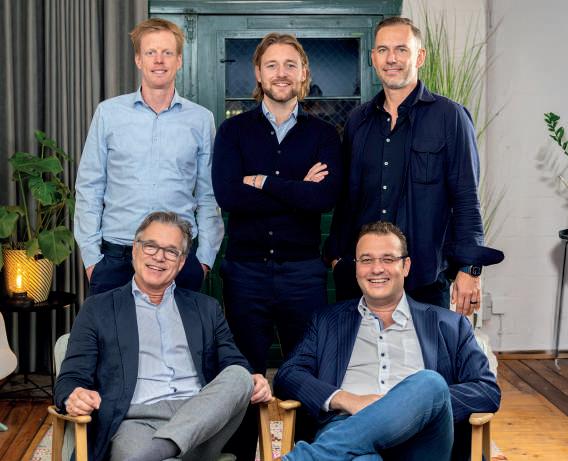
location in Malaga, close to one of Spain’s primary tomato production areas. Among the key topics will be attempts to breed and produce tomatoes more quickly, as well as improvements in security of supply.
Italian apple company VIP Val Venosta has revealed it now uses AI technology to help identify the right time to harvest its apples.
Norway’s Saga Robotics is to expand its work to control mildew on berry farms, Source.ag has enlisted the help of Wireless Value to get more digital sensors into controlled production environments, Bayer and Netafim say they plan to work more closely on digital solutions for growers, and a new study at the University of Leicester suggests satellite images could help farmers combat climate threats.
Jennie Coleman of Equifruit, Canada’s leading Fairtrade-certified importer, has been named one of the country’s Most Admired CEOs. Coleman has received several such awards in recent years – prompting her colleagues to dedicate an entire section of their website to her prowess – and is credited with
promoting a “fresh, humorous approach in a crowded grocery landscape”. In November, she also received RBC Momentum Award and the Ontario Produce Marketing Association’s Women’s Produce Network Award.
In Germany, Port International has officially confirmed that Karlsson Port and Mathias Marten have been appointed as managing directors.
Former Calavo Growers and Mission Produce senior director
Tommy Padilla has joined Fresh Del Monte as head of its international avocado business. Meanwhile, Calavo has welcomed back James Snyder to a new role as chief financial officer.
Bloom Fresh has appointed ex-retailer Paul Farmer as its innovation and quality director. And Hazera Seeds has named former Netafim vice-president Ofer Peleg as its new chief executive offficer. Interview—p74-75

Agrovision has handed Scott Domann the newly created role of chief people officer.
T&G Global has appointed Shane Kingston as chief operating officer of its apple business, less than 12 months after he joined the group as director of international sales and marketing. And Apple and Pear Australia Limited has named Matthew Lenne as its new pear director.
Jeff Kammermeyer has joined Apeel as vice-president of commercial operations.
And Seafrigo’s incoming boss Bruno Plantaz has described the company as “a sparkling diamond” that now “needs to be polished”. E
For all the latest and most important news stories from the world of fresh produce, visit Fruitnet.com. And sign up for our Fruitnet Daily News email for regular updates.































































Are you ready to be immersed in
Discover the future of strawberries at the International Strawberry Congress 2025. Join leading experts, fellow growers and innovative companies from around the world for inspiring sessions on cutting-edge technologies and experience networking opportunities you won’t want to miss. Don’t miss the chance to be part of it and register now!






















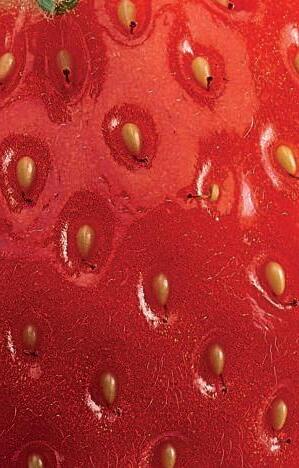





Two years on from the launch of Aldi South Group’s responsible sourcing strategy, Eurofruit visited Franka Rodriguez, director of global sourcing, at the group’s headquarters in Salzburg to find out how the project is advancing and what the retailer has learnt along the way.
by Maura Maxwell
First bananas, then pineapples…now avocados are the latest product in the fresh produce department to be added to Aldi’s new ethical sourcing model. For such a global product that is grown all over the world, this must present your biggest challenge yet, doesn’t it?
Franka Rodriguez: You are right! Avocados represent a new step in our journey toward responsible fresh produce sourcing. The dynamics in avocado production are different from bananas and pineapples where we can source fruit from the same growers 52 weeks a year. We therefore needed to develop a strategy that accounts for the various avocado sources globally while maintaining a streamlined and equitable sourcing model.

However, the core principles of our more sustainable way of sourcing remain consistent across all categories. These include transparency and openness in our operations, constant communication, as well as fostering good partnerships with key growers, direct suppliers and other relevant stakeholders in the supply chain.
Additionally, all parties involved share a strong commitment to collaboratively finding solutions that are both sustainable and competitive. These key characteristics now apply to our sourcing models for bananas, pineapples and avocados and have been recognised as an industry best practice since we first introduced a more sustainable purchasing process for bananas in 2022.
How has your approach differed to how you tackled bananas and pineapples?
FR: An independent cost of production review, as Fairtrade
ABOVE—Franka Rodriguez says the retailer has had to take into account the different dynamics of avocado production to bananas and pineapples when developing its new strategy
provides for bananas, does not exist in pineapples and avocados and can therefore not be used as an impartial reference. To address this, we proactively involved our partners into the creation of our pineapple cost model, and we have deepened this collaboration even further for avocados, considering the diverse range of production countries worldwide that need to be considered. Given the complex mix of avocado sourcing countries we used this higher level of producer engagement to better promote sustainability and supply chain transparency.
We have optimised our contract periods to better align with the natural production cycles of the crops whilst still allowing for more frequent cost price reviews in order to consider fluctuations in

production or demand as needed. In our conversations with producers, we focus on raw material costs and their development, while logistics and ripening costs are addressed separately with our service providers.
Now that your sourcing model has been in place for a couple of years with bananas, has it been easier to convince stakeholders in the pineapple and avocado sectors of its merits?
FR: Yes, we can definitely say that partners across the wider produce business became aware of our new approach for bananas and recognised the benefits these new ways of working could have for them too. We have been able to build trust with our partners in bananas, which we aimed to replicate with our pineapple and
»



avocado suppliers. Ultimately, once suppliers, growers and Aldi decide to mutually trust each other and work more closely together, it is no longer a question of whether a new sourcing model is implemented but rather how we can make it happen.
The sustainability concerns over avocado production frequently make the headlines, particularly when it comes to water usage and deforestation, not to mention the involvement of the drug cartels in countries like Mexico. How have you taken this into account when developing your sourcing strategy?
FR: We have set up joint business plans with all our relevant partners

in which we define our focus areas and to-dos for the upcoming years. Sustainability clearly plays a very important role in these plans, such as requirements for our suppliers to monitor, end to end, the supply chain on our behalf and ensure growers fulfil sustainability requirements.
In addition, we also regularly conduct our own assessments focused on social and environmental topics in our key sourcing countries to ensure our international requirements are upheld. With this comprehensive monitoring approach, we aim to ensure that the products we sell are produced in a responsible manner and that the workers in our supply chains as well as the environment are well taken care of.
From an environmental perspective, we have defined targets related to monitoring and reducing the water consumption in our avocado supply chains and require growers to put responsible water
“By committing to long-term partnerships, we are also in a better position to utilise growers’ full crop”
management standards in place. Also, we require our partners to work on climate change mitigation measures and reduce CO2 emissions based on science-based targets.
Avocados are coming under increasing price pressure as global volumes have surged. To what extent can your strategy help mitigate for this erosion in profitability?
FR: Our objective is to build strong long-term partnerships with strategically relevant growers and suppliers. This approach will
naturally reduce our dependency on the short-term developments on the open market.
We are committed to cover the cost of a sustainable production with the models we use, which helps growers to invest and plan for the long term. Whilst we still need to be competitive in the market, we can now discuss profitability openly and guarantee our partners a stable profit within the framework of our cost model.
By committing to long-term partnerships, we are also in a better position to utilise growers’ full crop. Our presence across different markets naturally gives us the opportunity to sell a wide range of avocado calibres matching different consumer preferences. We want to increase our flexibility to accept different calibres wherever possible depending on production conditions as full crop utilisation is a clear and effective way to support growers and give them security to plan ahead.
What does Aldi’s avocado sourcing map look like today?
FR: In order to sell avocados year-round across all our markets we clearly need to work with a number of different growers and countries of origin on a global scale.
During the summer, we predominantly source from Peru, South Africa and Kenya, while origins such as Chile, Colombia and Spain are key for the winter period. Production volumes have been growing in countries like Guatemala and Tanzania, which allows us to broaden our portfolio and support the growth of the category.
To ensure stable quality year-round, it is crucial to proactively manage the transitional periods between these two main seasons in spring and autumn with our partners while allowing smaller as well as emerging countries of origin as contingencies, testing their potential for further development.
Looking at the wider industry, do you feel encouraged that your efforts to connect buying and corporate responsibility in order to build more sustainable purchasing practices are being adopted by other retailers?
FR: We are pleased to be the pioneer, the market leading retailer when it comes to sustainable purchasing models and practices. However, we also understand that the positive impact on growers and supply chains around the globe will be the highest if the entire industry changes its ways of working.
We consider it our objective and responsibility to drive this change actively and highly encourage other retailers to join us in ensuring longevity and sustainability in fresh produce supply chains. E
Gianpaolo Renino, senior vice president of Fresh Del Monte Europe and Africa, outlines the key products and strategies that will support the company’s year ahead.
by Carl Collen

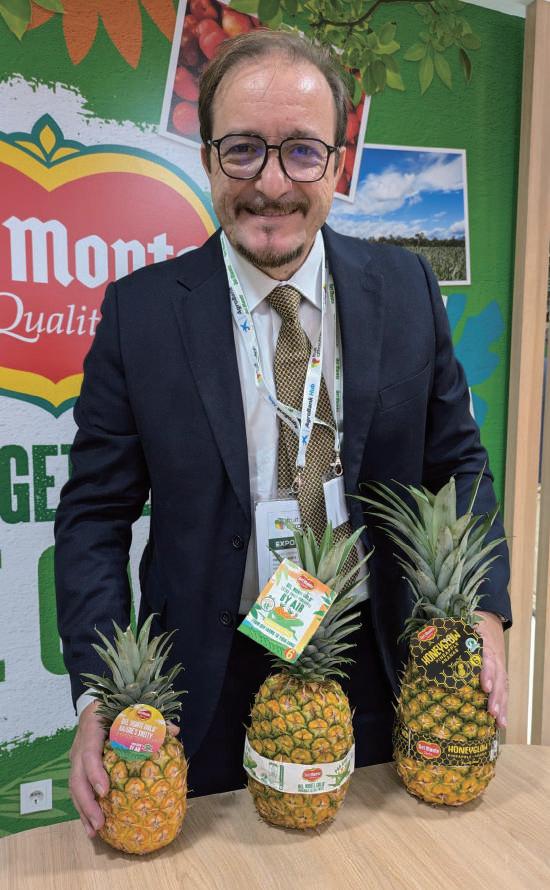
What are Fresh Del Monte Produce’s aims for the European market as we head into 2025?
Gianpaolo Renino: In 2025, Fresh Del Monte's strategy in Europe will revolve around three key pillars: partnership, proximity, and pedagogy.
Partnership is at the core of our relationships with customers, as we prioritise building longlasting, mutually beneficial collaborations to navigate the cyclical challenges of our industry together. Proximity will take on heightened importance as European consumers increasingly face economic pressures and limited time for shopping while seeking continued access to fresh, healthy, and delicious produce. Finally, pedagogy remains a crucial component of our engagement with customers, addressing gaps in understanding about fresh produce category economics and highlighting Fresh Del Monte's unique value proposition.
We also recognise the importance of deepening connections with end consumers. Research consistently shows consumer enthusiasm for learning more about us, extending beyond our reputation for high-quality fruits. Each time we share compelling stories about our sustainability efforts and community outreach, consumers express a strong sense of commitment and actively seek further information












BERLIN 5|6|7 February
FRUIT LOGISTICA 2025 HALL 23 | STAND F-01


• Open forum in the exhibition halls
• Free of charge to all visitors and exhibitors
• Simultaneous translation DE, EN, ES, FR, IT






Visit FRUIT LOGISTICA, learn about the latest trends and be inspired by high-ranking speakers.




MESSE BERLIN GmbH Tel +49-(0)30-3038-0 fruitlogistica@messe-berlin.com
FRUCHTHANDEL MAGAZIN
Tel. +49-(0)211-9 91 04-40 anzeigen@fruchthandel.de

through various touchpoints, including our social media, website, and point-of-sale interactions.
Which products stand out for Del Monte in Europe?
GR: Our primary fresh produce lines in Europe are pineapples and bananas, each serving distinct roles in meeting the needs of both our partners and consumers. While the pineapple is often hailed as the ’king of fruits’, its unique combination of health benefits, versatility, and value remains underappreciated by many.
We are leading the way in further segmenting this category to create even more appealing options. For example, the highsweet, high-colour Del Monte Honeyglow pineapple has become the fastest-growing item in the entire category in Europe. We also offer a range of pineapple experiences, from the classic Original Del Monte pineapple to the exclusive Del Monte by air. Additionally, we recently entered the ultra-premium fruit market in Europe with the launch of the Rubyglow pineapple, a stunning, red-shelled variety available in very limited quantities.
The banana category, on the other hand, boasts high household
penetration and purchase frequency across European households. In 2025, our focus will be on partnering with customers to maintain strong availability of Del Monte bananas while ensuring flexibility across the value chain.
Are there any other products that are making waves in Europe?
GR: We have also seen fast growth in the rest of our produce portfolio, for example the Del Monte Kiwi range that is in high demand yearround from our own Southern Hemisphere production, as well as our European season supply out of Greece, Spain and Italy. This winter, we will offer the exclusive Del Monte Red Passion variety that is surprising customers and consumers with its stunning red flesh and sweet exotic taste notes. Finally, we continue expanding our footprint into the fresh prepared fruits category that is gaining popularity for younger generation consumers in search of convenience and freshness with limited time. Our English facility in Wisbech has been increasing its capacity to follow the rising demand for high quality fresh cut fruits in the UK, and we have begun promising new market operations in the south of Europe.
How is the development of technology aiding Del Monte’s operations?
GR: Technology and innovation are integral to Fresh Del Monte's growth, enabling smarter decisionmaking and enhancing agility and sustainability across our operations.
Through the adoption of smart farming techniques, we optimise agricultural production while minimising environmental impact. For instance, we create digital yield maps for each field to better understand the interactions between soil, pests, diseases, and agricultural practices.
In 2024, we inaugurated a biofertiliser plant near our operations in Kenya. This facility transforms pineapple residues from our cannery into several distinct types of biofertilisers, exemplifying our commitment to a circular economy by repurposing waste into valuable agricultural inputs.
Let’s talk marketing. What are your most eye-catching campaigns in Europe?
GR: The Del Monte brand is not only a recognised seal of quality for fresh and fresh-prepared fruit but also an iconic heritage brand with over 135 years of expertise in preserving fruit and vegetables for long shelf-life on grocery shelves. We build numerous marketing activities that leverage this unique synergy and consumer trust in the brand across different categories.
For example, last summer, our partnership with Disney Pixar’s Inside Out 2 movie – the most-viewed animated movie worldwide – featured over 50mn Del Monte product units and drove hundreds of thousands of consumers to scan them and interact online with the brand and the movie characters across ten different product categories.
Another example is the ‘Nans from Del Monte’ campaign that we are currently running in the UK that aims to celebrate British baking traditions and ensure this culinary heritage is shared over to the next generations through enjoyable and social connection moments. The campaign builds on our former ‘Man from Del Monte’ campaign, rooted in a legacy of quality and trust. E
TOP—Del Monte is offering its exclusive Red Passion kiwifruit variety to customers this winter

Costa Rica’s National Banana Corporation bids farewell to Jorge Sauma and welcomes new general manager Marcial Chaverri.
by Maura Maxwell
At the end of 2024, Jorge Sauma retired as general manager of Costa Rica’s National Banana Corporation (Corbana) after 30 years in the role. He hands over the reins to Marcial Chaverri, who was previously director of business strategy at trade promotion agency Procomer.
Under Sauma’s stewardship, Costa Rica became a pioneer in sustainable banana production, and today it is the only country in Latin America that has the Geographical Indication recognised by the European Union.
“Thirty years ago, we set up the Banana Environmental Commission (CAB), marking Costa Rica out as a pioneer in sustainable production of bananas. This voluntary code – a public/ private alliance between producers, workers and the government –committed to working in a more harmonious way with nature by setting targets on water and agrochemical usage, recycling and land conservation amongst other environmental concerns,” Sauma explains.
Today, the industry has reduced the use of agrochemicals, 100 per cent of the plastic used for production is recycled, water usage at packing plants has been cut by 80-90 per cent and almost 70 per cent of farms are carbon neutral. Workers are paid one of the highest salaries among the banana growing nations and Costa Rica is the only country that has a tax on bananas


that goes towards improving the communities in which they are grown.
Asked what he is most proud of achieving during his time at Corbana, he says “Besides the fantastic team of people that make up the organisation, I would say the thing I am most proud of is the support we have given the industry in helping it to achieve an annual export volume of 127mn boxes of bananas. Today, Costa Rica exports US$1.2bn of bananas a year and productivity has risen from 2,200 boxes/ha/year at the beginning of my tenure to an average of more than 3,000 boxes/ha/year today.”
Chaverri takes the helm of Corbana amidst a markedly different landscape for the industry. Today there is much more collaboration between different producing countries as they face
up to common challenges, not least the fight against the spread of Fusarium wilt TR4 and the ongoing battle to persuade supermarkets to pay a fair price for their fruit –especially given the increasingly onerous safety and sustainability requirements that are being imposed on growers.
Meanwhile, Sauma’s well-earned retirement provides a welcome opportunity to read more, dedicate more time to his family and pursue other projects, knowing that he has left Costa Rica’s banana industry in a better shape than he inherited.
“There is more to do, but we are heading in the right direction,” he tells Eurofruit E
ABOVE—Costa Rica’s productivity rose significantly during
Do you know why Costa Rican bananas are the favorite among consumers in international markets?

Because COSTA RICA produces this fruit in a responsible manner with the workers and sustainable manner with the environment.
THE ONLY COUNTRY where 100% OF THE FARMS are certified internationally.

The banana sector reckons with 14,500 HECTARES of forests and protected zones.
THE SALARIES paid in thebanana industry of Costa Rica are the HIGHEST OF LATIN AMERICA.
And 63% of the banana farms are CARBON NEUTRAL.
COSTA RICA IS THE ONLY COUNTRY with geographic indication (GI) ¨Bananas of Costa Rica¨ granted by the European Union.
“BANANAS OF COSTA RICA” Pura Vida
“BANANAS OF COSTA RICA” Pura Vida

ANDRIY YARMAK Analyst, EastFruit
In recent years, the global trade in fresh fruits and vegetables has stagnated. Despite an average annual trade value increase of 3.7 per cent, this growth only matches the inflation rate of the US dollar, indicating no real sector expansion. A major trend is the shift in market share, with high-income countries losing dominance, while low- and middle-income nations gain ground.
terns increasingly reducing fruit and vegetable production.
Additionally, a trend towards deglobalisation has created new barriers to trade. Countries have imposed export restrictions almost as frequently as import limitations, often driven by populist policies

Among the fastest-growing exporters are Thailand (14.3 per cent growth), Peru (11.9 per cent), Egypt (11.8 per cent), Vietnam (10.4 per cent) and Morocco (7 per cent). Conversely, China is losing market share rapidly – its exports are declining around 6 per cent per year. Growth for major exporters like the US, Spain, Italy and the Netherlands is slower than inflation.
Several factors are contributing to this stagnation. Climate change has significantly impacted crop yields, with extreme weather events and shifting weather pat-
that aim to keep domestic prices low, at the expense of farmers. This increases the risk to international trade, exacerbates food losses, and creates price volatility. Such fluctuations send misleading signals to investors, discouraging further investment in the sector.
Geopolitical instability, including wars and terrorism, has wors-
ened trade conditions, leading to sanctions, higher logistical costs and disruptions that cost billions of dollars in lost trade. Despite rising prices, farmers often receive lower payments, and this cools investor interest and worsens supply constraints. Water scarcity, particularly in key producing countries like Spain, Morocco and Chile, is another threat to agricultural productivity and has the potential to limit global supply.
However, some fresh produce sectors are growing despite these challenges. Berries, mandarins, onions, and potatoes are among the fastest growing categories. Durians, in particular, have seen remarkable export growth, with Thailand leading the charge. Avocados and frozen fruits and vegetables are also growing, although avocado exports have fallen below inflation rates for the first time in 15 years.
The global horticultural trade faces numerous challenges, including climate change, deglobalisation, geopolitical instability, and a lack of water. To overcome these hurdles, the industry must adopt modern, resource-efficient technologies like sub-surface drip irrigation, weather stations, and drones. While these solutions are proven, their limited adoption — due to lack of awareness — prevents the sector from fully addressing those challenges. E
ABOVE—Climate change has had a significant impact on crop yields


Growth in European demand for local grapes is good news for Italian supplier Giacovelli, but climate change continues to dictate the way the country’s growers must produce.
by Tom Joyce
Demand for grapes in Europe is increasing, according to Anna Giacovelli, business development manager at Italian fruit supplier Giacovelli Group. Its customers, she says, increasingly want to source high-quality grapes from the continent itself for longer periods of the year.
“Our clients are looking for European-grown grapes to remain on the shelves from June through to December or even January,” she explains. This shift is driving a need for longer growing seasons and more sophisticated agricultural practices, as well as a greater emphasis on sustainability and innovation.
Giacovelli Group’s focus is on seedless varieties, which now dominate the category in the European market. “We choose our varieties based on aspects like soil characteristics, microclimates and taste,” says Giacovelli.
Climate change is another factor that influences such decisions.
Higher temperatures and less predictable weather patterns make greater resilience essential. “Climate change is transforming the way we and our partners produce: choosing easy-to-grow and tasty varieties, producing them in different microclimates and geographical areas, installing new irrigation systems to save water, and covering our fields with the latest technologies,” she says. “Resistance to extreme conditions like drought is important in a variety, but resistance to disease is even more urgent, especially given the humidity in
some of the crucial harvesting months of the European season.”
Sustainability is one of the main pillars at Giacovelli, she notes. “We want it to be more than a buzzword or a marketing tool. As such we are concretely analysing all steps along our supply chain: production, packaging, technological innovation, welfare. Right now we are writing our first sustainability report.”
She also sees a need for greater collaboration across the Italian grape sector. “We need to work together to enhance the global reputation of Made In Italy grapes, as other sectors like wine, oil, or apples and pears have done. Collaboration will help build a stronger international presence for Italy’s premium grape varieties.”
Labour shortages and rising wages have encouraged the company to increase its investments in technology, including AI and sorting machines. But Giacovelli says human labour will remain crucial for delicate tasks, and she believes a unified approach on labour is required.
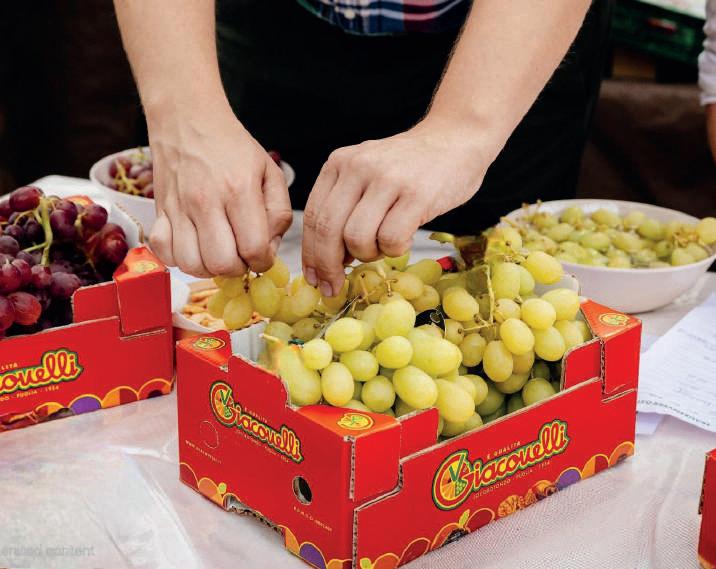
Giacovelli stresses the importance of packaging for freshness and shelf-life, but she also sees room for improvement. “Not all materials are ideal for grapes, and some overseas packaging is more robust than what we see in Europe,” she says. “There is an urgent need for more R&D investment in this area.”
“This is where our government can and should invest more time and resources, together with companies, on new contracts, recruitment and training,” she says. “Maybe it can even be done on a European level. It’s crucial we make the fresh fruit sector attractive and sustainable for the next generation.” E
ABOVE—Giacovelli’s focus is on seedless varieties, which dominate the European market

The table grape industry is experiencing a shift towards more flavourful, health-enhancing varieties, and Grape Evolution is at the forefront of this transformation, say managing director Dimi Spanos and Dr Avi Perl of Israel’s Agricultural Research Organization.
by Tom Joyce
The table grape business is currently driven by two key consumer trends, according to breeder Grape Evolution: flavour and health benefits. And for Agricultural Research Organization breeder Dr Avi Perl, consumers increasingly want grapes that deliver on both.
“Taste is paramount,” he explains. “We see demand for special flavours, like tropical hints, without the heavy ‘foxy’ notes, and a high sugar content. But beyond flavour, consumers are
also seeking the health benefits associated with grapes, such as polyphenols, anthocyanins, and resveratrol.”
Breeders have also been increasing their efforts to create varieties that are more resistant to fungal diseases and adaptable to climate change. “We’re seeing a greater emphasis on breeding grapes that offer not only flavour but also resilience,” adds Dimi Spanos, managing director of Grape Evolution, “which is crucial in today’s changing environment.”
BELOW—The company sees huge potential in China and India for premium grape varieties
Dr Perl highlights Asia, including China and India, eastern Europe, and especially Uzbekistan, as high in growth potential. The table grape business is shifting, and places that were once untapped are now ripe for expansion, he believes.
“We’re excited about the potential of these markets,” says Spanos. “As countries like China and India continue to develop, there’s a huge opportunity for premium grape varieties. The challenge is to provide varieties that meet both the quality expectations and the evolving tastes of these consumers.”
“Our goal is to create what I call the ‘flavour and health revolution’ in table grapes,” adds Perl. “We’re developing new varieties that combine high sugar, juiciness and enhanced health compounds, while also introducing novel gene pools from ancient Chinese cultivars, which have never been crossed with western grapes.”
Such an approach is already paying dividends, according to the company. White variety Grapple is a late-season cultivar with exceptional firmness, three times firmer than Autumn Crisp, making it feel like biting into an apple. What sets Grape Evolution apart from other breeders is its approach to licensing and marketing its varieties, says Spanos. Unlike many competitors, Grape Evolution does not impose marketing restrictions on growers.

“Our goal is to support growers by providing them with access to top-quality genetics at an affordable cost,” he says. “We believe in the sustainability of the grower, not in profiting from restricting their ability to market their fruit. That’s why we’ve adopted an open licensing model.”
Looking to the future, Grape Evolution is preparing for another major project in 2025. “We’re excited to offer South African and Namibian growers the opportunity to plant and cultivate our new early and late varieties,” says Spanos. “Just as our older varieties like Prime have contributed to the growth of the South African grape industry, we’re confident our new cultivars will bring unique opportunities to these regions.” E



Present challenges demand innovation, according to Rafi Karniel, CEO and chairman of Grapa Varieties, whose grapes aim for both excellent taste and high resilience to extreme weather.
by Tom Joyce
Rafi, what are the most important developments as we head into 2025?
Rafi Karniel: The grape industry faces climate volatility, geopolitical shifts and economic uncertainty.
At Grapa, we see these challenges as opportunities to innovate. Our Arra breeding programme focuses on developing resilient, resourceefficient grape varieties.
The disruptions caused by heatwaves in the Northern
Hemisphere, followed by delayed shipments from Peru this year, underscored the importance of early-season varieties. Grapa’s Arra selections, such as the earliest white, red, and black grape trio, have consistently outperformed in these scenarios. Early harvests from Namibia and South Africa, aided by airfreight, ensure retailers’ shelves remain stocked even during challenging times.
In regions where water shortages loom as a major threat, our early Arra varieties offer a unique advantage. Their shorter growing cycles use up to 50 per cent less water, and this is something which makes them ideal for regions where water conservation is critical.
What impact would you say the Arra breeding programme has had?
RK: It has revolutionised the industry. Just look at standout varieties like Arra Honey Pop, the earliest new-generation white grape. These varieties require less water, fewer pesticides and less labour, while maintaining excellent flavour and resilience to extreme weather, making them a favourite among growers, retailers and consumers alike.
Arra varieties are adaptable to diverse climates, allowing us to expand into markets like India and China. In India, where 80 per cent of vineyards grow Thompson Seedless, there is strong demand for more resilient alternatives, creating significant growth potential for our varieties.
Our varieties thrive in over 30 countries, including Brazil, India, and China. In Brazil, 80 per cent of grapes are consumed locally, while in India, it’s even higher. We’re building partnerships with leaders like Sahyadri Farms (India) and Joy Wing Mau (China) to enhance market reach and sustainability.
As you look ahead to the coming year, are you optimistic about the future of the grape category?
RK: The resilience of our genetics and the global expansion of our varieties position us for sustained growth. Grapa’s commitment ensures we remain a leader in the table grape industry, and guarantees a bright outlook for the category as a whole. The Arra varieties are designed to withstand extreme weather, optimise water use and reduce the environmental footprint of table grape production, helping growers thrive even amid uncertainty. E


Grower ordered by Bari court to remove all illegal plantings of the variety IFG Eleven, known as Sugar Crisp.
by Maura Maxwell
Bloom Fresh has achieved a significant legal victory regarding the illegal planting of its proprietary table grape varieties in Italy. As a result, a court in Bari has reportedly ordered a grower to remove all illegal vines at their own expense, even before the first-instance judgment.
Bloom Fresh said there is also a civil case awaiting a judgment for damages, as well as several ongoing criminal proceedings for non-compliance, with seals placed by the court-appointed custodian for the infringement of industrial property rights.
“The owners of the farm in question have long positioned themselves as a public adversary to breeders,” Bloom Fresh said in a statement. “They have been well known for using the media to encourage other Italian growers to ignore intellectual property laws and support widespread
violations, all while boasting about the significant profits they have generated from illegal plantings and by evading paying the same fees as legitimate growers.”
The court ruled that the grower must remove all illegal IFG Eleven (Sugar Crisp) plants that were planted without Bloom Fresh’s authorisation. The breeder said this marked an important step in restoring respect for intellectual property rights within the Italian agricultural industry.
“This is the second case that this particular grower has lost in the Italian courts against plant breeders, with their previous attempt to use antitrust laws to undermine the foundation of intellectual property rights and cast doubt on breeders’ capacity to enforce their rights, having been in vain,” the company said.
Bloom Fresh CEO Josep Estiarte commented: “With this decisive court ruling, and the financial
IFG Eleven, which is known as Sugar Crisp
penalties that have been imposed, a powerful message has been sent to those contemplating the illegal planting of Bloom Fresh varieties.
“Infringement of our intellectual property is a serious offence, and we will relentlessly pursue legal action against those who flout these regulations and ensure they face similar repercussions.”
With the plants already removed, and the process scheduled for completion in December 2024, the breeder said this represented one of the most
“The integrity of our brands and maintaining the trust and confidence that our growers place in us is paramount”
significant actions taken against unauthorised cultivation of fruit varieties in Italian history, and reinforced its dedication to safeguarding the interests of legitimate growers worldwide.
Estiarte continued: “The integrity of our brands and maintaining the trust and confidence that our legitimate growers place in us is paramount. Upholding our intellectual property rights is crucial not just for Bloom Fresh but for the entire agricultural community that relies on adherence to legitimate practices to drive quality and innovation.” E










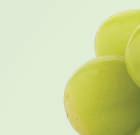




























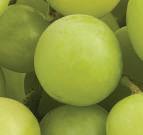












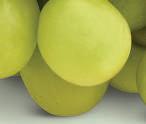








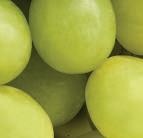

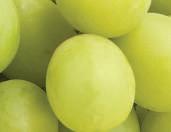








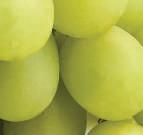





























GIVE THEM SOMETHING TO DROOL OVER.



Experience the irresistibly crisp, juicy texture and uniquely sweet flavor of AUTUMNCRISP ® grapes from Sun World International. Increase sales with this unmatched and unforgettable snack. Scan QR code to learn more.







With shipments on course to grow for a second consecutive year, the industry is on the right path, but there are still many challenges ahead.
by Maura Maxwell

Chilean table grape exports are forecast to grow for the second consecutive year in 2024/25. The Chilean Table Grape Committee is forecasting an export crop of 66m cartons, an increase of 2.4 per cent on the previous season, based on estimates for its members who account for around 85 per cent of the country’s total shipment volume.
While not a significant jump, the increase is nevertheless a sign of optimism in an industry that has felt the full force of Peru’s rapid
ascendancy in the grape market over the past decade. Compare and contrast: in 2014/15, Chile exported 760,000 tonnes of table grapes, making it the dominant Southern Hemisphere player. That same year, Peruvian shipments totalled 287,000 tonnes. A decade on, and Chile’s 2024/25 export crop is projected to weigh in at 541,250 tonnes versus Peru’s 645,000 tonnes. Crucially, Peru’s rapid take-up of new varieties has allowed it to position itself in global markets by aligning its supply with consumer preferences for firmer, crunchier and more flavourful grapes.
Latterly, however, Chile has been making real progress in trying to reverse this decline. The uptake of new varieties is accelerating – this season, they will make up around 65 per cent of Chile’s export offer –
while a better organised sector is yielding positive results when it comes to improved quality and smoother logistics.
Further, this will be the first season in which growers from the regions of Atacama, Coquimbo and Valparaíso can ship to the US under a Systems Approach (replacing the need for fumigation with inspection at origin), a move that is expected to bring about dramatic improvements in the quality of the fruit on arrival.
Christian Corssen, managing
director of Compañía Frutera Santa María, says that while this all adds up to a markedly improved outlook, Chile still has some way to go.
“I think the industry is getting its act together and is adapting to both market requirements and to being more competitive with our grapes, but we still face many challenges,” he tells Eurofruit
American market was so strong, fruit was packed that should not have been exported, and this had a direct impact on prices.”
Despite this, Chile put in a solid performance in 2023/24, with exports growing by 7 per cent in volume and 13 per cent in value to finish the season on a shipment total of 64mn cartons

“We need to have a good debut season under the Systems Approach, and we need to increase our market diversification, especially during our peak production window in the last part of the season. It’s also vital to continue to improve the quality and condition of our fruit. We need to have greater self-control and be stricter in maintaining our own quality standards; we must forget about the bad practices of the past. At the end of last season, for example, because the North
worth more than US$1bn. Corssen acknowledges that this has as much to do with market conditions – in particular the decrease in supply from California and Peru – as it did to any inherent improvements at a national level.
Expectations for the current campaign are more conservative. “Obviously we don’t think we will see a repeat of last season, but we also don’t think we will see the bad results of previous campaigns,” he says. Instead, he anticipates a “new normal”, based on the current
The 2024/25 Peruvian table grape campaign is expected to stabilise following last season’s climatic challenges. The season officially began at the end of July and typically runs through until April.
“The 2023/24 grape campaign was atypical due to weather phenomena that seriously affected the volumes produced. This led to an advance in northern crops, inflating export figures in the first months of the season. However, as time progressed, a drop in total volumes was observed,” explains consultancy Fresh Fruit Peru.
“In the current 2024/25 campaign, the weather seems to have stabilised, and shipments began at a more normal pace. By the end of the 2024/25 season we anticipate a 25 per cent growth in export volumes.”
At the time of going to press, the latest estimates from industry association Provid said production in 2024/25 is projected to reach 78.1mn (8.2kg) cartons, equivalent to about 645,000 tonnes of table grapes and a 24 per cent increase on last season’s total.

output from Chile and Peru. “The supply of better varieties and quality is being felt at the consumer level, and if we manage to maintain a stable supply of around 3.5-4mn cartons a week from the Southern Hemisphere, we should see good demand at attractive and profitable prices for producers,” he says.
Asked what impact the US approval of the Systems Approach will have on the overall balance of shipments to other global markets, Corssen says this will not change much since the areas it applies to are mainly in the north of Chile, which have traditionally always sent a high percentage of their fruit to the US.
“The challenge we face is to be able to have a greater diversification of markets, especially during our peak weeks of shipments, which typically run

ABOVE—Europe should absorb around 14 per cent of Chile’s export volume in 2024/25
from weeks 8/9 to week 13. I think that during these weeks there are still alternatives to send fruit to the Far East, Europe, and Latin America at attractive prices. It is a matter of having the product that these markets require,” he says.
“It would help us a lot if South Korea could delay the increase in taxes on imported grapes, since with the new, later varieties, there is a lot of fruit that is being left out of this market at the end of the season. China, too, has become more complex due to its own higher production, especially Shiny Muscat, but we believe that at the end of the season there is still room to compete with some varieties.”
And where does that leave Europe? Corssen insists that Europe is a relevant market for Chile in the last stage of its season since it helps to take the pressure off other markets during weeks of peak production.
“The move towards newer varieties is also helping to increase demand in Europe,” he says, noting that Europe should absorb around 14 per cent of Chile’s total export volume this season, mainly in the last few weeks of the campaign, while Asian markets should take around 16 per cent of shipments.
Looking ahead, Corssen is encouraged by the positive steps Chile is taking and hopeful that it marks the start of a more stable period for the industry.
“For the moment we will continue to replace what we have left of the traditional varieties with new ones, while also focusing on learning and working under the Systems Approach to put us in the best possible position for the following season,” he says. “But when it comes to making any longer-term decisions, especially regarding new investments, we will wait to see what becomes of this ‘new reality’.” E
Peru’s agricultural exports could surpass Chile’s by 2027
Peruvian agricultural exports could reach US$12.21bn by 2027 according to the country’s Ministry of Agrarian Development and Irrigation (Midagri). This would surpass Chile, which is on course to reach US$12bn.
Peru’s agricultural exports rose by an average annual rate of 10.1 per cent between 2012 and 2022, reaching a record US$7.557bn in that year. Although higher in value at US$10.664bn, the growth in Chilean exports averaged 2.4 per cent a year for the same period.
César Romero, a foreign trade specialist at the Midagri Policy Directorate, explained that if this dynamic is maintained, Peru will overtake Chile by 2027. He pointed out that while Chile has major problems with water availability, the water, labour, climatic and legal conditions in Peru favour investments in agri-exports.
Comparing the two countries, Romero said Peru’s blueberry exports had grown by an average annual rate of 123.3 per cent over the last decade versus 2.6 per cent growth in Chile. In avocados, Peru notched up an annual average growth rate of 20.7 per cent while Chile registered 3.3 per cent per year. And in grapes Peru’s average annual rate was 14.1 per cent versus 1.9 per cent in Chile.
Romero highlighted two mega irrigation projects that he said are vital to the sustainability of the development of Peruvian agri-exports: Majes-Siguas II, a 38,500ha project in Arequipa, and Chavimochic III, in La Libertad, which will add another 63,000ha of irrigated agricultural land. “According to the Association of Agrarian Guilds of Peru (Agap), around 60,000ha are currently used for agro-exports. With the two projects mentioned, that surface area would almost triple,” he noted.
Romero also flagged up the need to open up new export markets for Peruvian products. At present, eight countries buy 71 per cent of Peru’s agricultural exports (the US, the Netherlands, Spain, UK, Chile, China, Germany and Ecuador), and 15 products represent 56 per cent of total agricultural exports. “Therefore, there is room to exploit the markets of Asia, Australia and others,” he said.






















































































































EDWIN REYES Senior Consultant, Promar International
In recent years, one of the most important topics of discussion in the global fruit industry has been the diversification of export markets. A well-balanced export structure reduces supplier vulnerability to demand shocks like the Covid pandemic and also creates some protection against price swings, as well as creating new opportunities in global markets.
When exploring new markets, for many, the obvious choice has been Asia. This market is attractive because of its large population (4.7bn people), growing middle class and future projected economic growth. Lately, Asian countries have also become relatively more politically and economically stable.
Latin American exporters in particular have put a lot of effort into developing the Asian market. However, looking at trade flows over the last ten years, it is clear that traditional markets such as North America and Europe are still very important.
We have used four examples to assess how markets are changing and how successful exporters have been in moving away from traditional markets.
Peruvian table grape exports have been growing rapidly. Shipments increased from 268,300 tonnes in 2014 to a peak in 2023 of 653,500 tonnes. This represents an impressive Compound Annual Growth Rate (CAGR) of 10 per cent.
Back in 2014, traditional markets like the US/ Canada and the European Union together accounted for 45 per cent of total exports. By 2023 this share had increased to 71 per cent, with the US and Canada alone accounting for 50 per cent of total exports. In the tenyear analysed period, US and Canadian imports of grapes from Peru grew at a rate of 22 per cent CAGR.
In comparison, in the more emerging markets, such as Hong Kong, China and other Asian countries, Peruvian grape exports decreased, from a combined volume of 104,400 tonnes in 2014 to 84,500 tonnes in
Peruvian table grape exports, 2014-2023 (‘000 tonnes)

Source: UN Comtrade
% Share of Peruvian grape exports by market, in 2014 and 2023

Source: UN Comtrade
2023. The share of total exports accounted for by these markets also decreased from 39 per cent in 2014 to just 13 per cent in 2023.
In this example, we can see how the role of the ‘traditional’ markets has in fact become even more important.
Total exports of Colombian bananas saw a CAGR of 2 per cent between 2014 and 2023, reaching a peak export volume of 2.37mn tonnes in 2022. As with Peruvian grapes, more traditional markets, such as the EU27 and the UK still
play a very important role in exports. Shipments to this region increased from 1.27mn tonnes in 2014 to 1.67mn tonnes in 2023. This represents a CAGR of 3 per cent. By contrast, exports to Asian countries achieved a CAGR of 15 per cent between 2014 to 2023. However, the volumes exported were 9,700 tonnes in 2023, representing just 0.7 per cent of total Colombian banana exports.
As with Colombian bananas, Brazilian citrus exports to Asian markets saw a CAGR of 41 per cent from 2018 to 2023. However, the level of exports to those countries is still very low overall, at less than 600 tonnes per year.
The overall and ongoing importance of the EU27 and UK markets for Brazilian citrus exports is clear. Exports to this region increased from 99,700 tonnes in 2014 to 157,000 tonnes in 2023. In that year, these markets accounted for a 93 per cent share of the total Brazilian citrus exports.
Chilean cherry exports have increased massively from 85,000 tonnes in 2014 to 414,000 tonnes in 2023 (a CAGR of 19 per cent). However, the situation is markedly different to the other three examples. In this case, China is now, by far, the main destination for exports, having increased its share of total exports from 67 per cent in 2014 to 91 per cent in 2023. This is an increase in CAGR of some 23 per cent.
In North America, imports of Chilean cherries also increased by a 5 per cent CAGR from 2014 to 2023. In the EU and UK, imports of Chilean cherries decreased by a 4 per cent CAGR in that same time period. And the share of total exports that went to North America actually decreased from 11 per cent to 4 per cent, while in the EU/UK it fell from 6 per cent to just 1 per cent.
Emerging markets like Asia are attractive but challenging and succeeding there is often far easier said than done. Favourable market access, efficient transport links and a high level of market understanding are all required for this to happen, along with a strong degree of commitment from growers and exporters alike to make these markets a future priority.
Growth rates for Asian exports often look impressive but start from a relatively low base. Markets in North America and the UK/EU, which have been built up over time, with lots of hard work, cannot simply be disregarded.
Chilean cherry exports, 2014-2023 (‘000 tonnes)

Source: UN Comtrade
% Share of Chilean cherry exports by market, in 2014 and 2023

Source: UN Comtrade
However, the example of Chilean cherries shows the important role of Asian markets going forward, which simply cannot be ignored. In this sort of situation, the need for a balanced export portfolio and clear market prioritisation is clear, not least because of the challenges and uncertainty caused by the pandemic, geopolitical conflicts, and other supply chain shocks experienced lately. Yet, there is much to learn from the Chilean experience in China.
One of the biggest challenges for all fruit exporters, not least in Latin America, is how to get the balance right between developing new markets and servicing their traditional, more mature markets. To make it work, it requires a different approach to both and different skills sets.
Having excellent fruit to trade is not enough. You also need a very high level of market understanding, as well as the development of a clear, yet flexible strategy. This needs to consider economics, customers and supply chains, as well as factors such as climate change and the environment too. It will be those countries and businesses that have great data and market insight (besides having great fruit) that will be the mid- to long-term winners. Being exceptionally well informed is a key part of this. Going forward, this will enable operators to assess the real level of risk and reward involved in the short, medium and long term in key markets – something even the most experienced fresh produce exporters around the world will have to take into account. E
introduced by the Ministry of Agriculture and Food Security, is a national endorsement and branding for the quality and safety of Malaysia agricultural produce that meets domestic and international standards.
Quality control of agricultural produce begins with good agricultural practice that comply with myGAP Certification or equivalent standards and adhere to the Federal Agricultural Marketing Authority (Grading, Packaging, and Labeling of Agricultural Produce) Regulations 2008 - GPL Regulations.

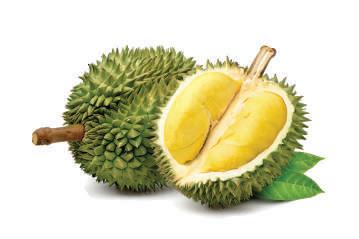


TRL (SOUTH EAST ASIA) SDN. BHD NO.36, JALAN P10/21, TAMAN PERINDUSTRIAN SELAMAN, SECTION 10, 43650 BANDAR BARU BANGI, SELANGOR. salihah@trlasia.com www.trlasia.com
ROMPIN INTEGRATED PINEAPPLE INDUSTRIES SDN. BHD. 21-5, JALAN SP 2/1, SERDANG PERDANA, 43300 SERI KEMBANGAN, SELANGOR. compliance@rompine.com.my www.rompine.com.my
BINDU FLORIKULTUR SDN BHD PTD 24854, PARIT MAMAK, MUKIM LINAU, 83010 BATU PAHAT, JOHOR. binduflorikultur1825@gmail.com
AGNESSIA BEST FRUITS TRADING 101, LORONG GALING 122, 25300 KUANTAN, PAHANG. agnessiafruits@gmail.com www.agnessia.com
JUTAWAN ENTERPRISE
NO.332 TAMAN JAYA, JLN ALSAGOFF, 82000 PONTIAN JOHOR. jutawan8911@gmail.com www.facebook.com/jutawanenterprise
MAPC SDN BHD PT 13532 JLN BANTING PANDAMARAN, 42000, PELABUHAN KLANG, SELANGOR. samtan@beoholding.com www.mapc.com.my
AS SYURA TRADING & RESOURCES SDN BHD LOT 10386 BATU 34 JALAN JOHOR, 82000 PONTIAN JOHOR. syemir@assyura.com www.assyura.com
TOP FRUITS SDN BHD
1 2 3 4 5 6 7 8 9 10 11 12 13 14 15 16
M1 JLN ML 16 ML 16 INDUSTRIAL, PARK 43300 SERI KEMBANGAN, SELANGOR. williamson.wee@topfruits.com.my www.topfruits.com.my
FAR EAST IMPORTEXPORT (SERDANG) SDN BHD NO.9 & 10 JLN TIARA SENTRAL 1, KWSN PERINDUSTRIAN NILAI UTAMA, 71800 NEGERI SEMBILAN. qaqc.fareast@gmail.com www.far-east.com.my
DURIANSHIP SDN BHD PT 9367 TAMAN TITIWANGSA, 18300 BANDAR BARU GUA MUSANG, KELANTAN. durianship2022@gmail.com www.durianship.com
SOUTHEAST ASIA FRUITS INDUSTRY SDN BHD 42-1 JLN KPKS 1 KOMPLEKS PERNIAGAAN, KOTA SYAHBANDAR, 75200 MELAKA southeastasia899@gmail.com
JANELITE RESOURCES 192 GOLDEN DRAGON GARDEN, 31900 KAMPAR PERAK. janelite.resources@gmail.com
DURICIOUS SDN BHD NO.25588 JLN SS2/64, SS2 47300 PETALING JAYA. sl.chong@dkfreight.com.my www.dking.com.my
MUN MENG FRUITS (M) SDN BHD PT 23010, TAMAN SG. KLAU, 27630 RAUB, PAHANG. munmengfruits2@gmail.com www.munmenggroup.com
PHG EVER FRESH FOOD (M) SDN BHD LOT 10380, GM 4324 JLN SG. CHALIT, 27630 RAUB, PAHANG. cltheng@phgeverfresh.com www.phgeverfresh.com
MUSANG VALLEY PLANTATION SDN BHD
B12-4 WISMA PANTAI BLOK B LEVEL 12, BANGSAR TRADE CENTRE, NO.5 JLN 4/83A OFF JLN PANTAI BARU, 59200 KUALA LUMPUR. account@musangvalley.com www.musangvalley.com
At Zespri, sustainability is not just a goal – it is the core of everything we do. Alongside our industry partners, we are constantly innovating to deliver nutritious, low-impact, and greattasting kiwifruit to consumers while promoting environmental resilience.
Zespri kiwifruit is more than just a fruit. It is a nutritional powerhouse packed with essential vitamins, antioxidants, and fibre that supports healthy living. As part of our mission to nurture a healthier global population, we are committed
to growing kiwifruit in a way that benefits both people and the planet.
We recognise the significant challenges that face the fresh produce industry. Climate change, resource scarcity, and shifting consumer expectations demand bold action. At Zespri, we are meeting these challenges head-on through innovation, collaboration, and a commitment to sustainable practices.
Reducing our carbon footprint is a priority, and shipping is a key area. We have developed a net-zero


roadmap to 2050, focusing on reducing emissions across our supply chain. This year, we partnered with shipping companies to establish a low-emission shipping corridor between New Zealand and Europe, using Zeebrugge as a key hub. These green corridors aim to enable the use of alternative fuels, upgraded port infrastructure, and advanced shipping technologies.
Our first biofuel trial earlier this year was a success, and marked a tangible step forward in reducing our supply chain’s carbon footprint. With shipping accounting for over 40 per cent of our industry’s emissions, this initiative underscores our dedication to creating a low-emissions future and becoming carbon positive by 2035.
In parallel, we are taking steps to reduce waste by transitioning to home compostable labels for all Zespri kiwifruit. These innovative labels, made from biobased polymers, are certified to break down completely in home composting environments.
This year marks a major milestone as we finalise the transition in Europe to full supply of these home compostable labels. This move aligns with our goal to use 100 per cent recyclable, reusable, or compostable packaging; we are already at 88 per cent, and move closer to our target every day.
Our approach to sustainability is forward-looking and seeks to anticipate future possibilities. Through the ZAG Fund, we foster innovation by investing in communitydriven and environmentally focused projects and startups. In just its first year, the fund has supported eleven pilot projects that tackle challenges such as climate resilience, soil health, and sustainable farming practices.
At Zespri, we believe that collaboration with growers, researchers, and innovators is essential for meaningful change. From shipping partners to consumers, we are working together to give value back to people and the planet with each kiwifruit consumed. E
LEFT—Zespri’s investments support projects which address key areas like climate change, soil health, and sustainable farming


Total European Union, non-EU Mediterranean and US citrus volumes are all expected to drop in 2024/25.
by Carl Collen
The World Citrus Organisation (WCO) has released its annual Northern Hemisphere citrus forecast for the upcoming season of 2024/25, predicting a year-on-year fall in overall volume.
Citrus production is estimated at just under 27.3mn tonnes, representing an 8.73 per cent decrease on the previous season, while standing 5.88 per cent lower than the average of the last four campaigns. Exports are expected to follow a similar trend at 8.38mn tonnes, down by 8.94 per cent from 2023/24 and 9.78 per cent from the four-year average.
“The market insights we received indicate a decrease from last year’s high volumes,” said Philippe Binard, WCO secretary general. “This is mainly driven by Turkey returning to regular production levels after last season’s record figures as well as Egypt’s expected decrease.
“Climatic issues, such as late frost, drought, heat
27.3mn
LEFT—Italian citrus volumes are expected to fall by more than 12 per cent
waves, or new pests and diseases are constant threats to the quality, colouring, or harvest date for the production,” Binard noted, adding that “the market will still be impacted by geopolitical instability while consumer demand is under pressure due to limitation of purchasing power and inflation”.
The WCO revealed that Spain’s citrus production, at 6.18mn tonnes, is set to fall 3.3 per cent on the previous season, led by a 21.01 per cent decrease in lemons from last year’s record high.
The dramatic weather events in Spain are “not expected to
“The market will still be impacted by geopolitical instability, while consumer demand is under pressure”
have a significant impact on the overall supply”, which remains as predicted, the organisation noted.
Italy’s volumes are down by 12.32 per cent at 2.77mn tonnes, with a 17.51 per cent decline in oranges, while Greece remains stable at 1.09mn tonnes. In the other Mediterranean countries, Turkey is forecast to decrease its production by 17.57 per cent to 4.95mn tonnes after last season’s record figures.
Egypt, at 4.35mn tonnes, is down by 19.55 per cent from 2023/24, while Morocco’s production is expected to grow 11.97 per cent to 2.14mn tonnes. Israel’s production is also estimated to recover to 560,000 tonnes, up 18.5 per cent.
Portugal, which contributed to the WCO forecast for the first time, estimates a 3.37 per cent decrease in the upcoming season, or 380,000 tonnes in total. Production in the US is expected to shrink to 4.55mn tonnes, down 4.28 per cent, continuing to decrease compared with the average of the previous seasons (down 11.52 per cent). E
The new mandarin continues to win over growers and consumers alike, says ANBGCM Material Vegetal.
by Maura Maxwell
October’s Fruit Attraction served as the backdrop for the launch of the new marketing campaign for Leanri, a late-season Clementine/Murcott mandarin owned by ANBGCM Material Vegetal.
Under the slogan ‘Leanri, how great you are’, the campaign highlights the variety’s size, flavour, shelf-life and profitability. The variety has gone from strength to strength in the few years since its
launch. Thanks to its consistently strong commercial results, uptake amongst growers has been enthusiastic and today there are around 3,000ha of plantings in Spain – 53 per cent in Valencia, 43 per cent in Andalusia and the rest in Murcia and Catalonia.
“Leanri is still a young variety –the first plantations were made in 2017, but it wasn’t until 2020/21 that acreage really began to expand,” ANBGCM Material Vegetal explains.
“Any protected variety, by its definition, must have limits on its production and this is also the case with Leanri”
“This will be the first season that significant volumes will be marketed.”
In fact, production is expected to double this season to 20,000-21,000 tonnes, up from 11,000 tonnes in 2023/24. Harvesting began in the last week of December in the earliest production areas and runs through to the end of March. This extended harvesting window is another benefit of Leanri as it provides plenty of opportunity to market the variety.


ANBGCM Material Vegetal says there are still a limited number of licences available, but these are expected to have been allocated within the next two years. “Any protected variety, by definition, must have limits on its production and this is also the case with Leanri. There is currently a limit of 4,000ha, which will be revised as market demand requires it,” the company explains.
This year’s campaign features a range of activities, including field days to share best growing practices, social media activities, testimonials from farmers, and newsletters with advice on how to grow and manage the variety.

“At first glance, what attracts you to Leanri is its size and colour. But its biggest calling card is how well it eats and its crunchy texture, that’s what makes consumers go back for more,” ANBGCM says. “It works for the producer, the marketer and, most importantly, the consumer. In the end, marketing can persuade you to buy a product the first time, but it’s not what keeps you going back for more.” E









LEFT—Currently, there are around 3,000ha of production in Spain
OPPOSITE—Leanri’ is known for its size, flavour and shelf-life








From its central location in Latina, Fratelli Vinaccia says it plans to sell even more of Italy’s best-known lemons to customers across Europe and beyond.
by Mike Knowles
BELOW—Fratelli Vinaccia has expanded and upgraded its Fondi packing facility

Demand for high-quality lemons that are nowadays synonymous with the Italian town of Sorrento is increasing, according to one of the fruit’s leading exporters, Fratelli Vinaccia.
The company, which was founded by the Vinaccia family back in the 1960s and known before as La Costiera, continues to produce and market Sorrento lemons to customers in Europe and beyond. And according to export manager Valentina Sanna, it’s a product that represents the very best of what Italy has to offer.
“Sorrento lemons have always been known as a high-quality and, above all, original Italian
product,” she explains. “Over the years, the goal has been to enhance and promote Sorrento lemons –a product of the highest quality and not chemically treated – and bring it to consumers’ tables while maintaining its freshness, goodness, aroma, scent and flavour. At the same time, we are strengthening Sorrento’s reputation for excellence.”
The lemons are grown in Piano di Sorrento and Sant’Agnello, from where they are shipped around the world. As Sanna explains, Fratelli Vinaccia supplies a number of supermarket and hypermarket chains in Italy, especially via an extensive wholesale network in the centre and north of the country.
It also exports to buyers in Europe – mainly the UK, Germany and parts of northern Europe – as well as Dubai and the US. Those customers also buy other types of citrus, such as bergamot, citron, clementines and Sicilian oranges, as well as Piennolo tomatoes.
In the past few years, the company has significantly expanded its packhouse in Fondi, Latina, to create additional space and to accommodate nextgeneration packing and grading machinery.
“The citrus fruit market is responding positively to market demands, and demand is growing especially around the start of the Sorrento PGI lemon season,” Sanna tells Eurofruit. “We are expanding our foreign markets, and establishing new supply to new retailers. We want to amaze our customers with top-quality products, and we are also trying to sell those products to new foreign customers and retailers who intend to include the Sorrento line on their shelves.” E

A new venture aims to raise the quality bar for Colombiangrown Persian limes and improve the lives of small farmers.
by Maura Maxwell
development in the Colombian countryside. According to Duque, just 6 per cent of Colombia’s lime production is currently registered by the Colombian Institute of Agriculture (ICA) for export, even though they are highly valued in the international market for their high juice content and exceptional flavour.
“EqPaís marks a new era in Colombian agriculture by reducing intermediaries in the supply chain, allowing producers to access better margins and economic benefits,” he tells Eurofruit. “Our goal is to transform the lives of rural families through

Juan Pablo Duque, the founder and CEO of Colombia lime exporter
Equilibria Agro, has set up a new venture to transform the country’s supply of Persian limes. By bringing small and medium-sized producers under the Equilibria umbrella, he aims to create a productive block of 2,000ha to supply the international market directly.
Equilibria Agro has 300ha of own production in the
departments of Antioquia and Caldas and operates the third largest lime nursery in Colombia. With the incorporation of these new growers, Duque hopes to turbo charge the country’s supply of high-quality limes for export.
He describes EqPaís as “a modern cooperative with local impact and global vision”. Its aim is to capitalise on growing international demand for Colombian limes, while boosting productivity and sustainable
sustainable income and agricultural projects that enhance their quality of life. Achieving this harmony is the true formula for peace in Colombia.”
The initiative will leverage the advanced technology of EqApp, an app-based technology platform created by Duque to efficiently manage and monitor agricultural activities and provide remote technical assistance to growers. Focused on lime production, EqPaís enables agronomists to provide support and advice without the need for travel, thus optimising the scope and efficiency of farmer support.
ABOVE—Duque (sixth from right) describes EqPaís as “a modern cooperative with local impact and global vision”












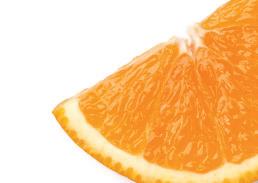



















“This will ensure consistent, high-quality production that meets the stringent standards of international markets and guarantees product traceability and sustainability,” Duque says. “EqPaís aspires to consolidate a collaborative ecosystem that not only boosts the rural economy but also elevates Colombia as a benchmark for agricultural excellence.”
The project has already garnered enthusiastic support from one of Equilibria Agro’s key US customers, Dole. Its vice president of sales, Kevin Delaney, recently travelled to Colombia to learn more about EqPaís.
“Juan Pablo has a clear vision for positioning Colombia as a leader in global agriculture, and I really admire his ambition to transform the lime industry,” he tells Eurofruit. “His innovative approach, especially with the EqApp platform, has incredible potential to empower growers and streamline the supply chain, ensuring the highest standards of quality and sustainability. We’re excited to partner with him and support his mission to bring the best Colombian limes to the North American market.”
One of Colombia’s big advantages is that it can grow Persian limes year-round due to the variation in topographies and altitudes. But prices are heavily influenced by seasonal supply fluctuations on the global market. In the US, for example, around 95 per cent of imported limes come from Mexico and the best prices for Colombian limes are in the February to April window when Mexican supply is lowest. In Europe, Duque says the best price window is from July to September. Nevertheless, the company’s goal is to establish 12-month programmes with key partners.
Dirk Cederhout, sourcing manager, exotics at Nature’s Pride, believes Duque’s vision very much aligns with the Dutch company’s philosophy. “Equilibria is a progressive company trying to make an impact through agriculture. By cultivating and exporting limes it is trying to improve the livelihoods of local communities and create a higher standard,” he says.
“We had the opportunity to experience their vision and dedication during a visit in September. Their mission, vision and dedication very much comply with the values and mission of Nature’s Pride, which is why our companies have an excellent fit.”
As a business, Cederhout says Nature’s Pride strives to minimise its negative impact and maximise our positive impact. Social compliance and water are standard nowadays, but things like carbon emission, biodiversity, and WASH are becoming more and more important.
“It is inevitable that all stakeholders in the value chain must assume their responsibilities and make this part of their business, so it’s very important to


work with the right partners who align on these themes,” he notes.
Crucially, these stakeholders include the European supermarkets. New EU regulations are forcing retailers to rethink how the goods they sell are produced, sourced and marketed as they move towards building more sustainable and transparent supply chains. This makes companies who meet these criteria attractive.
“It’s great to Equilibria Agro being one of the front runners in the industry and their believes in bringing transparency to the market on the one hand and making local impact on the other hand. This gives the company and product a real added value in the market,” Cederhout says. E
ABOVE—Training and empowering small and medium-sized producers is the cornerstone of Duque’s mission

Nador Cott Protection has come to a settlement with Sainsbury’s over the sale of Tang Gold mandarins, amid ongoing legal battles over intellectual property and citrus variety protection.
by Tom Joyce

Nador Cott Protection (NCP) has successfully reached an agreement with UK retailer Sainsbury’s over the sale of Tang Gold mandarins, which NCP claims were being sold without authorisation. This agreement follows months of legal action initiated by NCP, which argues that Tang Gold is an “essentially derived variety” from Nadorcott.
The settlement, which was finalised before the English High Court, sees Sainsbury’s changing its product specifications and agreeing to remove Tang Gold from its shelves pending the outcome of broader legal proceedings involving the Nadorcott variety.
This development comes on the heels of significant rulings from EU courts, which have rejected challenges to Nadorcott’s protection. NCP maintains that these decisions affirm that Tang Gold is not sufficiently distinct from Nadorcott, with only minor differences related to fertility between the two varieties.
“We are pleased to announce this resolution,” says Mohamed Benbiga, director of NCP. “This settlement reinforces our ongoing commitment to protecting the intellectual property of Nadorcott.”
NCP had previously sent cease-and-desist letters to several European retailers, with Benbiga making it clear that the
organisation would not allow any infringement on the rights to the Nadorcott variety.
The Nadorcott saga is part of a broader legal dispute that dates back decades. The variety’s origins trace back to the 1980s, when a Moroccan researcher collaborated with the University of California, Riverside, on citrus plant material. What followed was a misunderstanding of intellectual property rights that ultimately led to the development of a seedless mandarin variety that closely resembled Nadorcott but with one key difference: no seeds. The irradiated variety became known as Tang Gold.
NCP argues that Tang Gold is essentially derived from Nadorcott and should be considered a protected variety under international laws governing plant breeding. However, the situation became more complicated when the University of California granted a commercial license to a Spanish company, which began marketing Tang Gold without NCP’s consent. Despite expert reports supporting NCP’s claims, Spanish courts ruled in favour of the Spanish company, further complicating the legal landscape.
With legal battles in Spain still ongoing and the recent court rulings in the EU offering some momentum, NCP is now focusing on preventing unauthorised exploitation of Nadorcott across Europe and beyond. “We will continue to defend our exclusive rights to Nadorcott,” Benbiga vows. E
The Association of Moroccan Nadorcott Producers (APNM) is presenting its new visual identity for the Moroccan Nadorcott at this year’s Fruit Logistica. The refreshed logo features a vibrant orange and blue colour scheme, the blue being inspired by the Agafay region’s night skies. At the heart core of APNM’s communication strategy is the concept of the ‘Original Tree’, presenting Morocco as the authentic birthplace of the Nadorcott.





In the past five years, Sawari has made a name for itself as a garlic and ginger importer. Now it plans to develop local ginger production in Europe itself, starting with its home country the Netherlands.
By Mike Knowles

Europe could have a lot more of its own fresh ginger production in the next few years, if the roots of a new project in the Netherlands can generate enough commercial growth. That’s the goal for Rotterdam-based Sawari Fresh. Established five years ago by entrepreneurs Sander Kleinjan and Arie Havelaar, the company has quickly established itself as a reliable garlic and ginger importer for customers across the continent.
Now, it’s on a mission to source ginger from production centres far closer to the market than ever before. “The biggest idea was to present fresh ginger to the retailer from Dutch soil,” says Havelaar.

Two years ago, Sawari began working with local growers to plant organic fresh ginger. And in late 2024, it harvested its first commercial crop and began selling it to customers in the country. If successful, the project could even be replicated in another European country, where it would supply customers with a similar, local-forlocal product.
“The Dutch ginger started really as a trial, to see if it’s possible to grow ginger in the Netherlands, or later maybe in Europe,” Kleinjan explains. For now, he says, the focus is on exploring the best places to grow it. “Because in the Netherlands it’s quite cold, of course. But maybe in other parts of Europe there are possibilities to grow it on a larger scale.”
For the time being, therefore, Sawari’s Dutch-grown ginger is only sold to customers in the Netherlands. But in years to come, this local for local model could be replicated elsewhere. “I think for the future, instead of getting it from overseas producing countries, it’s important that
we [also] produce it in Europe,” Kleinjan adds.
Havelaar sees plenty of opportunity in the retail market, but only in a certain segment of a supermarket’s overall offer. “We cannot compete with imported ginger, because that is way too competitive most of the time. We need to do a lot of promotion towards the consumer [to explain] that it is locally grown, it’s fresher, there’s more juice, the strength is higher and better. These are the things we have to teach people.”
Sawari’s retail sales director is Mark Grim. He believes there is much that the company can do in order to create more excitement among consumers about both ginger and garlic. “We are thinking almost every day about new concepts,” he says. “If you look at the garlic shelf, you see it’s very common, also a little bit boring. But we think that we can also build the category to tell more about garlic, and also the differences of garlic, and how to use the product in different recipes, what you can do with it.” E
LEFT—Sawari’s growers produce the ginger in unheated greenhouses BELOW—Roots are planted in May BOTTOM—Dutch organic ginger is said to be fresher and stronger than imports

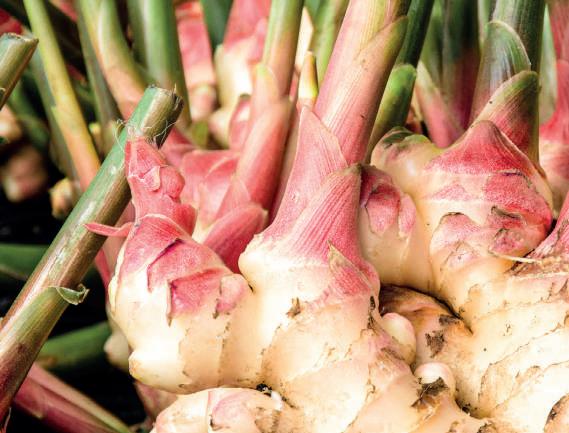
The world’s top three ginger suppliers are China, Peru and Thailand. And most of the fresh ginger sold in the European market comes from China, Peru and Brazil.


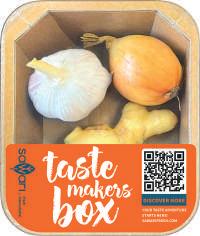



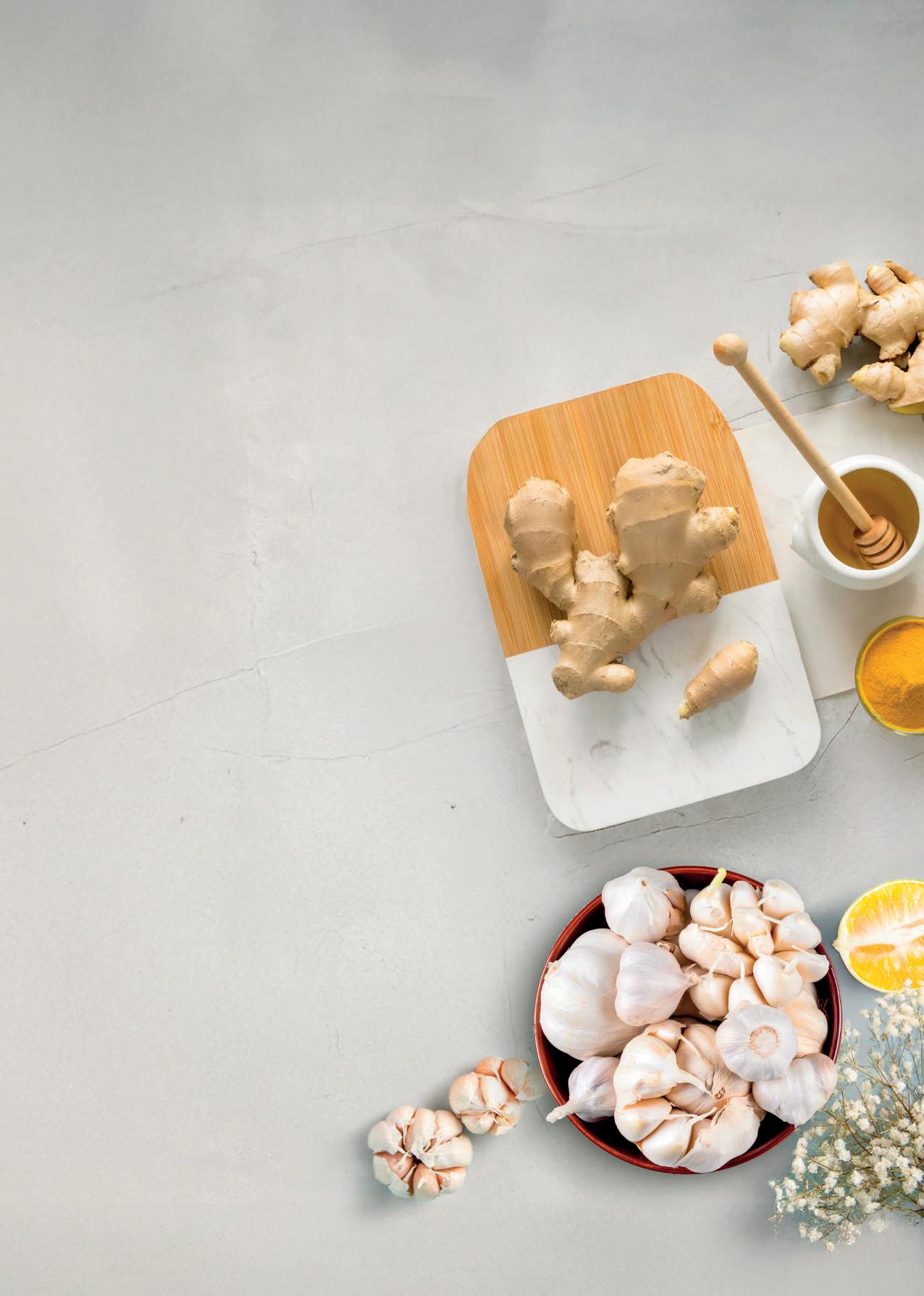

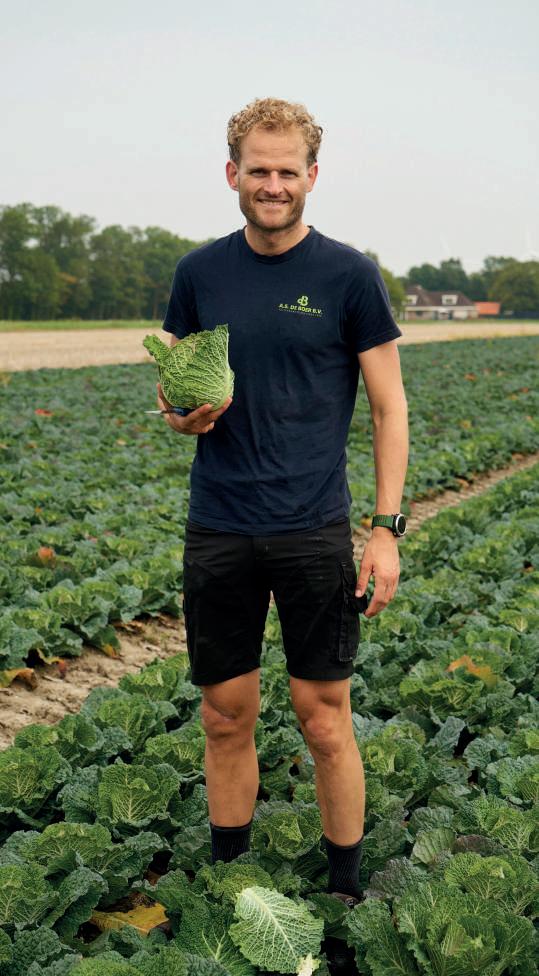
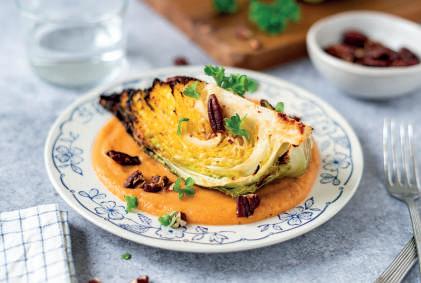
The new Savoy pointed variety gives consumers something different to try, say its developers.
by Mike Knowles
Dutch marketer The Greenery has supplied Savoy pointed cabbage to the Netherlands’ second largest supermarket chain Jumbo for the first time, in response to growing demand for plant-based food among younger adult consumers.
The product, which made its market debut in the autumn, was developed through a partnership between The Greenery, Jumbo, seed breeder Bejo, and producer AS de Boer.
According to Joris de Boer, who grows the cabbage, its striking pointed shape, mildly sweet taste, and crunchiness make it a potential winner.
“When I first saw the Savoy pointed cabbage, this product immediately reminded me of cherry tomatoes: a new product derived from an existing product but with even more flavour,” he comments.
Although Dutch consumers already buy a lot of cabbage every year, the new variety opens up new possibilities in terms of how it is consumed. “Traditional pointed cabbage remains ideal as an ingredient in salads due to its tender structure and sweet flavour,” says De Boer. “The Savoy pointed cabbage is also ideal for the wok, or for roasting for that extra bite. This brand new product makes us very proud.”
Jumbo’s veg category manager Ruud de Vries welcomes the chance to improve the retailer’s vegetable range. “We always look for innovations in the vegetable section. The open-field category has tended to be quite traditional, but we certainly see opportunities here,” he says. “The savoy pointed cabbage fits in well with the season and comes from the Netherlands. That fits in perfectly with what Jumbo stands for.”
“When I first saw the pointed cabbage, it reminded me of cherry tomatoes: a new product with even more flavour”
Katinka Bijl, product marketeer at The Greenery, believes the product will meet with strong consumer interest. “Plant-based food is hot! And, this savoy pointed cabbage has a short preparation time and therefore fits in well with the need for convenience of consumers, especially Millennials and GenZ,” she comments. “In addition, the cabbage, like pointed cabbage, has a sweetness that will certainly make children enthusiastic about eating it.” E
GlobalGAP Primary Farm Assurance offers an innovative, stepwise entry-level programme for smallholders, breaking down barriers to market access and paving the way toward full certification.
Small-scale producers in developing economies often face daunting obstacles blocking entry to formal produce markets. At the same time, retailers in these regions frequently find limited options for sourcing fruits
and vegetables from transparent and responsible supply chains.
GlobalGAP’s Primary Farm Assurance (PFA) programme is bridging this gap by equipping smallholders with the tools they need to demonstrate responsible


ABOVE—Dr Elmé Coetzer-Boersma
LEFT—GlobalGAP’s PFA programme equips smallholders with tools to demonstrate responsible farming
farming and compete in formal markets. For retailers and consumers, the programme delivers assurance on key concerns, including food safety, environmental impact, and social responsibility.
“By working with assessed smallholders, retailers gain a powerful tool to identify risks and build more sustainable, transparent supply chains,” says Dr Elmé Coetzer-Boersma, managing director at GlobalGAP c/o FoodPlus GmbH. And bringing more small-scale producers to the table allows retailers to source from a larger pool of trusted suppliers.
While the PFA programme simplifies requirements, it preserves the core principles of responsible agricultural practices enshrined in GlobalGAP’s comprehensive Integrated Farm Assurance (IFA) standard. These include essential topics like food safety, traceability, water management, worker welfare, and internal documentation.
Technical experts at GlobalGAP have designed PFA as a stepwise programme featuring Entry, Intermediate, and Advanced levels, each level a step closer to IFA certification. This structure invites smallholders to advance toward full certification at their own pace, adapting to their unique farm-level realities while building capacity along the way.
“‘Pre-certified’ produce grown within the PFA framework opens doors to markets that value safe and responsible production processes,” explains Dr Coetzer-Boersma. “This not only creates opportunities for increased sales and market share but also ensures more awareness of implementing safe and sustainable production practices.”
As a capacity-building tool, the programme emphasises development, providing valuable technical training to help farmers enhance efficiency and grow higher-quality fruits and vegetables. The result? More responsible farming that strengthens the bottom line. E

Ofer Peleg, who recently took up the position of chief executive, speaks exclusively to Eurofruit as the seed specialist enters its landmark 100th year.
by Carl Collen
Ofer, you recently stepped up to become CEO of Hazera. What do you bring to the position, and what are your objectives?
Ofer Peleg: I am an engineer by profession, and I worked for 20 years in the pharmaceutical industry where I gained a lot of global experience. I then moved to Netafim, the precision irrigation leader, and that was a great bridge to the agricultural business. That’s where I got to know the farmers, the beauty of agriculture and being part of the world’s green chain.
In day-to-day activities I’m using a lot of my pharmaceutical experience, because developing trade or varieties has a lot of similarities to developing new medicines. Look at the level of
investment in R&D, the complexity and length of the process, and the trials you must undertake.
I’m very honoured to be part of almost 100 years of heritage. Being passed the torch and holding onto it for the next couple of years makes me feel lucky. More specifically, I mean to navigate and to lead the company into the challenges we face, whether that is the global economy or sustainability challenges, or day-to-day challenges that every company with a lot of people and processes faces.
Moving into 2025, Hazera is celebrating 100 years of operation. How are you marking this?
OP: There are no plans to have a huge celebration, not because it’s not important, but because we are thinking about the present and looking to the future. Our heritage is there, and it is important, but we are very realistic, and we focus mainly on where we are, how we can contribute, and how we can grow in the future.
LEFT—Ofer Peleg took over as CEO at the end of 2024
OPPOSITE—The Windsor mini plum tomato variety
Where are Hazera’s strengths as a seed company?
OP: We believe we have good assets. Our pipeline, our genetics, is advanced and healthy, and we have invested a lot in R&D in the last couple of years. Now we are bearing the fruits of that investment.
The second asset is our innovation, which is part of our DNA. We have just created a major function to deal with innovation, taking us through the process from the early stages of R&D all along the supply chain – production, commercial, marketing – all across the company.
21 days
People are our third major asset, and you can connect that to geopolitical challenges. A significant number of our employees are based in Israel, which has been at war for more than 14 months. Despite this challenging environment, we see enthusiasm, progress and commitment, and the level of resilience is strong. I can say the same for Ukraine, because we have operations there and those guys have been at war for three years, and they still deliver in a really impressive way.
Which products are good examples of Hazera’s innovation?
OP: Windsor is a mini plum tomato, a ToBRFV-resistant variety that has extended freshness. It stays crunchy after 21 days, and
“No formula works perfectly. It’s about having the right varieties, for the right customers, suited to the right geographical location”
we have good faith in this variety. Also, the carbon footprint of Windsor is 18 per cent lower than that of its competitors because of the way it is cultivated. ToBRFV is something we have focused on, and we were honoured to be very early in introducing ToBRFV resistance in our tomatoes. The results are there to see as our resistant varieties, including Windsor, are selling nicely.
What other traits are important when it comes to product development? And is it difficult to balance all of these traits?
OP: Yield is a consideration, and being able to withstand weather conditions such as heat, cold and drought is important. Taste is obvious and is a big part of our focus.
There is no formula that works perfectly for all traits and all customers. It’s about having the right varieties, for the right customers, suited to the right geographical location.
That is where being part of a wider family, the Limagrain Group, makes a difference. When you do business, it is not just with us, but the whole family under the Limagrain umbrella – Hazera, HM Clause and Mikado – and that offers an advantage in terms of our ability to cover the entire globe, and in terms of meeting all the needs of our customers.

What other developments are you championing at Hazera, and what will you be showcasing at Fruit Logistica?
OP: We have our high-tech tomato greenhouse, which we recently inaugurated in Made in the Netherlands. This was quite a significant investment for us, and we have ambitious plans in this

segment. We are also entering into more advanced technologies related to sorting and using AI in our sorting processes.
At Fruit Logistica in Berlin, we will be talking genetics. It’s very simple – we have great genetics, quality traits, great taste, and all the relevant things which satisfy customer demand. You will not be disappointed with us. E

























Climate woes in southern Europe and a post-Brexit trade advantage could work in Belgium’s favour as the country looks to cement its reputation as a supplier of the finest fresh produce.
by Fred Searle
Maintaining a reputation for growing and exporting high-quality fresh produce is no small task. It requires passion, care and precision right the way through the supply chain. And this is exactly what Belgium continues to demonstrate as it looks to capitalise on new export opportunities in the UK, Europe and Asia.
Belgium is a small country. Indeed, at its widest stretch from the North Sea coast to the Germany-Luxembourg border, it is only about 290km wide. But what it lacks in size, it makes up for with efficiency, coordination, and modern growing techniques. From its well-oiled grower cooperatives and auction clock sales, to its highly automated and sustainable

greenhouses and packhouses, there is much to be admired about the country’s fresh produce industry.
When it comes to trade, pears and tomatoes are by far Belgium’s most valuable fruit and vegetable exports. The two products were worth €343.1m and €320.1m respectively in 2023, according to Eurostat and VLAM, Flanders’ Agricultural Marketing Board. It is in these products and others –notably peppers, leeks, cucumbers and strawberries – that Belgium’s leading cooperatives and exporters see opportunities to grow trade. And there are good reasons to believe they will be successful.
Climate change in southern Europe – leading to extreme temperatures, drought and flooding – is creating opportunities for Belgium to send more produce to countries such as Spain and Italy. Indeed, these emerging opportunities were highlighted in September and October when production in both countries was hit by devastating floods.
Jeroen Buyck is the CEO of Calsa, one of Belgium’s leading fresh produce exporters. His company has witnessed significant export growth to Spain and Italy in the past two to three years, particularly in leeks, cabbage and pears.
“Product quality is really important in both markets,” he says, “which has given Belgium an advantage”.
According to Maarten Verhaegen, sales division manager at Belgium’s largest fruit
RIGHT—Maarten Verhaegen of BelOrta sees a chance for export growth in various European markets BELOW—Pears are Belgium’s biggest fresh produce export

and vegetable cooperative BelOrta, there are also opportunities to expand in the French market “by a couple of per cent”, since the country’s greenhouse technology is generally quite old. Germany, however, which is one of Belgium’s biggest fresh produce markets, is becoming more self-sufficient in some fruits and vegetables, so Verhaegen expects opportunities in certain products to decline slightly there.
The lucrative Norwegian market, meanwhile, is being targeted by VLAM in a new promotional campaign.
UK trade, meanwhile, has been turbocharged by Brexit due to the country’s geographical proximity, streamlined logistics, and comparative advantage in terms of freshness. This despite the added regulation and administrative burden caused by Brexit.
BelOrta, for one, is keen to advance its position in the UK market. Since Brexit, the co-operative has increased the share of its exports destined for the UK – from 2-3 per cent to 10 per cent. And Verhaegen says BelOrta wants to reach a 15-20 per cent share in the next few years.
He sees opportunities for Belgian fresh produce companies to reach new customers in other parts of the country, as well as continuing to focus on wellestablished supply relationships at London’s wholesale markets.
Looking further afield, Asian markets might only account for relatively small volumes from Belgium, but they are evolving quickly. China and Hong Kong are the fastest-growing markets for Belgian pears –predominantly in Conference but also in premium





















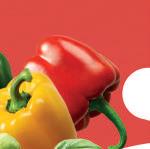






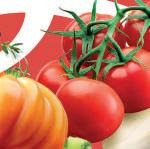















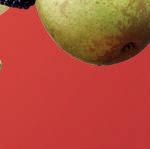


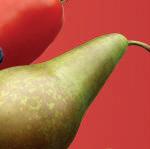











The fresher, the better. This motto has been at the core of BelOrta since our very beginning. Nowadays, our more than 1.200 growers ensure an extensive product range of more than 200 varieties of fruits, vegetables and herbs
From well-known classics to hyper-innovative novelties, from conventional to organic, … We always follow the strictest quality requirements and are passionate about sustainability.
More information about our range? Call our sales department on +32 (0)15 565 617 or send an email to sales@belorta.be


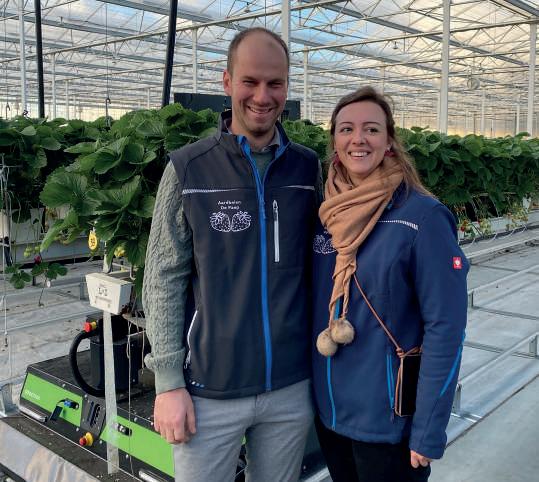
LEFT—Maarten de Paep and Yasmine Smeets are trialling Octiva’s Xenion robot
MIDDLE—Bert Depoortere has improved quality and yield by switching to hydroponics
BOTTOM—Jeroen
Buyck reports export growth to Spain and Italy
OPPOSITE—Belgian leeks are being exported to southern Europe in higher volume
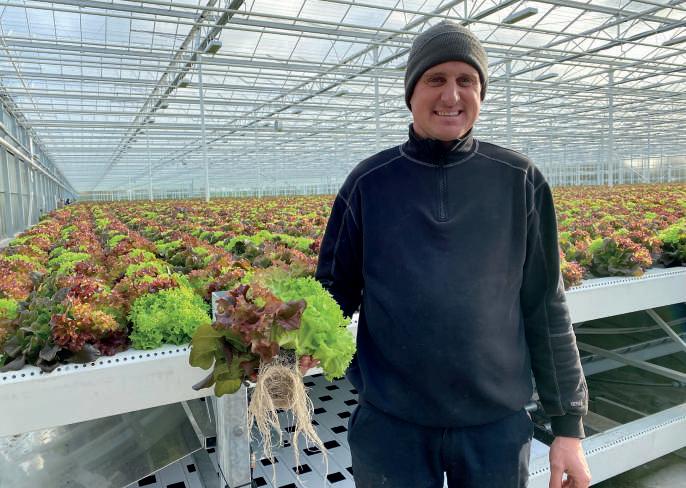
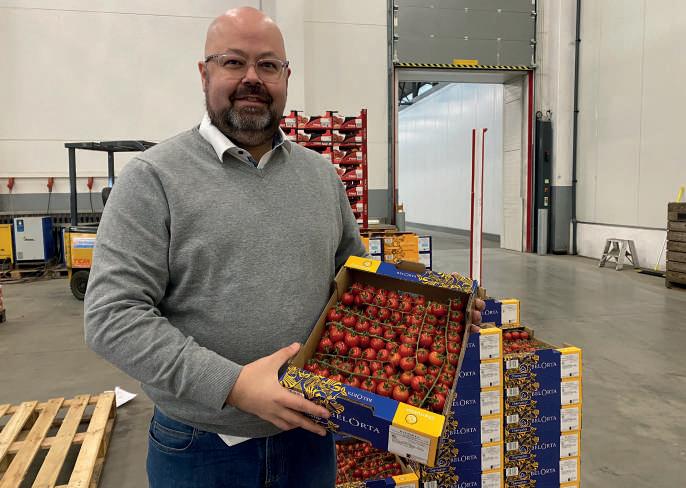
varieties such as the red-blushed Sweet Sensation.
Indeed, when Fruitnet visited BelOrta’s state-ofthe-art packhouse in Borgloon in November, special packaging for Chinese New Year was coming off production lines in time for the celebration on 29 January.
Belgian pear growers have a particularly strong reputation around the world, especially in the Conference variety, which accounts for roughly 90 per cent of total production. The country’s temperate maritime climate is perfectly balanced for pear production, says Diether Everaerts, who looks after BelOrta’s fruit sales.
He reports a marked shift from apple to pear production in Belgium over the past few years. This is largely due to higher prices for pears – since the global apple market is highly competitive – but also because of the wide range of packaging required by different apple markets and customers.
According to VLAM’s provisional 2024/25 figure, from the Association of Belgian Horticultural Cooperatives, the surface area dedicated to Belgian pear production (10,700ha) is more than double that for apples (4,500ha). Ten years ago, by contrast, production of the two fruits was roughly equal (9,000ha of pears versus 7,000ha of apples).
In tomatoes, too, there are considerable opportunities for export growth, and Belgium’s cooperatives and exporters will be encouraged by Eurostat figures revealing a steady increase in fresh tomato exports to the UK market since 2010.
As it stands, some of main tomato varieties offered by the cooperative are beef variety Baron, round tomato Prince, and vine tomatoes Elite and Princess – as well as speciality varieties such as roma vine tomato Ruby Red and new premium high-Brix variety Aromia. Verhaegen says there is plenty of new varietal development in progress, with BelOrta monitoring around 200 varieties each year from various breeding programmes.
A major focus at the moment is on switching to ToBRFV-resistant varieties that also deliver on taste. Verhaegen notes that most of the resistant varieties currently in commercial production globally have a slightly inferior flavour compared to previous cultivars, but he says BelOrta’s growers have some promising new varieties lined up for production next season.
“In the next two to three years, we are looking at supplying more premium varieties, not only in tomatoes but also in cucumbers, snacking cucumbers, and other specialities,” says Verhaegen. “There is a lot of
business to develop in the UK and the rest of Europe. And we want to give BelOrta an even stronger reputation for premium produce.”
Looking ahead, Belgium also has a growing focus on hi-tech greenhouse production – not just in tomatoes, but also in other key crops such as strawberries and lettuce. Not only are more growers trying to shield themselves from the unpredictability of climate change, but they are also seeing the financial sense of investing in more efficient and sustainable production systems, requiring less manual labour. Despite a general problem with succession, this transition is also helping to attract young people to the industry.
Bert Depoortere is a secondgeneration lettuce grower in the Flemish town of Ardooie for the REO Veiling cooperative. Since 2016, his business has switched to 100 per cent hydroponic production, growing 4ha of butterhead and multicolour lettuce in a highly automated greenhouse.
Robotic systems move pots and trays, while sensors monitor heat, light and moisture levels so that irrigation levels and greenhouse shading can be adjusted as required. Modernising production in this
way has greatly improved shelflife, quality, and yield, as well as removing the need for pesticides, says Depoortere.
It’s a similar story for some of Hoogstraten’s key strawberry growers, two thirds of whom now grow under glass. And as well as embracing the greater reliability and consistency of indoor production, a number of the co-op’s growers, including Maarten de Paep and Yasmine Smeets, are trialling new technology to combat powdery mildew.
The Xenion robot from BelgianDutch agritech firm Octiva is a fully autonomous platform that can navigate through a glasshouse independently and carry out various plant treatments. Among Hoogstraten’s strawberry growers, the technology is being used to control powdery mildew with UV-C. And Hoogstraten’s soft fruit category marketer Eva Vanmarcke says growers have found it both effective and easy to use.









As Belgium looks to mitigate climate and labour challenges, and expand in export markets around the world, technologies like these could prove crucial to its efforts to establish itself as a country to turn to for top-quality produce. E


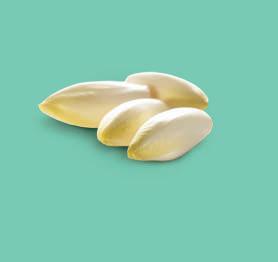
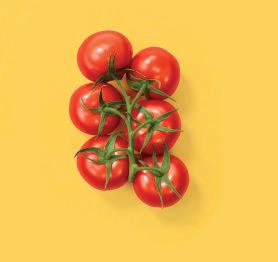


The vast Brazilian market has traditionally been dominated by pears from Portugal and Argentina, but the Belgian Conference is now winning over consumers in the country.
by Tom Joyce

The Conference pear was the focus of November’s Belgian Economic Mission to Brazil, with Belgian suppliers joined by Her Royal Highness Princess Astrid of Belgium and His Excellency Minister-President Diependaele of Flanders in meetings with Brazilian importers and retailers.
Since the Russian ban in 2014, Belgium has actively been seeking alternative markets for the Conference pear, with the opening of the Brazilian market in 2017 agreed at an auspicious time.
With a population of over 216mn people, Brazil imports approximately 225,000 tonnes of pears a year, and in recent years, thanks to online promotional campaigns and tastings by

cooperatives BelOrta and Belgian Fruit Valley, Belgian pears, led by the Truval brand, have started to make a dent in an export market traditionally dominated by Portugal and Argentina.
“With the eighth largest economy in the world, Brazil still faces challenges, but there is also a growing middle class that is increasingly showing interest in quality products,” BelOrta stated. “Because the supply of domestic pears is limited, there is a huge growth opportunity for the Belgian pear.”
With a population of over 216mn people, Brazil imports approximately 225,000 tonnes of pears a year
BelOrta has reportedly forged a partnership with a Brazilian retailer, with a commitment from both parties to improve logistics processes in Brazil and to share knowledge about harvesting, supplying and storing the fruit.
Campaigns for the Truvalbranded Conference have so far focused predominantly on the state of São Paulo, but the aim now is to expand to Rio Grande do Sul followed by other nearby states such as Minas Gerais, Rio de Janeiro, Paraná and Brasilia. E
The Belgian exporter continues to look at broadening its already substantial selection, while it also examines the potential of new markets, but competition across Europe continues to intensify.
by Tom Joyce
Belgian exporter Demargro already boasts a wide range of fruit and vegetables –the bulk of it strawberries, pears and tomatoes. But now it is actively seeking to widen that offer, not just in new products, but new berry packaging to maximise quality and shelf-life, and more specialities in the tomato category.
The cooperative’s main export markets are France, Spain and Poland, but it has also been looking at possibilities in new markets. According to the company’s Dominiek Keersebilck, competition remains intense, not least when it comes to the UK market. “We wanted to develop some exports to the UK,” he says, “but it’s difficult
We do not renounce our tradition, but we do not stay behind either. We bet on generational change, by giving a voice and opportunity to the youth.
Owners of the land.
Owners of what we produce.
“We wanted to develop our exports to the UK market, but it’s been difficult and very competitive”
and very competitive. We have the auction system, so the balance between supply and demand is there every day, and sometimes, as in recent months, prices can be reasonably high. But to explain that to a British consumer or customer can be very hard.”
Not that the UK is alone in this regard. The situation is similar in many markets. “Everywhere is competitive now, and the margins are not easy to find,” says Keersebilck. “Nor is finding the land to grow and the right people to do the work. Labour is a big issue. There are a lot of challenges at the moment. There are fewer tools in our toolbox, but the quality has to be better and you have to be fast but also flexible. As a company or cooperative, you have to find solutions to the challenges that are being thrown at you, and ultimately the ones that are the most creative will survive.” E


Scotland’s leading berry supplier hosted its yearly conference this month, celebrating 30 years of business and assessing the best path forward for its growers and partners.
by Tom Joyce
Scottish berry supplier Angus Soft Fruits held its annual conference on 14 November, in the heart of domestic berry production on Scotland’s northeast coast, welcoming its growers, staff and partners to celebrate the group’s 30th anniversary.
Traditional bagpipes, drums and ceilidh dancing concluded a day of discussions on the state of the berry category and the path forward for Angus Soft Fruits and its growers.
“I’m delighted to be here celebrating with you all,” said Jim Fairlie, minister for agriculture and connectivity in the Scottish government. “And there’s a huge amount to celebrate in this sector, both what Angus Soft Fruits has achieved over that time, and the achievements of the fruit sector in Scotland as a whole. That means not only our growers, but all those in different roles across the supply chain who have all played a crucial part in the sector’s success. The soft fruit industry has been a real success story for Scotland in the face of some significant challenges.”
Fairlie identified rising costs, labour and climate change as key challenges. Since the UK’s departure from the EU, he lamented, it has become harder to offer multiyear funding programmes to help overcome such issues.
“We are working to provide clarity on the Fruit and Vegetable Aid scheme from 2026 onwards,” he said. “We have no plan to change or scrap the scheme.”
BELOW—Angus staff celebrate the group’s 30th anniversary
RIGHT—Tom Harvey of premium UAE retailer Spinneys
BELOW RIGHT—Harvesting of the new Ava Monet raspberry variety

Following a period of high inflation, Kantar’s Lesley Ann Gray suggested lower inflation was starting to make households more comfortable, with premium driving growth in the FMCG sector.
Rabobank’s Cindy van Rijswick pointed to positive consumption trends in Germany and Netherlands, where berries were outperforming total fresh fruit sales. “Despite all the talk of healthy eating these days, consumers are not eating more fruit and vegetables,” she revealed, “but berries are still doing well.”
That growth is being driven by premium varieties, she said, highlighting the varietal change that is taking place across the segment. “In 2018/19 in Spain, the top three varieties accounted for almost 80 per cent of volumes,” she said. “Now it is less than 50 per cent.”
Lucy Wilkins, breeding programme director for the Ava Berries Breeding Programme, spoke about new raspberry varieties that have recently been launched, as
well as trials of new strawberry and blackberry varieties.
“This summer we launched two new raspberries, Ava Dali and Ava Monet,” she said, highlighting their reduced cost of production, faster picking speed, high yield and premium status. “They look amazing in the punnet, really helping with repeat purchases. There are trials to develop these varieties year-round.”
Trials are also underway in Huelva for two early strawberries in the standard-plus segment, Ava Alicia and Ava Catalina, she said, to add to the June-bearing Ava Magnum, one of the most popular strawberries in the UK premium market.
“We also have a new, lowchill strawberry called Bachata,” revealed Wilkins, “which is an early premium variety with long conical fruit and a good tolerance to powdery mildew. In addition, we are coming to the end of the selection process for three blackberries that we are really excited about. Our aim is to increase our special varieties from 20 per cent to 50 per cent of sales.”
said, “so why not berries? There are huge opportunities in Asia if we can gain access to markets like Vietnam and Thailand.”
Tom Harvey of premium UAE retailer Spinneys said that Angus was turning things around in the Gulf market after decades of dominance from Driscoll’s.
“Angus strawberries are the most expensive in the store, selling for around £11 for two punnets,” he said. “It’s the number one line at Spinneys, not just for fruit but for the total business. Out of around 27,000 products, Scottish strawberries account for 1 per cent of our total sales, which is incredible. At the moment we


Angus Soft Fruits managing director John Gray expects more and more volumes to be exported, to current markets like Japan and the UAE, as well as to new countries. “Scotland leads the way in UK food and drinks exports with whisky and salmon,” he
have exclusivity over the the Ava Magnum, so no other retailer in the UAE or Saudi Arabia has this variety right now. Next year we will also be offering the premium Ava Monet raspberry.”
The UK Agri-Tech Centre has a two-year collaboration with Angus Soft Fruits, and the group’s Claire Hodge
touched on various research projects being undertaken to address issues in the fields of sustainability, food security, disease pressures, and labour and productivity.
She said the centre was currently working on increasing strawberry quality and yield using precision pollination with Polybee drones; enhancing pollinator activity with acoustic technology; and early disease detection (in apple orchards) with hyper spectral imaging.
Angus grower James Porter revealed his farm at East Scryne had successfully trialled a robot from Saga, a company providing autonomous robots that use UV light to prevent powdery mildew in strawberries and grapes in the UK and US.
“In 2024, Saga treated 10 per cent of the UK strawberry market,” said the company’s Damian Flynn. “Now we’re doubling the acreage we’re doing with Angus, from 20ha this year to 40ha next year.”
Morocco-based Carlos Portoles expressed concerns about current production trends in the North African country, suggesting investments in new technologies were unrealistic for many producers.
“When a grower is already struggling to cover costs, it takes a lot of bravery to invest in new technologies,” he said. “We are worried in Morocco, as Hass avocados are taking over from strawberries. Three years ago, we had a production area of 3,800ha. Now we have 2,000ha. Berries are still grown in the old style, in the soil, and producers don’t really see the point in adopting new technologies.”
“The important thing about technology is it has to work for the grower,” stressed Flynn. “There’s no point in developing technology for technology’s sake. There needs to be a better understanding of the grower’s problems and economics, and deliver fast returns on investment.” E
Eastern European country could eventually supply more than 25,000 tonnes of the fruit to markets worldwide, says association president.
by Mike Knowles

Eastern European nation
Georgia has the potential to export more than 25,000 tonnes of fresh blueberries to markets around the world by 2028, according to the head of its national grower association. With a total production of more than 3,000ha, blueberries have certainly become a strategic product for the eastern Euuropean country. And following a successful export campaign in 2024, it is apparently ready to ship more than a thousand tonnes of fresh blueberries to markets in Europe and Asia in 2025.
Tornike Phanjavidze is president of the Georgia Blueberry Growers Association (GBGA) and CEO of leading producer-exporter Keystone Agro. He has spearheaded efforts to establish his country as a competitive player in the international blueberry market.
According to Phanjavidze, whose own company operates a 200-hectare blueberry farm, GBGA’s 20 member growers cultivate a combined area of more than 1,000ha. Around 80 per cent of that area produces mid- and highchill varieties that can generate the larger, crunchier berries with superior shelf-life that many international markets now require.The growers have successfully trialled premium varieties licensed from
LEFT—Georgia is set to export more than a thousand tonnes of the fruit this year
Sekoya and Fall Creek, introduced more efficient industry processes, and recently established a demo orchard in a higher-elevation area of eastern Georgia to extend the season until September.
The association’s collaboration with USAID has also played a vital role in helping to address production challenges, enhance local farmers’ expertise, and foster cooperation. Together, the partners helped GBGA members to export more than 500 tonnes of blueberries to European and Gulf countries in 2024.
3,000+ number of hectares of blueberry plants in the country
Just before the 2024 season, the association welcomed Shota Tsukoshvili, former manager of USAID’s berry value chain programme, as its new CEO. Tsukoshvili has emphasised the importance of putting Georgia’s blueberry industry on the global map, and his aim now is to make it highly competitive in international markets. E




























Commercial director Sergio Sainz explains why the company has started to intensify its varietal R&D efforts.
by Maura Maxwell
Sergio, how is the 2024/25 berry campaign shaping up?
Sergio Sainz: The forecasts for the new campaign are positive. The weather has been favourable during the planting phase, with rain and decent temperatures. This is an indicator that we can expect good quality, since the plant has not suffered in this first phase.






have slightly more fruit than last season and that we will be able to guarantee its quality throughout the campaign. We hope to continue growing together with our clients, while expanding our berry portfolio.
Have there been any big changes to your planting portfolio?
SS: Strawberries, our main crop, will see a slight increase in acreage




this season, while in the other berries our planted area is similar to last season. This differs from what’s happening in the rest of Huelva, where the planted area









ABOVE—Blackberries will be a prime focus of the company’s research
for raspberries, blueberries and blackberries has increased.
What major projects do you have lined up for the year?
SS: In 2016 we set up our R&D department to study new varieties, sustainable cultivation methods and new technologies and solutions to help us improve our production. We recently set up a trial farm to study varieties that we develop in-house, along with commercial cultivars, and the latest phase of this project is to open a new laboratory this season.
We believe that having our own varietal development programme gives us a commercial advantage by allowing us to differentiate our offer. Uptake of our proprietary blueberry variety, Cupla, is increasing every year and now we
are working on blackberries. The market is becoming more knowledgeable about our products and, therefore, more demanding. We need to be able to offer varieties that satisfy that demand.
Have you seen an increase in plantings of Cupla?
SS: Cupla is our star product in the blueberry segment. It is a sufficiently early variety that, with good management, allows us to satisfy the needs of our clients. Production of Cupla continues to consolidate itself outside of Huelva, and it is becoming be er known in the market.
What other investments have you carried out this year?
SS: We have opened a new blueberry packing facility to boost our processing capacity and allow us to provide a more efficient service to our customers. The company is also investing in new apps and AI-driven tools to facilitate communication within the team and provide us with the data to improve our quality control processes and make be er decisions in different areas of the business. E

David Johnston, lead agronomist at Plant Sciences Europe, discusses the berry breeder’s recent reorganisation and its focus on future growth.
by Mike Knowles
David, can you tell us a bit about the recent changes at your company?
David Johnston: From January 2025, Plant Sciences Inc and its related companies will represent to the market globally as Plant Sciences Genetics (PSG), spurred on by its broadening horizon of opportunity in the berry sector. At the same time, our operations in Europe and Africa have reached their 20th anniversary.
PSG offers a diverse range of competitive varieties developed over 40 years of careful selection. Those are strengthened by advanced techniques that ensure the production of high-quality, resilient plants that meet the demands of both growers and consumers.
As a leading plant propagator itself, and through its worldwide network of licensed nurseries, PSG and its valued partners work to ensure the distribution of premium plants, setting the standard for excellence across the global berry industry.
What kind of presence does it have in Europe?
DJ: Plant Sciences in Europe maintains significant growth for each of the geographical and clientfocused breeding programmes, although the company itself
is probably not as well-known in Europe as the berry lines it owns. Strawberries including Inspire, Victory and Arabella, and raspberries such as Majestic, are well appreciated by our grower clients and discerning retailers. Globally, PSG breeds and propagates strawberries, raspberries, blackberries, black raspberries and blueberries.
Our business in EMEA has quadrupled in the past eight years. This reflects both the importance of finding key berry varieties and then having nurseries and growers positioned to take these to market.
How would you sum up the business at the moment?
DJ: Our team in Europe is intrinsically enthusiastic about its role in the breeding and commercialisation of new varieties. We have experienced significant success in the last 12 years; we know what is in our test plots and our business model sees us working alongside companies that have a shared enthusiasm and a long working relationship with us.
How can the business cope with big challenges like cost inflation, climate change, and even geopolitics?
DJ: Our clients want to develop different ways to meet changing

needs, and varieties can provide the impetus to make that happen. We try to create fruit that offers consumers health and enjoyment, and if this can be done by developing varieties that need less water, fertiliser and labour, then we should.
What role can new technologies play?
DJ: There is a whole host of technical developments adding to our capabilities. Our in-house genomics team are delivering benefits from marker-assisted breeding, and for some key diseases we can achieve whole seedling populations with known disease resistance. Wherever the door is open for varieties developed by advanced breeding techniques, Plant Sciences has some novel and commercially interesting products at “close to market” stage. E

Chief executive Anna Jarema-Kuźniar says the company is on track for a strong year, and highlights the potential of the “forgotten superfood” chokeberries.
by Carl Collen
What is the mood at Green Best heading into 2025?
Anna Jarema-Kuźniar: As a fruit and vegetable trading company, we are starting the new year with great enthusiasm and ambitious plans. In response to growing customer demand, we are introducing new distribution channels, thanks to which our products will be more easily available to both wholesale customers and retail chains. We place particular emphasis on cooperation with local producers. The main pillar of our success is a team of people who pursue our goals with passion and commitment. We try to be flexible, but at the same time we do not lose sight of the values that define us – reliability, quality and responsibility.

“We managed to achieve ambitious sales goals and enter new markets, which significantly increased our reach”
What are your leading products?
AJK: Our key product is, of course, cauliflower. The second product we specialise in is peppers. We also work with other vegetables such as broccoli, tomatoes, and root vegetables in winter. In 2024, we exported more than 5mn pieces of cauliflower. That’s quite an impressive number.
Can you outline some of Green Best’s key values?
AJK: What is particularly important is the trust that farmers have in our company. We want relationships with our partners to be based on trust and mutual support. We regularly visit their farms to learn about their production processes and ensure that their products meet the highest quality standards. Thanks to this, we build not only business relationships, but also personal ones, which favours long-term cooperation.
TOP & LEFT—Chokeberries are a “hot topic” for Green Best, with further growth in the category expected

Where do you send your products?
AJK: It can be said that Polish vegetables are becoming more and more popular due to their increasingly better quality and taste. We export them to all EU countries. The key countries are undoubtedly France, the Czech Republic and Germany. The United Arab Emirates is also an area for trade talks.
Do you foresee growth in any particular category?
AJK: This will undoubtedly be in soft fruits, especially the chokeberry, which is a forgotten superfood that can be processed in many ways. The production of juices, jams and preserves from chokeberry is currently a hot topic for us.
Looking ahead, how well is Green Best set up for future success?
AJK: Our company is in very good condition. We managed to achieve ambitious sales goals and enter new markets, which significantly increased our reach and potential. These activities translate into stable growth, which gives us a solid basis for further investment and development. We look to the future with curiosity, diligence and great respect. E





Production of cranberries and other berry categories is on the rise at Fieldstone, driven by growing consumer demand for healthy options.
by Carl Collen
Polish berry group Fieldstone is looking ahead to the coming year with optimism. The family-run company grows raspberries, blueberries, blackberries and redcurrants, but is perhaps best known for its cranberry offering, standing as the biggest producer of the fruit in Europe.
In 2025 Fieldstone will further develop its growing methods and fruit preservation, enhance employee development, and increase production, according to Robert Bełdowski and Ewa Kowalska.
“We plan to grow our raspberries on another 7ha, mostly the Malling Bella variety, but we will be testing new varieties such as Malaika and Serena, which are commercially
LEFT—The berry market has enjoyed consistent growth in recent years
appealing,” Bełdowski and Kowalska tell Eurofruit. “At the moment we are very busy organising our brandnew plantation in central Poland where we will focus on blueberries and redcurrants but also organic fruit on a large scale, bringing us 35ha of further production.
agronomists developed a technique for cranberries that are biofortificated with iodine and selenium, which are so rare in our everyday diet.”
Fieldstone’s production has steadily increased over the past few years, Bełdowski and Kowalska confirm, as consumer demand for fresh, healthy products has grown. This has been particularly evident in the company’s export business, and last year 76 per cent of its goods were sent to key markets in the EU.
Fieldstone harvested and handled over 1,000 tonnes of raspberries, more than 600 tonnes of cranberries and over 200 tonnes of blueberries last year, while moving over 100 tonnes of redcurrants.
600over 600 tonnes of cranberries were harvested last year
“The berry business is currently in a strong and positive state,” they explain. “Over the past few years we’ve seen consistent growth in demand for fresh berries, and especially since the Covid-19 pandemic we have observed rapid changes in consumers attitude, becoming more health-conscious and seeking natural, nutritious snacks.”
Customers are looking not only for a great taste but also to source from those producers who add extra value – namely environmental awareness, high labour standards, and preservation that makes fruit safe.
“Additionally, we are excited to be the biggest cranberry producer in Europe and we will continue our efforts to master their production process,” they continue. “Our clients welcomed with great enthusiasm the news that our
“We are passionate about growing our berries by using biological methods that make our products safe, and this is what we are recognised for,” Bełdowski and Kowalska add. “In our opinion, those values will fuel the growth of the berry business, especially for those farms that are leaning towards the idea of bio products.” E



“Varieties are rigorously tested before they reach the market, so consumers find only top quality, and producers are rewarded”
Apple variety management company will focus on clubs, commodities and services to unlock value in the category.
by Mike Knowles
ABOVE—
Kiku Variety Management has rebranded as Adema after 25 years developing and managing high-quality apple varieties. The South Tyrol-based company unveiled its new corporate identity late last year at Interpoma, the binennial apple industry event, which takes place in Bolzano, Italy.
According to chief executive Jürgen Braun, the new company will continue to focus on club apples – including globally recognised premium variety Kiku and the snack brand Isaaq – as well as other trademarked commodities like Golden Parsi da Rosa, Alnova, and King Fujis. And its services division will cover research and development into new varieties, branding, and the creation of marketing and distribution concepts.
With a quarter-century’s experience in the international apple business, Adema’s goal is to identify new varieties and lead them to commercial success. “From the start, research and development have been at the heart of what we do,” Braun comments. “New apple varieties are rigorously tested in a global network and the selected varieties go through a strict approval process before they reach the market. That way, we can ensure that consumers will find only top-quality products on the shelves and producers are rewarded for their sustainable cultivation efforts.”
The development of branding and marketing concepts will also be a key part of the renamed company’s activities. “Through a vertically integrated approach, each step is strategically planned – from variety creation and product market readiness

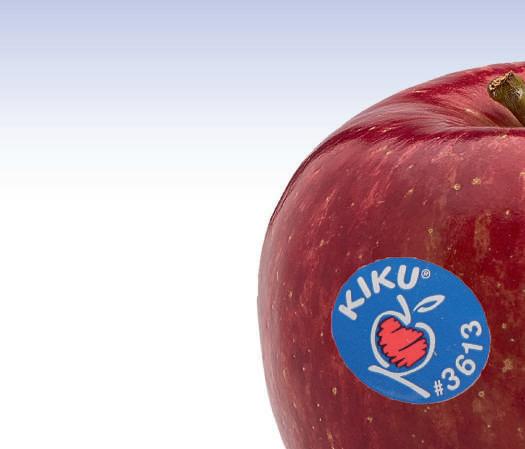




















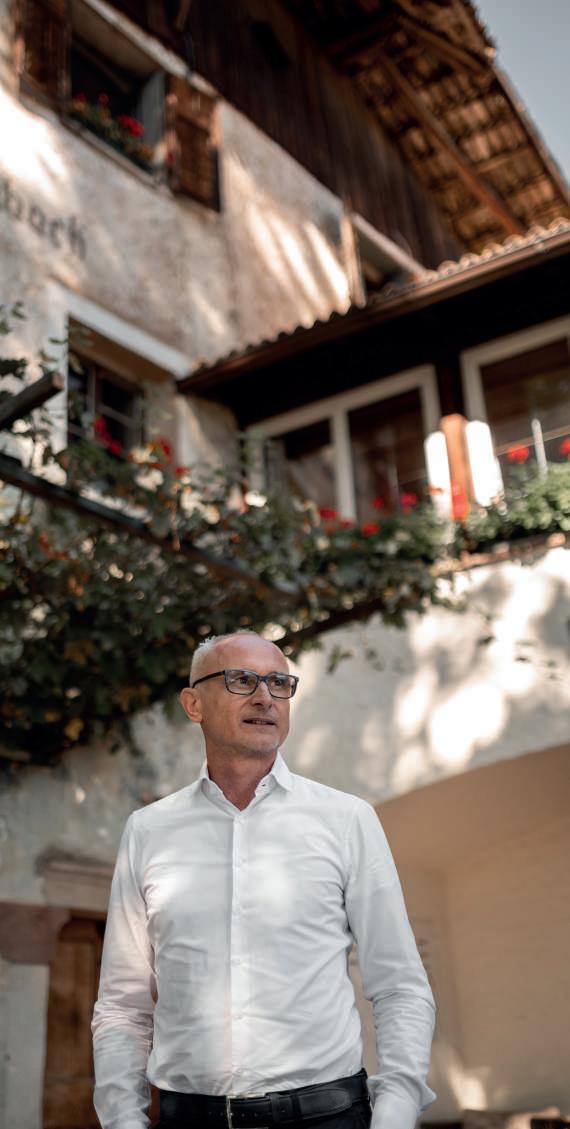
ABOVE—Braun says the group is constantly looking for new apple varieties that have excellent marketing potential RIGHT—Kiku remains a flagship product for Adema
“Authenticity is at our core: we act with integrity, living our values in order to build trust with those we collaborate with”
to shelf placement,” Braun continues. “This process includes the creation of technical manuals for fruit growers, marketing strategies, and global management.”
Adema’s mission is to unlock potential in the apple business, Braun points out: “We develop a selected apple variety for our customers and partners until it reaches market maturity. During that process, we continuously evaluate its potential.”
After a variety and brand are registered, Adema’s role is to develop a marketing and sales concept, and bring the final product to market. “Throughout this process, we prove ourselves as a globally acting, reliable professional partner with many years of expertise and industry-specific experience who acts with transparency and integrity,” says Braun.
Like Kiku Variety Management before it, Adema’s clients include not only breeders and tree nurseries but also farmers, cooperatives, and distribution partners, many of them active at an international level. According to Braun, the group’s focus might be on its B2B relationships, but Adema also keeps a keen eye on B2C opportunities.
“Our pursuit of innovation motivates us to introduce new ideas, methods, and products that create value and enhance existing processes,” he adds.
“We aim for excellence, consistently exceeding the expectations of our partners and clients. Authenticity is at the core of our operations: we act with integrity, living our values in order to build trust with those we collaborate with.” E

The company says it has made a number of major steps forward in terms of its environmental and ethical development goals.
by Mike Knowles

Processed fruit specialist Vog Products says it has made “impressive progress” on its environmental and ethical goals thanks to recent investments and improvements. In its latest sustainability report, entitled Staying Grounded, the company said it continued to focus on water and energy conservation during the period 2022-2024, as well as climate protection.
According to the report, the group reduced its water consumption by 28 per cent in just one year, expanded its
photovoltaic systems to an output of 1,777 kWp, and set up a new bee conservation project. Total Scope 1 and Scope 2 emissions were reduced by more than 3,000 tonnes CO2 equivalent, or 12 per cent, compared to the previous year, it said.
The report noted that it also further expanded its ethical standards and compliance measures and improved employee benefits for the long term. Payments to its grower members totalled €63.5mn in the last fiscal year, it added.
Italian apple company Vip has stepped up efforts to combat the negative impact of climate change throughout its production and packing processes.
According to Christian Gamper, the group’s organic quality manager, the effects of climate change in the Alpine region of South Tyrol, where the cooperative’s orchards are located, are more severe and rapid compared with other parts of Italy.
“Since 2017, we have observed issues such as fluctuating production cycles with increasingly variable yields, the spread of woolly aphid infestations, and early blooms often followed by late frosts,” he explains.
Vip has collaborated with the Laimburg Research Centre and South Tyrolean Variety Innovation Consortium for several years to develop varieties that are increasingly tolerant to pests, fungal diseases, and warmer climates, as well as new rootstocks. “Thanks to this research, 30 per cent of our organic varieties, including Topaz, Bonita, SQ159-Natyra, and Pinova, are already resistant to apple scab,” says Gamper.
Vip believes robust experimentation will be crucial. “While we look to the future, we are also acting in the present,” Gamper continues. “Many organic orchards are equipped with frost irrigation systems and hail nets, which also serve a shading function.”
“For us, our members and our producers, sustainability is neither a trend nor an obligation. Instead, it is part of the farming identity,” said chairman Johannes Runggaldier.
CEO Christoph Tappeiner said the company’s sustainability efforts would continue. “With the goal of shaping a sustainable food future, we will maintain our commitment to reducing our environmental impact,” he said. E
PICTURED—Vog Products aims to be a pioneer in sustainable agriculture
The Italian supplier has invested in a new marketing campaign to boost demand for its Exotic Red variety.
by Mike Knowles
Italian kiwifruit marketer
Jingold has undertaken a major advertising campaign in Germany to promote its Exotic Red variety. The initiative, which ran until 8 December, involved several of the country’s major retail chains, as well as online activities designed to engage shoppers.
The campaign featured vibrant in-store displays with heart-shaped tags that emphasised the kiwifruit variety’s unique qualities, including a sweet, tropical taste and redfleshed core.
“This campaign marks an important chapter for Jingold and for the Exotic Red kiwifruit in Germany,” says Federico Milanese, the group’s marketing manager. “It was a great opportunity to let German consumers taste the product, and the feedback was excellent. We are sure that promotions of this type will
allow us to encourage kiwifruit consumption on the one hand, while at the same time making our innovative red-flesh variety known and appreciated by an increasingly wider audience, in Germany and also in the rest of Europe.”
For Milanese, the new campaign is just the beginning, with similar marketing projects due to take place in Italy, France, Spain and other European markets, as well as in China and Brazil. “These will help Exotic Red increasingly to establish itself as the reference leader for the red-flesh variety at an international level,” he adds. E
One of Italy’s largest fresh produce cooperatives says it is better equipped to defend itself against potential cyberattacks after implementing an extensive IT upgrade across its three major packhouses.
Agrintesa worked with technology specialist VEM Sistemi to review and strengthen computer systems and networks at its main production site in Faenza in the province of Ravenna, its cherry packing facility in Castelfranco Emilia, Modena, and its organics operation in Zevio, Verona. The complete refit of its digital infrastructure is expected to make the group faster and more resilient when it comes to communications and data management. “The cooperative’s strong growth in recent years, together with numerous acquisitions, mean Agrintesa had a social structure united under a single brand, but fragmented from the point of view of its technological infrastructure, with different working methods and procedures in the different companies,” says ICT director Alessandro Collina, who adds that new IT investment will also ensure the company’s management and operational processes are even more secure.
“This marks an important chapter for the Exotic Red kiwifruit and a great opportunity to let consumers taste it”



Colombia’s leading exporter of passion fruit is making inroads in Europe and other global markets.
by Maura Maxwell
Colombian exotics specialist
Ocati is investing in new capacity to handle growing demand for its products on the international market. The company has been exporting exotic fruit from the Andean nation for more than 36 years and in that time has built a reputation as one of the country’s leading suppliers of passion fruit.
“We are in the process of expanding our packing plant to improve our operational capacity and efficiency in fruit processing. This will allow us to optimise our response times and ensure greater freshness in each shipment,” says Daniela Vesga, Ocati’s export market analyst.
As well as its own production, the company works closely with a network of more than 350 growers in different regions of the country that enables it meet high levels of international demand.
As a specialist in passifloras, Ocati boasts a diverse portfolio which includes purple passion fruit (gulupa), the yellow-orange granadilla and maracuyá, and Honey Passionata, a sweeter variety originating in Peru, in addition to other exotic fruits such as physalis, curuba – also known as banana passion fruit – pitahaya and feijoa, among others.
“On average we export 80 tonnes of fruit a week, rising to 130 tonnes during the high season, making us
the biggest passion fruit exporter in the country,” Vesga says. “Europe is our main market but we are also expanding our presence in the Middle East, Canada, Brazil, and the US.”
Vesga says purple passion fruit is gaining popularity amongst European consumers thanks to its versatility and unique flavour.
“This has been partially driven by its use in the foodservice industry, especially in cocktails, although in countries like France and Sweden consumption of fresh passion fruit is also very high,” Vesga explains, adding that she believes there is still plenty of room for growth in the market.
“Consumer education about the benefits and uses of this fruit is the key to further boosting demand, while marketing strategies that highlight the fruit’s versatility are also useful,” she continues.
Thanks to its unique climatic conditions, Colombia can produce passion fruit throughout the year. There are two production peaks: one in December and the other in the summer, where the largest amount of exported volume is concentrated. Another key advantage the country has is that it can export purple passion fruit by sea, making it more affordable for consumers.
“Currently, we only export purple passion fruit and physalis by sea, as we have found that
“On average we export around 80 tonnes of fruit a week, rising to 130 tonnes in the high season”
granadilla and maracuyá do not maintain the same shelf-life when transported by this route. Therefore, we continue to export these varieties by air to ensure their freshness and quality,” Vesga says.
The company is also working on strengthening its sustainability strategy in packaging, in order to adapt to the needs of different markets. E
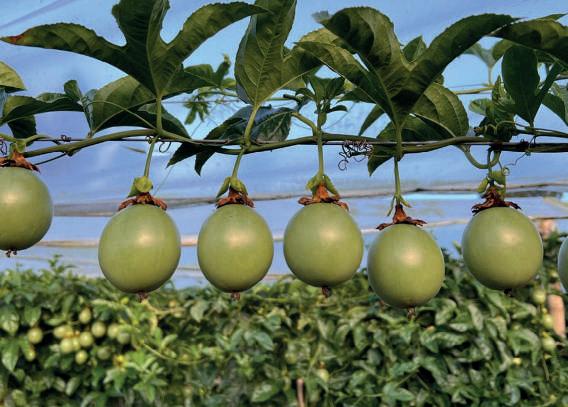
ABOVE & RIGHT—
Ocati has built a reputation as being one of Colombia’s leading suppliers of passion fruit
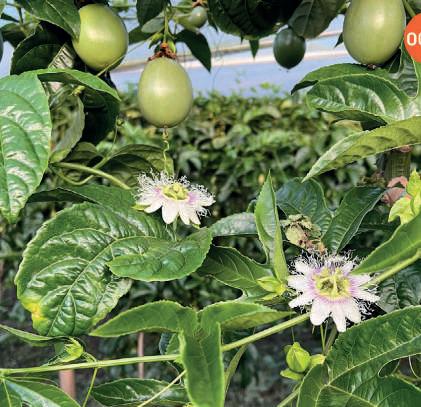










BERLIN 5|6|7 February
FRUIT LOGISTICA 2025 HALL 7.2A | ROOM 1


• Open forum in the exhibition halls – Free of charge to all • 10 sessions of 30 minutes each on fair days
• AI Translation: German, English, Spanish, French, Italian





Visit FRUIT LOGISTICA, learn about the latest trends and be inspired by high-ranking speakers.




MESSE BERLIN GmbH Tel +49-(0)30-3038-0 fruitlogistica@messe-berlin.com
FRUCHTHANDEL MAGAZIN Tel. +49-(0)211-9 91 04-40 anzeigen@fruchthandel.de
Australia’s Perfection Fresh has global ambitions for its Calypso mango variety. International business development manager Henry Robertson outlines the company’s growth plans.
by Maura Maxwell
Henry, could you start by giving us a brief overview of Calypso’s evolution so far, and what its appeal is to grower and consumers?
Henry Robertson: Calypso has been enormously successful in mango-loving Australia. It has achieved a market share of over 35 per cent in a country where half the population buy mangoes and per capita consumption stands at more than 2.6kg. We put its success down to several factors but fundamentally it is a variety that works equally well for consumer, retailer and grower, providing quality and consistency.
The key attributes of the fruit for a consumer are that it has a small seed and large fleshy cheeks, so you get more mango for your money. It has a smooth tropical taste, with hints of coconut and no fibres, so no strings getting stuck in your teeth. Finally, it has a firmer flesh and therefore a better home life – and it holds up in multiple applications. All these factors drive repeat purchases.
For a retailer, Calypso is a great looking pinkblushed fruit, supporting its premium standing. It has a long shelf-life, even when ripe, meaning properly ripe fruit can be merchandised, while price reductions and waste are far lower than other varieties.
Finally, for the grower it is a reliable annual bearer with impressive yields, a high premium percentage and strong disease. Plus the trees are small, making it easier to harvest.
Where is the variety being grown currently and in what sort of volumes?
HR: The variety is primarily grown in Australia where annual production is over 20,000 tonnes. Our

international expansion started about four years ago. Mexico is still a new venture for us [Perfection Fresh recently supplied US retailer Whole Foods with the first Mexican-grown Calypso mangoes from Sonora-based Campos Borquez], and we are planting a large orchard this year with our partners. We also have a trial in Peru, have recently planted in Portugal and have plans to trial the variety in Spain and Italy in early 2025.
Outside Australia, what are your biggest markets for Calypso?
HR: Right now our biggest export markets are South Korea, China, Singapore, Hong Kong and New Zealand.
How do you plan to develop your business in the US?
HR: We are selectively partnering with retailers with a high proportion of shopping within the premium segment. Calypso is
a premium mango. Whole Foods has been extremely supportive of the project and we look forward to repaying its faith with a great product, long into the future. Our partner, Campos Borquez, won the Whole Foods Supplier of the year award in 2021 and its ESG credentials are world class. We are planning to grow organically, regeneratively and Fairtrade with Campos Borquez.
What about the European market?
HR: Our development in the US is further along but Europe is also a key priority for us – so much so that I am currently based in the UK. The journey is in its early stages, but we have formed a great relationship with Viveros Brokaw in Malaga who is our European propagation licensee for Calypso. They are doing an excellent job.
We are particularly keen to support European growers as new regional opportunities open up in various microclimates. We have already planted in Portugal and

have trials planned in Spain and Italy early next year. To develop the 12-month supply, we have also been speaking to a number of growers in Africa, South America and the Caribbean. Our priority is to find the right partners, not the biggest number of partners, who are the right fit to build the brand together.
Timing-wise, Calypso has a good window in the US as it arrives when the mango category is typically undersupplied. Is the same true for Europe?
HR: It is a good window but with every good window, there are always underlying reasons why they are undersupplied, so we need to be prudent. It is also a great way to get rapid brand exposure. But our priority in Europe for now is to find the right partners where we can build a solid 12-month supply model that delivers the quality and consistency that should be expected of a global brand.
Unlike other fruits, the mango category isn’t typically known for its abundance of consumer brands. Why do you think Calypso has what it takes to become a truly global consumer brand? And do you think more generally that there is an opportunity to develop more consumer brands in this category?
HR: If you look at some of the most successful fruit brands they all deliver on quality, consistency, availability and effective marketing. We’ve built the Calypso brand with all the necessary elements to create a loved consumer brand – unique and distinctive product elements (as mentioned earlier) as well as the distinctive Calypso blue used on the trays and sticker and its “cheeky” tone of voice.

“Calypso’s success is down to many factors, but fundamentally it works equally well for grower, retailer and consumer”
We also invest in driving consumer awareness and driving preference for Calypso along the entire path to purchase from out of store to online and in-store. Shoppers can connect all the dots at shelf and understand and value the superior experience of Calypso mangoes. We at Perfection Fresh Australia, have a 45-year history of effectively delivering and marketing successful fruit and vegetable brands, so the final piece for us is finding the right partners to deliver on the availability. There is definitely an
opportunity to develop more consumer brands in fresh. The main barrier, aside from retailer restrictions, has generally been the variable and perishable nature of fresh fruit. It’s a huge undertaking to develop a global brand in fresh but we believe we have the variety to deliver on it. E
OPPOSITE PAGE—Perfection Fresh is focused on building 12-month supply of Calypso
ABOVE LEFT—Henry Robertson
ABOVE RIGHT—Calypso’s attractive pinkblush appearance is a hit with retailers
Through a focus on transparency, quality and long-term partnerships with producers, the German trade development group helps bridge the gap between smallholders in developing regions and European markets, says IPD’s Thomas Derstadt.
by Tom Joyce
Sustainability in sourcing is no longer a buzzword; it’s a vital part of the agricultural industry, especially when it comes to fresh produce. This issue is front and centre for many importers, and the Import Promotion Desk (IPD), based in Germany, has become a key player in supporting sustainable sourcing practices.
Through its dedication to transparency, quality standards and long-term partnerships with producers, IPD is helping bridge the gap between smallholder farmers in developing regions and European markets, according to Thomas Derstadt, sourcing and markets expert at IPD.
“We are, in essence, a middleman, but a good one,” says Derstadt. “We’re not charging either side, and we strive to bring more transparency into the process.”
According to Derstadt, IPD’s impartiality enables buyers in Europe to trust that the growers they’re sourcing from meet the highest standards, both in quality and sustainability. The process starts with thorough due diligence, with IPD working closely with local business support organisations, consultants and farmers to ensure producers are ready to meet the demands of European markets.
work with random traders, you’re likely to face problems, which in turn can damage the image of the whole country.”
He cites Kenya as an example, where smallholder farms are prevalent. While these farms can be highly productive, working with them requires stringent protocols and oversight. “You need companies that are serious about adapting and implementing controls, so you can ensure the quality and sustainability of what they’re producing,” he adds.
IPD’s approach is centred on empowering producers, especially those in countries where exporting to Europe might seem daunting. By providing training in areas such as corporate social responsibility (CSR) and environmental, social and governance (ESG) practices, IPD supports farmers not only in meeting the necessary standards but also in developing long-term strategies for growth. “We want to make sure our partners are not just compliant with European market demands but are also improving their internal processes for sustainability and worker welfare,” Derstadt explains.
“You need companies that are serious about implementing controls, so you can ensure quality and sustainability”

One of the main challenges IPD faces is selecting the right partners. “It’s not just about finding a supplier; it’s about finding the right supplier,” says Derstadt. “If you »
For example, IPD provides training on how to create CSR plans and guides producers through the initial steps of obtaining social certifications.


“This is part of our motivation and identity as an organisation,” says Derstadt. “But it’s also beneficial for the producers because these certifications open up new markets and help them build a stronger reputation.”
Logistics is another area where IPD’s support is invaluable. Issues such as the long transit times through the Red Sea, as seen with Kenyan products, can pose significant challenges. The situation has been further complicated by global issues like climate change, which can affect crop yields, and geopolitical events, such as the ongoing war in Ukraine, which has disrupted supply chains in certain regions.
While IPD doesn’t directly handle logistics, it plays a critical role supporting buyers in
navigating these issues. “We can advise on how to diversify supply sources to mitigate the risks posed by logistical delays or other disruptions,” says Derstadt. “In many cases, buyers are looking to broaden their supplier base. They realise that relying on a single source is no longer viable in today’s unpredictable world.”
For instance, countries like Morocco, Peru and Egypt are becoming increasingly important to European buyers who in the past might have relied more heavily on Spain and Italy. “We work to ensure that suppliers from these countries are well-prepared and have the necessary certifications,” Derstadt points out.
Sustainable sourcing goes beyond environmental factors - it also includes social responsibility, and
Derstadt says IPD helps ensure its partners comply with fair labour practices and are working toward improving wages and working conditions.
“We don’t conduct full audits, but we do initial checks to make sure basic labour standards are being met,” explains Derstadt. “We also provide training in ESG and CSR, which helps these companies start thinking about their impact on workers and the environment.”
Through its targeted programmes, he says, IPD is helping to create a more sustainable and transparent supply chain that benefits all parties involved — from the farmers on the ground to European importers and, ultimately, consumers.
“At the end of the day, our goal is to create a sustainable market that works for everyone,” concludes Derstadt. “That’s the future of sourcing.” E




With issues in the Red Sea disrupting Egypt’s exports to Asia, analysts had predicted a glut of oranges on the European market. But the opening of new juicing facilities in the country could potentially revive the market.
by Tom Joyce
The start of the orange and mandarin export season is highly controlled in Egypt. It is determined by the country’s Agricultural Export Council (AEC), which officially announced the start of the current season on 1 December, when the first shipments departed.
Egypt is now preparing for an “exceptional” orange season, according to Khaled AlHabouny, operations director at AlHabouny Group, promising stable production and an increase in volumes over last year. “Favourable weather conditions have led to an abundance of high-quality oranges and increased sizes compared to last season,” he says. “The current fluctuations between night and day temperatures, with cold nights and increased temperature differences, have created ideal conditions for our oranges.”
These conditions enhance the size and strength of the fruit, he reveals, and this also helps to create a uniform colour and reduce the risk presented by fruit flies. “These favourable conditions ensure that we provide our customers with high-quality oranges that meet the highest standards of taste and appearance,” he says.
Demand for Egyptian oranges is currently high, according to AlHabouny, especially in markets such as Russia, Saudi Arabia, the Netherlands and the UAE. Based in Novorossiysk, Russia’s largest port, Denis Logvinenko of Egyptian exporter Egast, says exports of Egyptian citrus to Russia have been on the rise. “And not just to Russia,” he reveals, “but to all the ex-Soviet Union countries, including Kazakhstan, Uzbekistan and Azerbaijan.”
Sanctions on Russia since its annexation of Crimea in 2014, and the Russian embargo that followed, have limited import options for companies. According to Logvinenko, Russian importers are glad to be able to work with Egyptian companies. “The quality of Egyptian citrus is very good, especially the oranges,” he says.
“Bad weather conditions and recent floods in Spain have also increased demand for Egyptian oranges in Europe,” resumes AlHabouny. “The adverse weather conditions in Spain have significantly reduced its orange production, creating an opportunity for Egyptian exporters to fill the gap in the European market. As one of the world’s largest exporters, Egypt is working to expand its export markets, especially to key regions such as Europe, the Middle East, Russia and Asia.”
Assistance from the government has been key to the success of the category, AlHabouny believes. “The support of the Ministry of Transport and the Maritime Transport Sector has facilitated the transportation of agricultural products from Egypt’s Damietta Port
»



to the Italian port of Trieste and therefore the rest of Europe,” he says. “This reduces the time and cost of transporting Egyptian agricultural products, while addressing the issue of vacancies during peak export periods from November to January for some products, maintaining the quality.”
Juice industry takes off Egypt may traditionally be better known for its fresh orange exports, but its growth in the juicing sector, driven by growing demand and a shift in production trends, has the potential to change the European market in terms of pricing, supply and demand.
Omar Elnaggar, a stalwart of the Egyptian fresh produce industry, recently took on a leadership role at Sahara for Fruit Processing, a new startup orange juice producer. The company is planning to operate a large-scale juicing facility that is capable of processing 150,000 tonnes of
oranges is different from fresh, but they represent 25 per cent of the production of an average field in Egypt. The prices are also quite tempting, and some of these juicing factories are going to be increasing their prices and buying better quality to gain a bigger market share.”
Egypt now has an opportunity to position itself as an alternative to Brazil, the global leader in orange juice production. And, according to Elnaggar, its rising prominence in the juice market could create ripple effects in Europe, particularly in terms of pricing and market share. With Brazil set to face a further challenge from the spread of the HLB (Huanglongbing) virus – a disease that has decimated its citrus orchards and affected juice yields – buyers have started seeking alternatives.
Whereas Brazil produces oranges year round, Egypt’s seasonal production runs from
“The quality of juicing oranges is different from fresh, but they represent 25 per cent of the crop in an average field in Egypt”
oranges annually, and to produce 14,000 tonnes of orange juice concentrate.
This shift is part of a broader trend in Egypt, according to Elnaggar, with a handful of new juicing factories under development, and existing ones ramping up production.
“By the beginning of March 2025, Egypt will have double the number of factories it had in 2024,” says Elnaggar. “And others will imitate this business model. So this will have an effect on supply and demand of oranges and prices. The quality of juicing
November to April. For that reason, Egypt is increasingly seen as a viable ‘plan B’ for many European buyers, says Elnaggar.
He also points out that the gap between the price of juicing oranges and fresh fruit is shrinking. “While juicing oranges were once significantly cheaper, this price difference is narrowing as demand for juice rises,” he says.
“This shift could make it more economically viable for Egyptian producers to sell their lower-grade fruit to juicing factories rather than relying solely on the fresh fruit market.” E












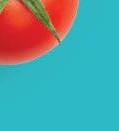





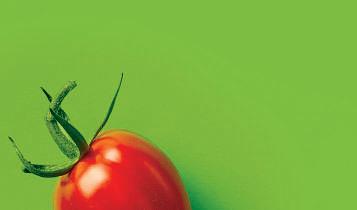






















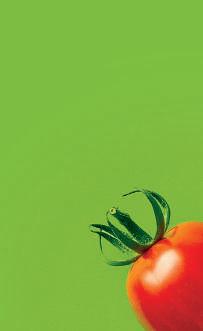



In the face of today’s plethora of challenges, Turkish exporter Alya Fruits continues to be focused on quality, innovation and expanding its global reach, says CEO Ceyhun Gündüz.
by Tom Joyce
Alya Fruits, a Turkish exporter based in Bursa, is doubling down on quality, innovation and sustainability, according to CEO Ceyhun Gündüz, as it navigates a rapidly changing market landscape.
levels,” says Gündüz. “Our investments in production have reached maximum capacity, and we’re putting a lot of effort into improving shelf-life. Blueberries are a rapidly developing product for us, and we’re particularly
The Turkish fig season this year presented both opportunities and challenges, according to Gündüz. Despite a larger harvest than in previous years, the early start to the season created difficulties in some markets.
“The fig campaign started with a disadvantage this year due to early ripening caused by the weather,” he explains. “Early seasons are always tricky for black figs, and we saw a season that began early and ended earlier than expected. Some countries saw lower demand due to holidays, and that affected consumption.”
Despite these challenges, Gündüz remains bullish on the potential of the Asian market, a region where Alya Fruits has long focused its efforts.
“The Asian market has always been our target,” he says. “The demand for high-quality, fresh products is strong, and we’ve seen steady growth in countries like China and Japan. But you can’t just focus on quantity – you need to offer the best service, the highest quality and be able to respond quickly to market demands. That’s what sets us apart in the Far East.”
Alya Fruits enjoyed a strong cherry season, with volumes doubling compared with the previous year. According to Gündüz, the company was able to capitalise on an early cherry season in the Northern Hemisphere.

The company has been investing heavily in blueberry production over the past four years, and Gündüz is confident that it is on the verge of realising its full potential.
“We’ve been focusing on blueberries with the aim of raising the quality to the highest
focused on penetrating the East Asia market, where we see tremendous growth opportunities.”
The company’s approach to blueberries is not just about quantity, he said, but ensuring the product can meet the exacting standards of international markets, especially in Asia.
“The cherry season went much better than we expected,” says Gündüz. “We took advantage of the early start to the season and saw significant growth in our export volume. It’s always a positive when you can double your output, and we’re excited about the results.”
As climate change continues to affect agricultural production worldwide, sustainability is becoming an increasing priority for Alya Fruits, according to Gündüz. Turkey, in particular, is seeing shifts in weather patterns that pose challenges for crop cultivation.
“Climate and sustainability are becoming more important with each passing year,” he says. “The natural balance that we rely on for agriculture is shifting, and
ABOVE—The last cherry campaign surpassed expectations at Alya Fruits, with volumes doubling OPPOSITE PAGE—CEO Ceyhun Gündüz






these changes make it difficult to plan for the long term. We have to adapt, and we’re learning to adjust to these new conditions. But I’m optimistic – every challenge brings new learning experiences, and we will continue to find ways to make


our operations more sustainable.”
Another pressing issue facing Turkish exporters is the rising cost of doing business. Gündüz points to high production costs and unstable exchange rates as two of the biggest hurdles.
“These factors are eating into our profits every day,” he says. “We’re managing to cope for now, but it’s a difficult situation. We need to find a way to bring costs under control if we want to stay competitive in the global market.”
Alya Fruits is investing in greenhouse-grown vine tomatoes and baby avocados, says Gündüz, two products seeing increasing demand internationally.
“We’re focusing on vine tomatoes, which are grown in controlled greenhouse conditions, allowing us to offer a higher-quality product,” Gündüz says. “Currently, we export primarily to the UK, Europe and Russia, but we’re also looking at new markets..”
As for baby avocados, the company has been steadily increasing production. Gündüz says that after years of innovation and development, baby avocados are now a growing part of Alya’s export portfolio.
“This product is still relatively new, but the demand is growing rapidly,” he explains. “What started as a smallscale operation four years ago with just 10 tonnes is now over 100 tonnes. The quality is exceptional, and customers love the taste. We’re expanding production and making this a sustainable part of our business.” E









































Harvest predictions are good, but it is mostly events away from the farm and beyond the control of growers that could impact the business in 2025.
by Fred Meintjes
Afast-changing political world is shaping up to present new challenges for the South African fresh produce industry. Fruit farming is a longterm business, and changes in the world that growers operate in have a big influence on the future they can forge for themselves.
In terms of production, South Africa is in an era of strong growth. The citrus industry, the largest of the country’s fresh produce sectors, is currently leading the way, and is still on track to grow exports rapidly during the next ten years. The apple and pear industries are in the process of transforming from older varieties to the best the world can offer. The same is happening in table grapes, and while growth in stonefruit is expected to stabilise in the years ahead, avocados are on the brink of entry into new markets which will boost production. Then there are berries, which are destined to become a rising star in the country’s basket of fruit products.
From the outside it all looks very positive. In the international arena, political change is likely to pose challenges though. The biggest of these are how the country deals with the next Trump presidency in the US, whether the citrus industry can resolve its dispute with the European Union, and if the business can continue to gain market access in the fastgrowing consumer markets of the world.
BELOW—The apple and table grape industries are moving towards newer, in-demand varieties
OPPOSITE TOP—Citrus exports are forecast to grow rapidly over the coming decade
OPPOSITE BOTTOM—Things should remain stable for the stonefruit business


South Africa is not exactly flavour of the month in Washington, given its close association with BRICS countries such as China and Russia. This may affect the country’s position as a beneficiary of the African Growth and Opportunities Act, which allows fruit growers to ship their fruit free of tariffs into the US. South African citrus growers in the western parts of the country annually ship around 110,000 tonnes of their Summer Citrus fruit to the US. Increasingly, stonefruit and table grape growers are also focusing their efforts on expanding sales there.
The long-standing dispute with the EU is costing the South African citrus industry billions of rand, and this will require special initiatives in 2025 to finally resolve itself. The EU and the UK remain very important marketing areas for South Africa – and it is likely that everything possible will be done to retain the country’s position in those traditional markets.
South African growers will have to deal with climate change and
It is perhaps in the Far East and Southeast Asia, as well as in the US and Canada, where much focus will lie in 2025 in terms of export growth. Geographically, South Africa is in an ideal position – at the crossroads of world shipping routes – to supply all these markets. If only politics could be kept out of the fruit business.
Exporters will also hope that the turnaround at the country’s ports continues, and that fruit logistics will improve across South Africa.

There are promising signs, which are also fuelled by new optimism in the country since the emergence of a government of national unity, which assumed power in May 2024.
In facing challenges on the farm, South African growers will have to deal with climate change and unpredictable weather. Vast areas are already covered by netting and plastic to not only improve production, but also help guard against unseasonal rain. Ongoing research into better practices which will lead to better yields are playing a big role in improving returns.
South African growers are among the most dynamic in the world when it comes to planting improved varieties. The table grape offer is now dominated by a range of varieties that are not only working on the farm but are also in demand at consumer level. In the apple and pear sector, exciting new varieties, such as new Gala types and blushed pears, are slowly displacing the older offer.
Exciting branding initiatives, for example the full red Gala Bigbucks, which is branded as Flash Gala, and the Sun World brand Autumncrisp, are being embraced by South African growers. In citrus, the ClemenGold brand has won

international awards in recent times. The avocado industry is also entering extremely exciting times. This is due to markets in India and China opening last year, with 2025 marking the first full year of trading. South African avocados can also now be shipped to Japan – and these new developments will further boost confidence in the sector.
With citrus production expanding, along with table grapes, apples, avocados and blueberries, there are exciting times ahead for the South African fruit sector. One has a feeling, though, that in 2025 events away from the farm may again intervene, and could possibly disrupt some of the fresh produce industry’s best laid plans. E

Ambitious conventional reefer shipping programme brings a new dimension for the country’s fruit exporters.
by Fred Meintjes
The South African fresh produce export sector has suffered significant losses over the past few years due to the poor performance of the country’s logistics system, particularly its ports.
While there are signs of improved efficiencies at container terminals, many in the industry expect the situation to remain difficult through most of 2025.
According to Hortgro, there has been progress at the Port of Cape Towns and Transnet’s commitment to continuing this process is encouraging. However, industry representatives caution that the impact of these improvements will only fully materialise over the medium to long term.
Meanwhile in Durban, the industry hoped that the new Transnet joint venture at Container Terminal Pier 2, announced in 2023, would by now be operational. But International Container Terminal Services Inc (ICTSI)’s
agreement with Transnet has been thrown into disarray following Maersk’s decision to challenge the deal in court. This dispute will not be resolved until the new citrus campaign has started, with implementation expected to take some time.
In the past, delays at Cape Town – which is also affected by strong winds in the mid-summer period –have held up fruit to such an extent that, in some cases, shipments arrived 20 days later than they would normally.
The export industry has responded with innovative solutions, such as logistics models and the use of alternative ports – but this has come at great cost to growers. More recently, an ambitious conventional reefer shipping programme between Cape Town and European and UK ports has assisted grape and stonefruit exporters. It operates from the multipurpose terminal in Cape Town and is designed to relieve
The citrus sector has consistently argued for an accelerated programme of privatisation for the main port infrastructure
pressure on the container terminal.
For Cape growers the country’s eastern coastal ports are the only alternative to Cape Town’s container terminal. Despite improvements, it still leaves the export industry vulnerable heading into 2025.
The citrus sector has consistently argued for an accelerated programme of privatisation for the main port infrastructure. This is why there is much disappointment about the dispute surrounding the Durban Terminal.
The extended conventional reefer programme operated by Anlin Shipping, agents of the Reefer Alliance, reminds us of the heyday of reefer shipments during the last decade of the previous century. Charles Gantz, CEO of Anlin Shipping, says the programme is expected to run to at least mid-March, with three two-weekly direct shipments to Russia between weeks 3 and 9. This is more expensive, but provides quicker delivery to the UK and Europe. E
TOP—
Delays at the Port of Cape Town have held up fruit shipments in recent years
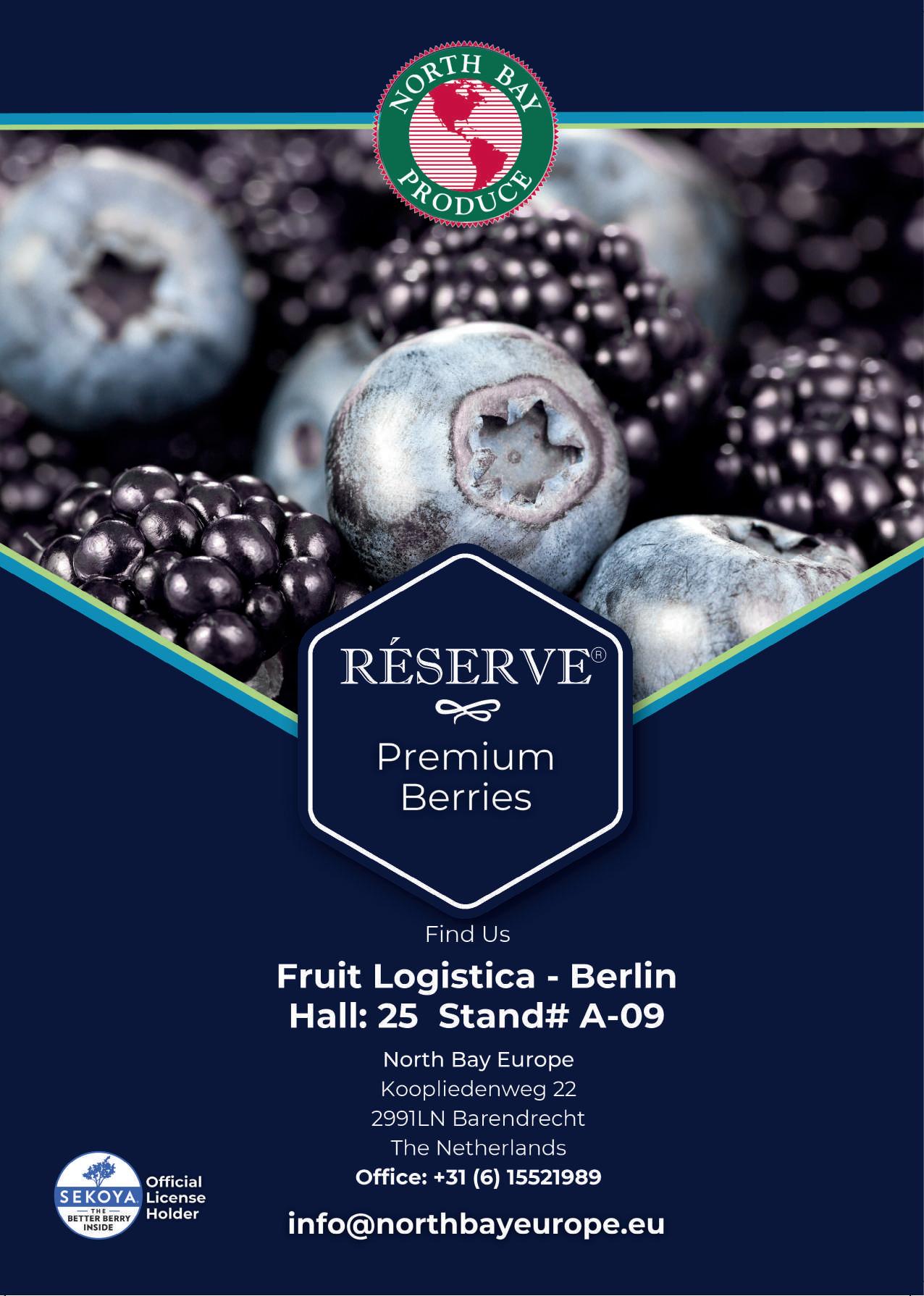

Good weather and warm temperatures in South Africa’s early grape growing regions point to strong export volumes this season.
by Fred Meintjes
The South African table grape industry is still on track to reach its target of between 76.4mn and 78.7mn export cartons this season, which will be a similar level to last year.
Interesting trends are emerging, though, in terms of market supply, which could influence the industry’s future strategy. Statistics for the 2024 season show that the EU and the UK remain South Africa’s biggest markets, receiving 77 per cent of last year’s crop.
Canada is now South Africa’s third biggest export market and despite focused programmes to boost sales in China and Hong Kong, the
volume exported to those countries last year was 46 per cent lower than in 2020.
It is expected that distribution will follow the same trends in 2025, with perhaps even more focus on growth in North America.
“South African growers and exporters now know how to deal with the tough US phytosanitary requirements, following years of dealing with this in the East,” says Hex grower Anton Viljoen. “Increased exports to North America will also help us to reduce pressure on the EU and UK markets, where supplies are sometimes higher than the market
requires in the late season.”
There is no doubt that traditional markets will again determine the fortunes of South African growers this year. Industry body Sati has previously stated that the country will continue to build its image as one of the world’s leading suppliers of table grapes. Much effort is therefore being placed on quality and appearance, and supply programmes that will meet customer requirements.
In 2025 one can again expect growth of new and preferred varieties, which are among the
ABOVE—Exports are expected to remain stable this season
OPPOSITE—Arra Cherry Crush




most coveted in the world. While the red seedless variety Crimson Seedless is still the leading cultivar, Sweet Globe, a white seedless grape and Sweet Celebration, also a red seedless, are fast gaining ground. Production of Sweet Globe increased by 28 per cent last year and Sweet Celebration by 44 per cent. Production of the late season white grape, Autumncrisp, also increased by 20 per cent last year, and it is now firmly entrenched amongst the top five cultivars in the industry.
There are also indications that new varieties from the Arra breeding programme are gaining momentum among growers in the early season. Grapa recently held a very successful field day for growers in the Orange River and
Namibia at the vineyards of the Namibian Grape Company, located in Aussenkehr.
Launched under the strategy ‘Arra, Red Factor’, the field day focused in particular on Arra Fire Crunch and Arra Cherry Crush, which, according to cultivar management company TopFruit, has sparked increased interest and plantings in both Namibia and South Africa.
AJ Jansen van Vuuren, table grape manager at TopFruit, had previously emphasised the significance of the new red varieties.
“The Arra-branded varieties bring greater peace of mind to growers facing climatic challenges and looking to maximise their market potential,” he told Eurofruit
Van Vuuren noted that industry

orders for the varieties over the next few years were very positive.
“We are grateful to the growers partnering with us in this venture,” he said. “A very promising variety under the Red Factor banner is Arra Fire Crunch.” E










After three turbulent years, South African stonefruit exporters are gearing up for new growth and opportunities.
by Michael Barker

South Africa’s stonefruit industry is entering an exciting new era as expanded production volumes combine with new market access. There is also hope for the resolution of longstanding infrastructure issues, given the current undertakings by Transnet.
There’s no doubt it’s been a bruising few years for the sector. Frustrating holdups at ports and national energy supply problems have pummelled the sector at a time when steep production cost increases have brought diminished margins and considerable stress to growers and exporters alike. But as the sector emerges from
that challenging period, the work the industry has done to take control of its own destiny has put it in a healthy position to take advantage of fertile new trading opportunities.
“We’ve gone through a couple of tough years, with difficult growing conditions, Covid, the global shipping crisis and issues at our own ports,” concedes Jacques du Preez, general manager of trade and markets at industry body Hortgro. “But we have hit the bottom of the barrel and are on the way up. While it will take time to fix all of that completely, we’re very optimistic. If we can get through this season, the medium and long-
The biggest challenge has been around logistics, with delays at ports bringing huge problems in ensuring consistent supply
term outlook for stonefruit looks very bright and promising.”
The reasons for that renewed optimism are manifold. At farm level, growers have been putting up netting on a wide scale, which has brought higher yields and packouts. There has been a focus on new cultivars that has led to greater consistency of product in the notoriously challenging stonefruit category, ensuring consumers have a positive eating experience and return to the fixture. New packhouse technologies to boost quality management, and the use of drones





and precision-farming techniques, are all also helping take the industry to the next level.
While the narrow financial margins of the past three years have meant a pause in orchard investment and put the industry into a consolidation phase, the longterm picture is far more positive. The tough times have forced growers to cut marginal orchards, boost efficiency and re-examine their practices, and the result is a leaner and highly professional sector. It also means the market is not oversupplied with fruit this season, bringing better returns for suppliers.
Du Preez says the single biggest challenge over the past two years has been around logistics, with much-publicised delays at ports bringing huge problems in ensuring consistent supply. There is, thankfully, clear light at the end of the tunnel. New management at the Port of Cape Town – through which 90 per cent of deciduous fruit exports flow – has boosted productivity and throughput, while a whole raft of equipment has now been repaired or replaced. Manufacturers are also now on site with a proactive maintenance and repair programme, while an order has been submitted to replace the whole fleet of rubber tyre gantry cranes.
New cultivars mean greater yield on less land
BELOW—Plum volumes are forecast to rise 10 per cent in the 2024/25 season
Traditionally, South Africa has been heavily focused on the key UK and European markets, but producers are now eyeing up greater diversification. Exporters have been sending stonefruit to the US for three seasons now, with double-digit growth each year as it looks to become a meaningful competitor to Chile. The Middle Eastern markets have also been growing over the past couple of years, while India represents a currently niche opportunity that has huge potential once in-transit cold treatment is approved. Undoubtedly though, China is the market causing

Underlying the more upbeat picture, the stonefruit export estimate for 2024/25 shows largely positive momentum. Plums – the largest export crop – are forecast to rise by 10 per cent, with secondlargest crop nectarines rising by four per cent and smaller crop apricots up by nine per cent. Only peaches are forecast to decline, with a seven per cent fall anticipated. Away from the traditional stonefruit crops grown in South Africa, cherries are an enticing upcoming sector for the country, with major growth in orchard plantings as new cultivars make it profitable to produce the crop in more regions.
most excitement right now, with access for all South African stonefruit except cherries expected to open up next year.
Du Preez is at pains to stress that none of this expansion should come at the expense of the traditional markets. “Despite orchards being stable or even slightly decreasing in size, the newer cultivars, genetics and higher production – especially on nectarines – means we are producing more fruit on less land,” he explains. “So it’s not that we will be sending less to the EU or UK, but the growth in volume will go towards the US and then hopefully China.”
It all paints a much more positive picture for the future, and South African stonefruit producers believe their fruit’s key selling points – top-quality taste, backed by world-class traceability and sustainability credentials – puts them in a strong position to enhance their reputation across the globe. E





GREGOIRE DEBRE CEO Terroir & Spice

This year marks the second year of a three-year programme run by Interfel to promote French apples throughout Asia. The campaign, which is co-financed by the European Union, will target six countries this season – Singapore, Vietnam, Thailand, Malaysia, Hong Kong, and, for the first time ever, India.
This ambitious programme has been one of the most consistent and successful promotions for European fruits into Asia.
One of the reasons for this success is Interfel’s commitment to adapting its programme, either by targeting new potential countries – India this time, Philippines in the future – or by adapting its strategy to local consumer preferences.
The campaigns are always evolving to follow the trends in these markets.
For this project, communication and branding teams have started to reach out to more consumers through new channels, such as via influencers and social media, and all activities are coordinated to be more efficient. The communication supports the promotion, as the in-store activities remain the keystone of the campaign.
Between October and March, the peak season for French apples,
several hundred sampling sessions will be organised in major retailers throughout the main cities of the six countries targeted. In addition, dozens of roadshows or food trucks will be implemented to reach out to more customers.
The campaign in each country is launched by a press event to announce all the upcoming activities and to benefit from a wide audience, ensuring the good communication toward consumers. Innovation, even when we talk about fresh products, is another

As part of its broader marketing campaign to promote French apples throughout Asia, industry association Interfel held a French Apple Kombucha Workshop in Singapore on 13 November, 2024.
The workshop was attended by 25 food and culinary influencers based in the city. They learned about French apples including Pixie, Granny Smith and Royal Gala, and how they can be used in kombucha making.
“We chose a kombucha workshop for French apples because kombucha is a growing trend in the region, recognised for its health benefits,” says Claresta Harlis, communication manager for trade marketing firm Terroire & Spice, which works with Interfel on the campaign.
“Our goal was to incorporate French apples into this trend to inspire our audience in Singapore and Malaysia with innovative ways to use French Apples beyond simply eating them fresh or cooking,” Harlis continues. “This workshop also demonstrates how fruits, particularly French apples, can be incorporated into the fermentation process.”
According to Harlis, fermentation aligns with Interfel’s emphasis on sustainability because it helps to prevent food waste, promote health, and minimise the industry’s environmental footprint.
“All while celebrating the varied culinary possibilities of this nutritious fruit,” she adds.
OPPOSITE—A kombucha workshop showcased French apples in a new way
LEFT—Roadshows and food trucks are part of Interfel’s campaign to reach more consumers
BELOW—Consistency and adaptability are key to success in Asian markets

key for the success for a campaign in Asia. Teams in Singapore and Malaysia are exploring different ways to promote French apples and have developed original content for the press, including launching Kombucha workshops, to promote the association of French apples with the health drink.
But innovation also comes with the original varieties that are made available in the markets, and which keep the interest of buyers and consumers alike. Varieties such as Candine, Kissabel and Juliet are gaining popularity.
French apples face a lot of competition from other apple sources, and also from other categories of fruit, including local products. Consistency and adaptability are the keys to remaining successful.
Consumers in these markets expect to see French apples on a yearly basis, and the products are welcomed by importers and retailers. In the meantime, new varieties and new ways of eating help the business adapt to new trends. This keeps the category exciting for consumers. E

MAF Roda’s Vincent Boulbes, export sales manager, Daniel Bourdin, general manager for China, and Chris Bray, New Zealand business development manager, discuss the drivers of automation and the challenges and opportunities in sorting.
by Tom Joyce
Chris, what are the key factors driving demand for MAF Roda’s machines in New Zealand?
Chris Bray: Automation is the biggest driver. With labour costs rising and a shortage of workers, particularly during the peak kiwifruit season, automation is no longer optional. Over the last five years, we’ve won nearly 90 per cent of all kiwifruit sorting projects in New Zealand. This year, we have four major projects lined up for the upcoming kiwifruit season, starting towards the end of February. Automation helps offset rising wages and the difficulty in finding workers.
Why is labour becoming such an issue?
CB: Even though packhouses are offering wages up to NZ$50 an hour, they still can’t find enough workers. The physical demands of stacking heavy boxes and working long hours are deterring young people from taking these jobs. Automation offers a reliable, 24/7 solution without the health and safety concerns associated with manual labour.
Damien, how is the situation in China?
Damien Bourdin: It’s similar to New Zealand. Labour costs are rising, and younger generations are less interested in agricultural work. In fact, China now has more robots than all other countries combined. The push for automation in China is not just about cost savings — it’s also about status. Producers want to show off modern, high-tech solutions to their customers. The demand for automation, especially

in fruit sorting, is only growing. Automation is essential due to labour shortages, particularly for fruits like cherries and durian, which are labour-intensive and require delicate handling.
What other trends are shaping the fruit sorting industry in China?
DB: China is pushing for selfsufficiency in the production of high-value fruits, like cherries, blueberries and durian, which were previously imported. This shift is driving demand for automation in fruit sorting, especially to handle weatherrelated issues like heat stress or rain, which can damage delicate fruits. Sorting technology is key to maximising yield and minimising loss.
How are climate challenges affecting the business?
CB: In New Zealand, unpredictable weather — like hail or excessive rain — can cause significant crop damage. Our sorting technology helps identify issues like bruising or hail damage,


TOP LEFT—(l-r)
Vincent Boulbes, MAF Agrobotic general manager Fabrice Blanc, and Chris Bray
TOP & ABOVE— Demand for automation in fruit sorting is being driven by weather-related challenges
ensuring only high-quality fruit makes it to market. With climate change, sorting machines are becoming even more essential for ensuring fruit quality during unpredictable weather events.
Vincent Boulbes: China faces similar challenges, with extreme weather conditions damaging crops. Our AI-powered sorting systems are designed to adapt
to changing conditions, helping producers sort fruit based on size, defects and moisture content. This technology allows producers to maximise their yield despite environmental stresses.
Can you tell us about MAF Roda’s use of AI in sorting machines?
VB: AI is a key innovation for us. We’re moving beyond traditional sorting methods to integrate AI for more accurate sorting. The AI helps the system recognise fruit defects and adapt to changing environmental conditions, delivering more precise results. This technology reduces human error and helps operators manage complex sorting tasks more efficiently.
What other innovations are you working on?
VB: One major innovation is our water treatment system. We’ve transitioned from traditional sand and UV treatments to ozone treatment, which is much more effective at removing contaminants like fungi that can damage fruit during storage. This technology helps extend the shelf life of fruit, particularly apples, and reduces losses from waterborne contaminants.
We are working on the incorporation of ozone generators into our systems. This new technology is exciting because it can significantly reduce storage loss and tackle issues related to pesticide residues, which can be introduced during washing. We’re still working through regulatory challenges in some countries, but we believe this will have a massive impact.
What are the biggest challenges you’re facing in Europe?
VB: Labour shortages are a major challenge. In the UK, it’s hard to find workers willing to do physically demanding jobs, especially in light of health and safety regulations. So packhouses are turning to automation not just for cost savings but for safety compliance.
Another challenge is the geopolitical situation, particularly the conflicts in Ukraine and the Middle East. Shipping routes have been disrupted, and we’ve had to adjust by relying more heavily on local dealers to service customers.
How are supply chain issues impacting MAF Roda’s operations?
CB: Shipping delays are a big issue. We manufacture a lot of our equipment in France, and shipping from Europe to New Zealand can take 10-12 weeks. With current geopolitical tensions, there are additional delays—vessels now have to go around Africa instead of through the Suez Canal, which adds more time and cost. It’s something we always have to factor in when planning projects in New Zealand.
You’re also expanding into new markets. Can you tell us more?
VB: Yes, we’re targeting the Middle East, particularly countries like Saudi Arabia, Qatar and UAE, where there is strong demand for date sorting solutions. We now have a robust system to sort dates by size, external quality, moisture content. This is a new area for us, but we’re sure our solutions will make an impact. E
Sinclair says its new T55 certified compostable label has generated global interest, and calls on stakeholders to get behind an education and awareness campaign.
by Tom Joyce
“This isn’t just our responsibility, or the industry’s. It’s a global message that we all have to get out there”

Following the launch of the Sinclair T55 certified compostable label, feedback from the industry has been positive, according to senior marketing manager Duncan Jones, generating interest globally.
The launch is in collaboration with kiwifruit specialist Zespri, which is reportedly transitioning its label programme over the coming nine months.
shapes and sizes available from 100-plus choices, Sinclair T55 fulfils practical consumer and retailer requirements, as well as complementing branding and sustainability programmes.”
Sinclair said its product development on compostable labels has focused on certified end-of-life performance.
the company explained. “This focus means Sinclaircertified compostable fruit labels provide key benefits by aligning with current legislation and meeting global composting standards.”
Benefits include reduced use of plastic packaging and reduced plastic waste. “Sinclair labels become part of usable natural compost with zero negative impact on the environment, with no harmful substances affecting plants or animals,” the company stated. “They can be disposed of in home or industrial compost waste streams requiring no additional process or mechanical action to ensure safe disposal or recycling.”
According to Jones, an ongoing education and awareness campaign is needed, with the support of all industry stakeholders.
“We are presenting Sinclair T55 as an environmentally conscious alternative to plastic packaging and conventional plastic labels,” said Jones. “The demand for compostable fruit labels is growing and given the variety of »
“With no material bias – paper or film – Sinclair compostable product development is focused on certified end-of-life performance, which is defined as the process of the label breaking down and biodegrading to become part of usable home or industrial compost within a specific timeframe,”
"This isn’t just our responsibility, or the industry’s," he said. "It’s a global message we that we all have to get out there. We all need to work together to raise awareness and ensure consumers understand what

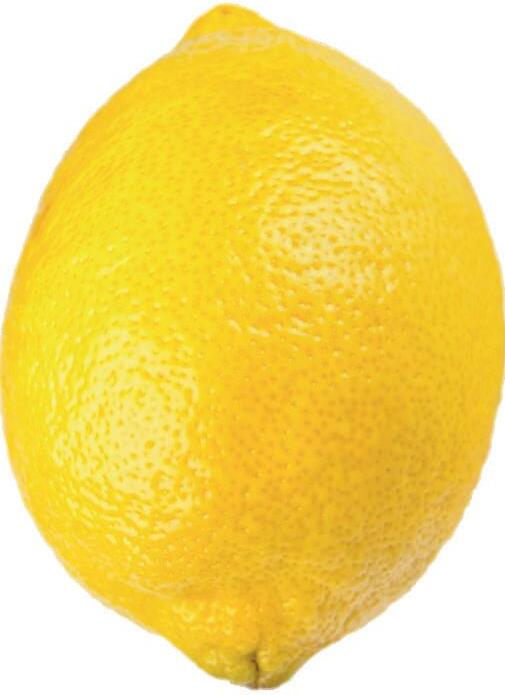



standard in produce packaging, reducing plastic waste and helping create a more sustainable future.”
Zespri CEO Jason Te Brake, echoed those sentiments. “Our collaboration with Sinclair reflects our commitment to embracing more sustainable practices across our global supply chain,” he commented.
“Exploring more sustainable fruit label options has been an area of considerable focus for Zespri over a number of years with our labels providing an important assurance to consumers that the fruit they are purchasing is authentic, safe and high-quality Zespri kiwifruit. We intend to change all of our fruit to this fully home compostable label with the transition to take place over the next year.”
Jiunn Shih, chief marketing, innovation and sustainability officer at Zespri, added: “We these certifications mean and why they matter.
“We need to ensure all interested parties are aware that certified compostable labels are on the table,” Jones explained. “Finished product certified compostable fruit labels offer a practical and sustainable packaging solution to decrease packaging volume and reduce plastic waste. Fruit labels will continue to effectively market fresh produce, enhance branding, distinguish products, promote healthy eating and fulfil retail produce traceability and point of sale needs.”
Over the next six months to a year, he said, the company's communication would focus on “explainer marketing”, as opposed to sales marketing, in order “to help people understand the terminology, what these certifications mean and why they're important”.
Commenting on the breakthrough, Sinclair CEO Colin Woodward said the company was thrilled to introduce what is the highest-performing compostable fruit sticker to be certified by institutions TÜV Austria, ABA and Din Certco as a ‘finished product’.
“This is a unique achievement, and the industrial and home composting certification is a testament to our relentless pursuit of innovation and our dedication to supporting the fresh produce industry with environmentally conscious solutions,” he said.
“We believe this compostable label sets a new
TOP—
Jiunn Shih of Zespri RIGHT—Sinclair’s Duncan Jones
know consumers want to see us make progress towards more environmentally friendly labels and this compostable sticker not only meets their expectations but supports our sustainability goals by reducing plastic waste. We’re proud to have worked closely with Sinclair on this innovative development.”
TÜV Austria’s ’finished products’ certification for home and industrial settings, and similar home composting certification from ABA and Din Certco, are understood to guarantee that the fruit sticker is safely compostable, meaning it will break down and biodegrade completely without leaving harmful residues in the environment.
According to Sinclair, the new sticker provides a minimal packaging solution that reduces consumer waste and can be disposed of in home compost bins along with fruit peels and other organic waste. E

FESTIVAL OF FRESH 2025 takes place at the home of FreshLinc in the vegetable-growing heartland of Spalding, Lincolnshire in June. We’ll be just across the road from Worldwide Fruit, who will host tours of their cutting-edge facility. So don’t miss your chance to be involved in the UK’s best fresh produce industry event!

Organised by In partnership with
For more information, contact us at festivalo resh@fruitnet.com or visit fruitnet.com/festivalo resh EXPECT FANTASTIC NETWORKING OPPORTUNITIES
INSPIRATIONAL SPEAKERS
DELEGATE TOURS
FRUIT AND VEG SAMPLING and DELICIOUS FOOD AND DRINK
#festivalo resh
McKinsey & Company has launched its Global Farmers Insights 2024, with respondents highlighting extreme weather, increased input costs and unstable commodity prices as major challenges.
by Carl Collen

Research released by McKinsey & Company has revealed that global farmers are eyeing sustainable practices, innovative technology implementation and new yieldincreasing products to boost profits given wider macro-environmental pressure.
McKinsey’s 2024 Global Farmers Survey, which gathered perspectives from 4,400 farmers, outlined a “cautiously optimistic” outlook around the ability to capture increased profits in the years to come.
However, expectations on rising profit margins differed widely
based on region, with North American and European farmers overall expecting profits for 2024 to be lower by 64 per cent and 55 per cent respectively.
Meanwhile, farmers in Latin America and India anticipate higher profits over the next two years, 58 per cent and 76 per cent respectively, up from 42 per cent and 37 per cent in 2022.
The survey revealed that many farmers are integrating new technology in their operations to bolster future profits. However, technology adoption is largely

dependent upon farm size – large farms (more than 2,500 acres) being 45 per cent more likely to adopt agtech compared to small farms (less than 100 acres), due to the scale needed for positive ROI in agtech.
“Farmers continue to adopt technology, albeit at a slow pace,” McKinsey & Company outlined.
“The survey found a threepercentage-point increase since 2022 in the number of farmers using or willing to adopt at least one new digital technology to improve operations. North American farmers lead adoption of technology, while Latin America

experienced the fastest growth (a ten percentage point increase from 2022 to 2024).”
Farmers globally were more inclined to adopt new technologies that directly improved operations, the survey found. The US has the highest adoption of operations-focused technology, with 61 per cent adoption of digital agronomy, 51 per cent adoption of precision agriculture hardware, and 38 per cent adoption of remote-sensing technologies. Digital agronomy and precision agriculture hardware are the top-two leading technologies around the world.
Sustainability is an area farmers said they are investing in to improve productivity and add revenue streams, the survey found.
In India, North America and Latin America, farmers are implementing sustainable practices to increase yields, while European farmers are interested in additional revenue streams.
With weather-related risks continuing to top farmer concerns, sustainable growth practices enable them to play a key role in shaping the future by combatting the challenges associated with extreme weather caused by climate change, McKinsey said.
“Farmers are facing a critical moment, with the economy and a range of macro factors putting immense pressure on the industry,” commented Vasanth Ganesan, partner at McKinsey. “From extreme weather events to volatile commodity prices and supply chain disruptions, these challenges are driving up costs.
“Our survey shows that farmers who want to boost their profits in the coming years need to invest in

their operations, whether through sustainable farming methods or adopting agtech to streamline processes and reduce labourintensive tasks,” he outlined.
McKinsey’s survey also found that farmers continue to cite input prices (48 per cent) as a main risk to future profits, despite a general decrease in the cost of fertiliser and crop protection active ingredients over the last year. In fact, 13 per cent of farmers surveyed report a perceived increase in overall costs over the past 12 months.
Additionally, extreme weather remains a top concern for farmers, with European and Latin American farmers in particular noting impact on profits.
“As farmers re-evaluate their business operations to maximise profitability in today’s volatile economic landscape, amid extreme weather concerns and high commodity prices, many are turning to the adoption of new products and sustainable practices, but with the requirement that they must provide significant ROI for farmers to validate the changes necessary to overhaul their operations,” McKinsey added. E
Discover our cutting-edge innovations for the fresh-cut industry and vegetable processing. Visit us at Fruit Logistica in Berlin from February 5th to 7th.
Be inspired by live demonstrations and knowledge-sharing sessions with our experts.








Companies aim to combine strengths in agronomy, irrigation, digital platforms and data modelling to benefit growers.
by Carl Collen
Bayer and Netafim, Orbia’s Precision Agriculture business, have announced an expansion of their strategic collaboration, starting with new digital farming solutions for fruit and vegetable growers. The new solutions aim to help growers maximise crop production and optimise their use of resources, thus minimising the impact on the environment.
This is done by simplifying primary data collection and delivering a system that can generate tailored recommendations from that data, the groups said.
“Many vegetable and fruit growers experience challenges when switching between multiple software applications, and the siloed nature of today’s solutions is adding
complexity to daily activities, rather than simplifying them,” the statement read.
“As part of the companies’ expanded collaboration, Bayer has developed a new digital platform called HortiView to simplify primary data collection and sharing for the cultivation of fruits and vegetables, enabling growers to benefit from an ecosystem of connected agronomic services that support data-driven decisions and market access.”
At the same time, Orbia Netafim has developed irrigation insights to be available through HortiView’s platform. The collaboration will also expand to include connectivity to GrowSphere, Orbia Netafim’s all-in-one irrigation operating system, which features optimised irrigation, crop protection and fertigation applications.
“Digital technology offers tremendous value in horticulture, but those digital tools rarely work together, and it’s been extremely difficult for growers to use their own data in data models that can help them optimise crop production use,” said Chris Pienaar, fruit and vegetable digital new value lead for Bayer Crop Science.
“Bayer and Orbia Netafim can address these pain points and provide growers with a platform that can generate tailored recommendations specific to their unique environments, cultivation practices, and crops.” E




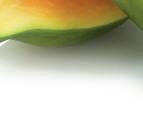













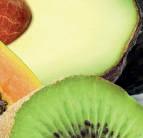




















BG Door and Advanced Ripening Technologies have developed a mobile ripening solution called the Advanced Ripening Unit (ARU). Quality equipment is a precondition for optimum results in cooling and ripening for a wide range of exotic fruits, including bananas. Using high-grade materials and equipment based on proven technologies. The ARU can be placed in existing cold rooms to create an all-in-one ripening system. Making sure you’re always in control of your ripening.



Searching for control? www.bgdoor.com
Machine denests and fills cardboard trays with fruit, and offers increased flexibility and efficiency, the group says.
by Carl Collen
Italian packaging machinery specialist Frutmac is introducing the Jollypack Vario at Fruit Logistica in Berlin, a new compact, versatile, and highly automated solution for denesting and filling cardboard trays with round fruit. Developed for modern production lines, Frutmac says the machine offers “numerous advantages” that increase both flexibility and efficiency for fruit production and packaging operations.
“With a compact length of 3 metres, the Jollypack Vario integrates into existing production environments,” the group says. “It can fill both trays with and without flaps, providing a high degree of flexibility in packaging options. The automatic format change allows for quick transitions between different packaging types without manual intervention, adapting easily to varying requirements.”
Its VarioConvoy system ensures gentle transportation of the fruits without causing damage, while different
The Jollypack Vario’s SmartFiller allows different fruit calibres and placement patterns to be combined in a single package. This ensures that the filling quantity per tray is optimised to the desired weight, reducing excess weight in individual packages. The open trays also allow ergonomic manual intervention

calibres are conveyed with precision and securely positioned, safeguarding product quality.
Thanks to innovative guidance technology, collisions are avoided, which is particularly important for delicate fruit varieties, Frutmac explains.

for quality control, further increasing flexibility and quality.
According to Frutmac, the machine’s fully automated operation not only reduces manual labour but also allows staff to be deployed elsewhere. This in turn optimises work processes and uses resources more efficiently, while the touch control interface of the machine makes it easier to operate and reduces training time.
“The tray magazine of the Jollypack Vario is positioned at an ergonomic height of 1.3m, reducing the physical strain on staff,” the company continues.
“The four-stack carousel logic allows continuous filling ‘on the fly’ without interrupting the production line. Additionally, the Jollypack Vario can be flexibly integrated with other machines, such as sealing or flowpack systems, enabling seamless integration into existing production lines.
“The Jollypack Vario is the ideal solution for fruit production and packaging operations looking to enhance their efficiency and flexibility,” Frutmac adds. “With its compact design, fully automated format change, and the ability to combine different fruit calibres in a single package, this machine provides an optimal solution for the modern demands of fruit packaging.” E
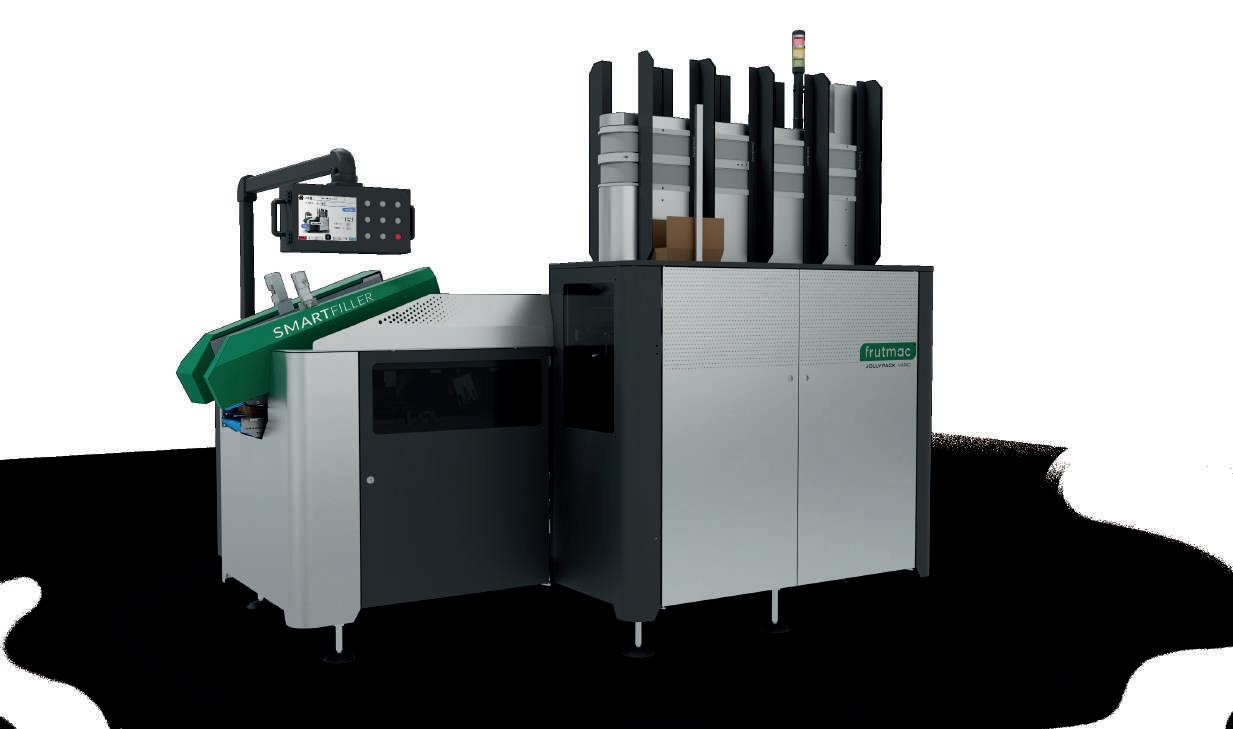

The CAP 350 cabbage cutting machine, which will debut at Fruit Logistica, processes large quantities of whole cabbage heads up to 350mm in diameter.
by Carl Collen
Kronen has unveiled its CAP 350 cabbage cutting machine, a further development of its CAP 68 offering. The new machine, which will be introduced at Fruit Logistica this year, is also able to cut larger cabbage heads and features an optimised hygienic design.
“With its wider product infeed and larger cutting disk, the CAP 350 can process cabbage heads measuring up to 350mm in diameter,” the German group
explains. “The cutting machine is therefore able to process larger heads of white and red cabbage as standard.”
The capacity of the CAP 350 is up to double that of the CAP 68, Kronen outlines, processing up to 5t/h. For a 1.3mm cut, for example, it can process up to 2,000kg of cabbage per hour, depending on the size of the raw product. The cabbage heads are cut into strips with a consistently high cutting quality, it says. The

cutting thickness can be adjusted, with the standard model offering thicknesses of 1.3mm, 1.8mm, 2.3mm and 2.8mm, while other cutting thicknesses can also be offered on request.
“The cabbage cutting machine has also been optimised with regard to its accessibility and hygiene,” Kronen says. “Its open design with removable covers makes it easier to clean and facilitates the rapid replacement of the cutting disk.” E










































BERLIN 5|6|7 February FRUIT LOGISTICA 2025 HALL 2.1 | STAND A-40


• Open forum in the exhibition halls – Free of charge to all • 20 minutes sessions on 2 trade fair days (5.-6. February 2025)
• AI Translation: German, English, Spanish, French, Italian





Visit FRUIT LOGISTICA, learn about the latest trends and be inspired by high-ranking speakers.




MESSE BERLIN GmbH Tel +49-(0)30-3038-0 fruitlogistica@messe-berlin.com
FRUCHTHANDEL MAGAZIN Tel. +49-(0)211-9 91 04-40 anzeigen@fruchthandel.de
With a focus on biostimulants and nutritional products, Hydro Fert’s range is designed to improve plant quality and quantity, export manager Francesco Di Pietro explains.
by Carl Collen
What are the most important developments at Hydro Fert?
Francesco Di Pietro: Hydro Fert constantly tries to propose new solutions in its catalogue so as not to leave any developing agricultural problems or needs unresolved. One of the latest developments is Betamin, a product based on amino acids originating within seaweed, that improves both root and vegetative development of plants besides the absorption of nutrients and the photosynthetic efficiency. The content of betaines increases the osmotic potential of plant cells and reduces the abiotic stress, thus improving yields in terms of quality and quantity. Its repeated application increases the dry matter of fruits and plants. Betamin is highly effective in all the phenological phases of development, guaranteeing vegetal and reproductive balance.
What are the main solutions you offer to growers?
FDP: Hydro Fert can offer a wide range of different solutions to farmers, with fertilisers of all kinds and categories, each one

with specific purposes. Focusing on biostimulants and nutritional products, our specialty fertiliser content is based on seaweeds, humic and fulvic acids, amino acids, vegetal extracts, organic matter, macro and micronutrients, thanks to which we can satisfy the needs of farmers according to their varied requests.
How is demand in your main markets?
of the globe – Europe, the MENA area, Southeast Asia, the Far East – and the current goal is to penetrate one or more markets in Latin America, starting with Ecuador, Chile and Peru.
Can you tell us how your growers are adapting to climate change?
FDP: One of the main objectives of biostimulants is to positively influence the plant’s resistance against abiotic stress, and this is why our company is constantly committed to conceiving our fertilisers and confirming their effectiveness against both water and saline stress.
TOP—Hydro Fert’s solutions can aid plant resistance to climatic stress
FDP: There’s a growing demand to cope with fertilisation features that are based on the specific needs of effective solutions for a variety of crops and agricultural conditions, but at the same time with little environmental impact and in line with a greener agriculture. We are already present in various regions
In case of extreme weather conditions, the supply of fertilisers can decisively help the crops, since the use of such formulations puts plants in a far better phytosanitary state, and therefore they have a stronger resistance against any drastic climate conditions. A plant with a more developed root system and a bigger leaf area will have a higher chance of adapting itself against climatic stress compared to a non-biostimulated one. E


Ifco highlights independent life cycle assessment that says reusable packaging cuts CO2 emissions by 62 per cent compared to single-use offerings.
by Carl Collen
Anew independent life cycle assessment (LCA) has said that Ifco reusable packaging containers (RPCs) “significantly outperform” singleuse packaging in key sustainability metrics.
the efficiency and environmental benefits of the Ifco SmartCycle circular pooling model,” the group stated. “In the process, Ifco empowers all stakeholders to embrace the circular economy and make the fresh grocery supply chain sustainable.”
Comparative LCAs were “complex to undertake”, Ifco said, but were described as an essential
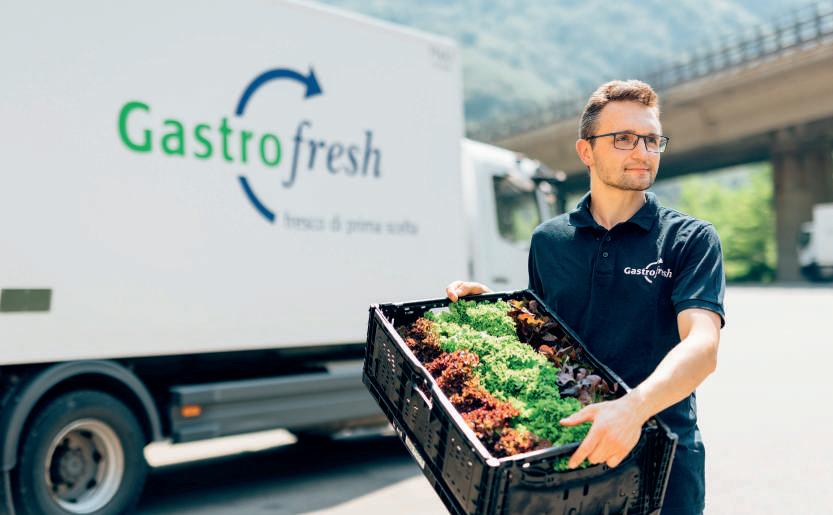
Ifco explained that it commissioned the Fraunhofer Institute for Building Physics to conduct the peer-reviewed comparative study in accordance with international standards. The study showed that, taking the full life cycle into account, compared to single-use packaging Ifco RPCs had a lower carbon footprint and “saved natural resources”.
“The results reflect Ifco’s longstanding commitment to continuously improve and share
component of its ESG Strategy. Such studies helped to identify and define the decarbonisation levers and milestones that supported Ifco’s goals of becoming a net-zero, zero-waste business by 2040, it commented.
The study found that, over the entire life cycle, Ifco RPCs were found to consume 69 per cent less water, generate 96 per cent less waste, consume 59 per cent less energy and generate up to 62 per cent less CO2, an improvement from 60 per cent in 2018.
Iñigo Canalejo, vice president ESG and strategic marketing at Ifco, highlighted the vital role of independent, peer-reviewed comparative LCAs
BELOW—Ifco RPCs, here being utilised by new partner Gastrofresh
for customers and product development.
“Providing scientifically verified data on the sustainability of our reusable packaging compared to single-use packaging gives our customers the confidence that Ifco RPCs are the best choice for their supply chains,” he said. “This latest independent life cycle assessment confirms that our continuous improvements are delivering impactful, measurable results.
“With up to a 62 per cent reduction in carbon emissions along with significant savings in
“Ifco empowers all stakeholders to embrace the circular economy and make the fresh supply chain sustainable”
water use, energy consumption and waste, Ifco RPCs are essential in making the fresh grocery supply chain sustainable,” he added.
Meanwhile, Ifco has partnered with Gastrofresh, the fast-growing specialist supplier of high-quality fresh products to the hospitality and gastronomy sectors in South Tyrol, northern Italy.
As the exclusive provider of RPCs for Gastrofresh, Ifco said it ensured the regional premium supplier achieved key sustainability and efficiency goals, including reducing the carbon footprint of its supply chain, ensuring timely deliveries and implementing zero-waste business practices. E






“Unprecedented
partnership” to promote healthier eating includes new branded packs aimed at children.
by Carl Collen
PICTURED—Lion King-branded PinKids packs will be available in eight different European countries


Pink Lady has announced a partnership with Disney which aims to encourage families to eat healthy products and adopt a balanced lifestyle. The tie-up will take place across eight European countries, “combining the strengths of two positive, committed brands”.
A statement said that together the two brands shared a common vision “based on the values of quality, positivity and social responsibility”.
Lion King licensing will feature on PinKids packaging.
The partnership will then continue in May when Pink Lady switches to the Mickey Mouse & Friends licence in over 30 stores across Europe, as it aims to give greater visibility to the two ranges.
This activity will be supported by several promotional initiatives, including stickers and in-store displays, over 1,100 POS displays, around a hundred in-store activations, and 300 spotlights throughout the season, as well as dedicated in-pack promotions and a consumer game with exclusive gifts that include giant soft toys and co-branded products.
“This increased visibility should make it possible to reach 3,000 tonnes [of Pink Lady and PinKids] sold under the licence, or a target of 3.2mn shopper households,” Pink Lady noted.
“This increased visibility should make it possible to reach 3,000 tonnes sold under the licence, or a target of 3.2mn households”
“With iconic characters such as Mickey and Simba [from The Lion King], this campaign brings an emotional, cross-generational dimension that will appeal to families, especially their youngest members, who tend to impact choices made at home,” it read.
As part of the campaign, Pink Lady plans to offer a range specially designed for children, PinKids, to make the Disney partnership “even more relevant”, it said. From December 2024 to April 2025, Disney
The apple brand outlined that the Disney partnership reaffirmed its commitment to innovation to broaden the appeal of apples, while helping families to adopt a healthier diet, and also reinforcing its position as an established premium brand.
“Disney, recognised worldwide for its positive impact on families and children in particular, brings a playful and educational touch to the act of consumption,” the group added. “Together, Pink Lady and Disney are helping to build balanced lifestyles for children and their parents.” E

IMA FLX HUB, AT THE CENTRE OF YOUR NEXT COMPLETE FLEXIBLE PACKAGING LINE.
Weighing, counting, VFFS vertical bagging, HFFS flow wrapping, net clipping and end-of-line packaging solutions combine with each other to form tailored turnkey lines for the Produce industry.
On show, an IMA Ilapak Vegatronic 6400 ML bagger for cut salad coupled with a WA PRO 16-50 multi-head weigher, and the IP 3000 case packer for the fresh produce.
FRUIT LOGISTICA 2025
BERLIN, GERMANY - 5-7 FEBRUARY 2025
Hall 1.1 | C-10
ima.it/it/flexible-packaging-hub
ima.it

The positive trend in container throughput continued through the first nine months of last year, although the geopolitical situation slowed growth in other product groups.
by Carl Collen
The Port of Antwerp-Bruges saw a total throughput of 210.5mn tonnes through the first nine months of 2024, an increase of 3 per cent compared with the same period of 2023. Demand for container transport remained strong, the port said, while ongoing geopolitical and economic instability had impacted other cargo types.
Despite these challenges, there had been continued investment in sustainable and innovative projects to support energy transition and industrial growth, it noted. Container throughput in tonnes increased by 8.9 per cent year-onyear, with imports growing by 10.2 per cent and exports by 7.9 per cent.
The growth seen in the first half of the year continued in the third quarter, with 12.3 per cent more containers handled (TEUs) than in the same quarter of 2023. Over the first nine months, total container
throughput in TEUs increased by 6.8 per cent to 10.15mn TEUs.
In the first half of 2024, Port of Antwerp-Bruges’ market share in container handling in the Hamburg–Le Havre Range grew by 0.8 percentage points compared to 2023, to 30.7 per cent.
The port pointed out that nearly one in ten of the containers handled was a reefer container. Through the January to September period, the number of full reefers increased by 9.7 per cent, accounting for 8.5 per cent of total container throughput.
These temperature-controlled containers carried products such as fresh fruit, vegetables, meat, fish, pharmaceuticals and chemicals.
times continues to pioneer and invest in a future-proof port where sustainability and economic growth go hand in hand.”
Jacques Vandermeiren, CEO at Port of Antwerp-Bruges, said that despite geopolitical tensions, rising energy prices and global competition, the port was stabilising its growth thanks in part to a strong position in container handling.
20.5mn tonnes of container throughput in jan-sept 2024
Although conventional general cargo performed strongly in the second quarter, throughput fell in the third quarter, bringing total throughput for the first nine months of 2024 down by 4.8 per cent compared to last year.
“Despite ongoing geopolitical and economic challenges, Port of Antwerp-Bruges’ growth is stabilising.,” the port stated. “The figures again underscore the resilience of the port, which in complex
“Sailing around the Cape of Good Hope, cyber attacks and other challenges are forcing us to remain flexible and resilient,” he explained. “Along with our partners, we are continuing to build a future-proof port where innovation supports both sustainability and economic growth.” E

Volumes quadrupled in the decade to 2023 as port plays growing role as regional agri-food hub.
by Maura Maxwell
The Port of Barcelona’s growing importance as a Mediterranean hub for agri-food products has led to a surge in the volume of refrigerated containers it handles each year.
Refrigerated container traffic is one of the fastest growing at the port and now accounts for 7 per cent of its total container traffic. In 2023, the port’s terminals handled a total of 235,435 refrigerated TEUs, quadrupling the 54,000 TEUs it handled a decade earlier.
“The Port of Barcelona has consolidated its position as a logistics hub for agri-food products, thanks to its excellent location for this type of goods, with direct
connections to the main ports of the western Mediterranean and access to a wide hinterland,” the port authority says.
“In addition to the regular road and rail connections with the main agricultural and livestock areas of Catalonia, Aragon and Navarre, there is also access to wholesale markets such as Mercabarna, Mercazaragoza, Mercamadrid or Saint Charles, in the south of France.”
Location, however, is not everything. The Port of Barcelona continues to implement new infrastructures and services for agri-food products. In the field of refrigerated transport, the container terminals - BEST, belonging to the Hutchison group, and APM Terminals Barcelona - as well as the multipurpose terminal Port Nou, currently exceed 3,500 permanent reefer connections, which places the port of Barcelona as the leader in the Mediterranean for this type of traffic. The BEST terminal is incorporating new infrastructure for refrigerated containers by the end of the year, which will mean that the Port of Barcelona will offer 4,000 reefer connections by 2025. E

Logistics group completes order of 20 dual-fuel vessels and announces Lufthansa airfreight agreement.
by Carl Collen

Maersk has announced the signing of agreements with three yards for a total of 20 container vessels equipped with dual-fuel engines. Combined, the vessels have a capacity of 300,000 TEUs.
“We are pleased to have signed agreements for 20 vessels and thereby completed the acquisition of 300,000 TEU capacity as announced in August,” said Anda Cristescu, head of chartering and newbuilding at Maersk. “These orders are a part of our ongoing fleet renewal programme and in line with our commitment to decarbonisation, as all the vessels will have dual-fuel engines with the intent to operate them on lower emissions fuel.”
All 20 ships will be equipped with liquified gas dual-fuel propulsion systems and vary in size from 9,000 to 17,000 TEU, Maersk pointed out. The first vessels will be delivered in 2028, and the last delivery will take place in 2030.
“Due to their different sizes, the vessels will be able to fill many
roles and functions within our future network and give us a lot of deployment flexibility when they are ready to enter our fleet,” Cristecu added. “Once phased in, they will replace existing capacity in our fleet.”
300,000 teus of capacity across 20 new vessels
Additionally, Maersk and Lufthansa Cargo signed an agreement to promote the decarbonisation of airfreight through the use of Sustainable Aviation Fuel (SAF).
Lufthansa used 400 tonnes of SAF on behalf of Maersk at the end of 2024, seen as an “important contribution” in the year-end business with traditionally high cargo volumes.
“As one of the largest logistics companies, Maersk aims to reach net zero greenhouse gas emissions by 2040”
The expected reduction of CO2 emissions corresponded to at least 1,200 tonnes.
“Cutting greenhouse gas emissions from airfreight is one of the most challenging tasks within the decarbonisation of global logistics and supply
chains,” said Morten Bo Christiansen, head of energy transition at Maersk. “This is why we are excited to partner with Lufthansa Cargo in this important task.
“As one of the globally largest logistics companies, Maersk aims to reach net zero greenhouse gas emissions by 2040 across all modes of transport as well as other business areas like warehousing and container terminals.
“The uptake and availability of SAF in the aviation industry is still limited,” he explained. “Our agreement with Lufthansa Cargo enables Maersk to contribute to an increase in the uptake.” E
ABOVE— Lufthansa used 400 tonnes of Sustainable Aviation Fuel on behalf of Maersk at the end of 2024
Photo: Jakub Rutkiewicz, Adobe Stock





• Open forum in the exhibition halls – Free of charge to all • 30 minutes sessions on each 3 trade fair days

Visit FRUIT LOGISTICA, learn about the latest trends and be inspired by high-ranking speakers.





BERLIN 5|6|7 February FRUIT LOGISTICA 2025 HALL 26 | STAND A-99










MESSE BERLIN GmbH Tel +49-(0)30-3038-0 fruitlogistica@messe-berlin.com
FRUCHTHANDEL MAGAZIN Tel. +49-(0)211-9 91 04-40 anzeigen@fruchthandel.de

While trade bans have cut the country’s procurement options, an extensive frost has hampered its policy of import substitution. Resulting crop failures, and the ruble’s increasing weakness, could have dramatic consequences.
by Eugene Gerden, Tom Joyce & Mike Knowles





Future trends in Russia’s fresh produce market are hard to predict. However, it seems likely that the country will ease restrictions on imported fruit and vegetables in the coming year, as it attempts to counteract high consumer price inflation and to cope with a smaller domestic harvest. In the meantime, the country’s fruit importers find themselves under intense pressure after a steady weakening of national currency the ruble. That pressure will have to be eased somehow.
Russia imposed import controls on fresh fruit and vegetables in August 2014 as part of a broader ban on food imports from the EU, US, and other Western countries like Canada and Australia. That decision was retaliation for sanctions imposed on Russia following its annexation of Crimea and involvement in the conflict in eastern Ukraine. The restrictions were part of a larger set of measures aimed at countering Western economic pressure and supporting domestic agricultural production. The country’s recent invasion of Ukraine has led to further isolation and sanctions.

The freezing of trade relations has led to significant changes in Russia’s food supply chains, with increased imports from non-sanctioning countries like Turkey, China, and Latin American nations.
And they have sparked efforts to boost domestic agricultural production, most notably through a very deliberate government policy known as import substitution.
But more recently, Russia has even introduced what it referred to as temporary restrictions on tomatoes and apples from Armenia, and on imports of various fruit and vegetables from Kazakhstan, citing food safety concerns. And as reported by EastFruit in October, Kazakhstan and Belarus both then blockaded Russia’s access to shipments of fresh produce including apples.
A similar attempt to strongarm Moldova by banning its fruit and veg in 2023 appears to have backfired. Back in 2018, Moldova exported almost 70 per cent of its apricots, cherries, peaches and plums to
the Russian market, according to Emerging Europe. By 2023, this figure had dropped to 18 per cent. According to the Moldovan Fruit Association, the country exported 2,600 tonnes of sweet cherries to the EU in 2023, 12.5 times more than the year before.
In effect, a market where imports used to flow almost freely into the country – prompting fresh produce companies and associations from all over the globe to invest heavily in trade fairs like World Food Moscow – has now shrunk considerably. Prior to February 2022, the overall volume of fruit sold in the Russian market was estimated at almost 15mn tonnes per year. And much of that came from outside.
Russia must now act to cope with a serious downturn in its harvested volumes that was anticipated as it approached the end of last year. That decline was mainly due to the consequences of frosts in May, although the ongoing hostilities in Kursk have added to the problem.
Kursk, a region in Central Russia that was partially under Ukrainian army control at the time of going to press, has never been among Russia’s leading fruit producers. But Ukraine’s incursion did, according to unofficial reports, lead to a loss of up to half the region’s fruit harvest.
More importantly, Russia’s overall output is expected to fall. According to data from Russian research agency BusinesStat, the country’s total fresh fruit harvest reached 1.75mn tonnes in 2023, up 1.9 per cent on the previous year. But this time it will be lower, after a significant part of its domestic production in the central part of the country was lost to abnormally cold weather in May.
Igor Mukhanin, president of the Russian Gardeners Association, indicated at the time that up to half of the domestic harvest – including apples and berries – would be lost. According to Mukhanin, up to 70 per cent of apple trees were affected, and some companies in the Belgorod, on the border with Ukraine, lost everything.
“We have jumped much higher in terms of production, but we have seven regions without apples due to frosts” »
The impact of Russia’s poor harvest on the market can already be seen. Coupled with record inflation, it has led to growth in prices for most fruits of around


20-22 per cent year on year. And that inflation continues. This poses a threat to Russia’s Food Security Doctrine, which sets the minimum rate of self-sufficiency with fruits in Russia at 60 per cent. According to the Ministry of Agriculture’s earlier estimates, these figures are currently estimated at about 50 per cent, and there was a high possibility it would decline further by the end of 2024.
Confused picture
For apples, the situation is far from clear. Following the frosts, during May-November, Russia reportedly increased its imports by 70 per cent to 115,000 tonnes, compared with 68,500 tonnes in the same period of 2023.
According to Russian statistics service Rosstat and local newspaper Business FM, the biggest growth in overseas apple supplies came from China, Turkey and South Africa. Some data suggest China’s apple exports to the country rose almost fourfold to 14,600 tonnes, a record level since 2018.
115,000
may-november 2024
Turkish apple supplies from May to September increased 2.6 times to 22,500 tonnes, while South Africa’s

were 2.3 times higher at 22,600 tonnes. Argentina and Brazil also more than doubled their apple shipments, to 1,800 tonnes and 177 tonnes respectively. Moldova, Serbia and Kazakhstan also sent some fruit.
However, according to estimates released by Russian Minister of Agriculture Oksana Lut, the May frosts won’t stop the latest overall apple harvest reaching 1.6mn tonnes, higher than the average for the last five years. And according to Lut, by 2028 Russia will no longer depend on apple imports due to the growth of domestic production.
Igor Mukhanin believes the situation in Russia’s apple sector is not so easy to quantify. “This year we have already jumped much higher in terms of production, but we have seven regions without apples, [because] they suffered from frosts,” he says. “The main point is that Russia’s apple deficit is
non-typical. We only have a deficit for two or two-and-a-half months a year. This is May, June, and part of July, until our fresh apples come. In September, October, November, December, there is an excess of apples.”
Despite the confusion, Russia’s appetite for imported produce appears to be increasing, not declining. That’s something that exporters in Egypt in particular have noted. The volume of Egyptian products including citrus and potatoes being shipped to the market is already growing, according to Denis Logvinenko of Egyptian exporter Egast, who is based in Novorossiysk, near Russia’s largest port. “Volumes are not just increasing to Russia,” he reveals, “but to all the ex-Soviet Union countries, including Kazakhstan, Uzbekistan and Azerbaijan.”
Of course, sanctions and embargos have limited import options for companies, while pushing Russia to invest in food independence. However, according to Logvinenko, the country is not there yet and its attemps to replace products with homegrown alternatives needs more time.
He says Russian importers are glad to be able to work with Egyptian companies. “We still depend on some other countries, and the quality of Egyptian citrus is very good, especially the oranges. The quality of the grapefruit may be lower than Spanish, but all other citrus it’s perfect.”
He adds: “In addition, our local potatoes are not available all year round. We have them from May until around December, but the quality is not so good later in the season, so we turn to Egypt, which perfectly complements the Russian season.” E
OPPOSITE TOP— Ecuadorean bananas in boxes bearing the name of X5 Retail’s private label brand Global Village OPPOSITE BOTTOM—Russia depends heavily on imports, but retailers have tried to source more local produce ABOVE—Fruit on the shelves of an upmarket Moscow store
Through innovation, sustainability, and a commitment to shared success, Saudi Arabia’s Global Star Group hopes to redefine the future of fresh produce distribution and logistics, according to its co-directors, Shahzad Zafar and Stefano Iorini.
by Tom Joyce

What major developments have there been at your company as it heads into the new year?
Shahzad Zafar & Stefano Iorini: In 2025, Global Star Group is revolutionising the fresh produce sector by introducing cutting-edge 3PL and 4PL logistics solutions for international growers and local markets. This initiative offers an
integrated logistics framework, from import planning to delivery, focusing on Saudi Arabia and the wider Middle East. Our strong infrastructure and market expertise enable growers to access highdemand markets efficiently.
We’ve also launched the Global Star Fruit Bulletin, a market insights tool that offers detailed information on regional pricing and commodity trends. This report has become an
“We’re expanding our cold storage capacity by an additional 18,000 pallet spaces to meet our customers’ needs”
invaluable resource for industry stakeholders, reinforcing our commitment to providing actionable intelligence. We plan to refine and expand this bulletin, solidifying our role as a trusted partner and thought leader.
How have the past 12 months been for the company?
SZ/SI: Fresh produce distribution remains at our core. Despite challenges in 2024, like the closure of the Red Sea leading to market oversupply, we adapted by optimising operational efficiencies. We continued to provide consistent, high-quality service even amidst disruptions, reflecting our resilience and market expertise.
Our logistics division has seen strong demand, particularly with our state-of-the-art cold storage and temperature-controlled transportation services. We manage over 18,000 pallet spaces and have a robust network to ensure the integrity of fresh produce. Our logistics also extend beyond fresh produce, serving industries like frozen and dairy products, as well as restaurant chains, with end-to-end solutions.
Looking ahead, we’re expanding our coldstorage capacity by an additional 18,000 pallet spaces, continuing to innovate and grow to meet our partners’ needs.
SZ/SI: Global Star Group manages approximately 65,00068,000 tonnes annually. Our portfolio includes bananas, apples, citrus and other high-demand items, marketed under the Delizia brand and international labels. Our strategic partnerships with growers in South Africa, Egypt, Italy and Ecuador ensure premium quality produce, meeting the demanding standards of the
Middle Eastern market. The scale and consistency of our operations position us as a preferred partner for growers and a trusted supplier.
Where are your markets? Do you plan to open any new ones this year?
SZ/SI: Our primary markets are Saudi Arabia, the Gulf, and India, all of which have high demand for premium produce due to economic diversification and a focus on food
added solutions tailored to these new regions.
Will you launch any new products or expand existing ranges this year?
SZ/SI: In 2025, we will expand the Delizia brand, introducing new products such as premium citrus, apples and papayas to the Middle East. Additionally, we will continue to scale our 3PL and 4PL logistics services, enhancing temperature-

about the future. Growing demand for high-quality fresh produce, combined with a focus on sustainable logistics solutions, positions us to capitalise on emerging opportunities. Our ability to integrate technology and market insights allows us to stay ahead of the curve, delivering exceptional value and setting new industry standards.
How do deal with challenges like geopolitical uncertainty, high costs and climate change?
SZ/SI: We approach global challenges with proactive strategies. Concerning geopolitical uncertainty, we mitigate risks through diversified sourcing and a strong local presence, to ensure operational continuity. We invest in energy-efficient technologies and optimise transportation routes to manage costs and maintain service quality. Sustainability is at the core of our operations. We implement waste reduction initiatives and collaborate with growers on climate-resilient farming practices. These efforts ensure we remain resilient and adaptive, thriving despite global challenges.
What role does technology play?
SZ/SI: Technology plays a pivotal role in our operations, enhancing efficiency and precision across the supply chain. Advanced tracking systems provide real-time visibility into shipments, while data analytics support demand forecasting and inventory management. Automation in our warehouse operations ensures consistency and accuracy, strengthening our reputation for reliability and quality.
Finally, what are you showcasing at Fruit Logistica in Berlin, and what do you hope to get out of the event?
SZ/SI: We aim to connect with key players in the fresh produce industry – growers, distributors, retailers and logistics providers. The event will serve as a platform to network, explore new opportunities, and gain insights into emerging trends. Our goal is to refine our strategies and position Global Star Group for continued success in a rapidly evolving market.
security. In 2025, we’re exploring opportunities in emerging Asian economies, where urbanisation and a growing middle class are driving demand for imports. We aim to replicate the success we’ve had in the Middle East by building meaningful relationships and offering value-
controlled storage and optimised transportation for exporters. These efforts will strengthen both our product offerings and logistics infrastructure, reinforcing our position as a trusted partner in the fresh produce industry.
How would you sum up the state of the business currently?
SZ/SI: We are highly optimistic
We strive to be more than just a logistics provider. We want to be the partner of choice for fresh produce suppliers looking to expand in the Middle East and beyond. By leveraging our infrastructure, technological capabilities and market expertise, we deliver tailored solutions that address the unique challenges of this dynamic industry.
We invite partners, growers, and industry leaders to connect with us, and explore how we can collaborate and unlock new opportunities together. Through innovation, sustainability and shared success, we can redefine the future of fresh produce distribution and logistics. E
The last mile is an absolutely vital link in any supply chain, wherever you might be in the world. Here in Morocco, for the fresh fruit and vegetable vendors who sell their produce on the narrow, cobbled streets of Marrakech, that is definitely the case. As this seller wheeled his mobile stall extremely carefully and steadily through the ancient souks in the city’s famous Medina marketplace, he was sure to keep a watchful eye out as a mass of tourists, traders, and locals on motorbikes hurried past in both directions. Most of the fresh produce vendors in the area were selling just one or two types of product, rather than a whole array of fresh produce. And so it was for this gentleman, for whom a spike in demand for avocados and bananas would have been right up his street. E



































































































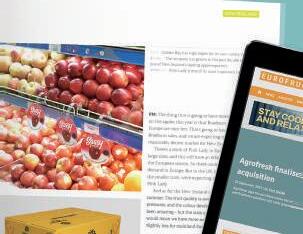














































10 printed copies of Eurofruit Magazine plus Fruitnet Specials
Digital edition: online access included
Fruitnet Daily News: fresh news updates sent to your inbox
10 digital copies of Eurofruit Magazine plus all Fruitnet Specials
Access to latest news and download content to read offline
Fruitnet Daily News: fresh news updates sent to your inbox
Eurofruit app is available for download, try it for free now!
the benefits of print & digital Bespoke packages available for your team or company Volume discounts for 3+ subscribers Personalised account management
A roundup of some of the key trends from the world of fresh produce retail across Europe.
by Mike Knowles
At the Maxi ICA Stormarknad store (right) in the Swedish city of Kalmar, a pilot project has been set up to help shoppers develop healthier eating habits and purchase more locally produced fruit and vegetables. The idea is to streamline the range in store, and to combine more seasonal products with better communication. The end result, it hopes, will be to deliver a more inspiring and informative product offer. “If we really want to get more people to put more fruit and vegetables on their plates, then we have to think again, and not highlight health and well-being as the main motive,” says Maria Wieloch, head of fruit and vegetables at ICA Sweden. “Our customers know that fruit and vegetables are useful, but still opt out of them to a large extent. Many do not know how to use the ingredients, or think that it is too complicated to prepare vegetables. Or that it doesn’t taste good! We have to start thinking and talking about fruit and vegetables as something both simple and tasty.”
Affordable organic is the order of the day at Jumbo (right). Already a key part of Dutch agriculture, the retailer wants to make organic products accessible to as many customers as possible. And it’s doing that by making them more affordable and easier to find. It recently signed up to a government project that places more attention on organic food, and in its stores it has trimmed prices and introduced more signage to boost demand.


Austrian discount supermarket chain Penny, which is part of Rewe Group, has followed its sister company Billa’s lead and started to sell what it calls Penny Rescue Bags (above right), a product designed to reduce the amount of food waste generated by its fresh produce departments. The bags contain different fruit and vegetables – most commonly
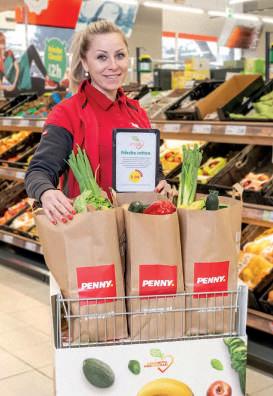
apples, bananas, peppers, and potatoes – that remain perfectly fresh and edible, but either no longer have their original packaging or carry some minor visual defects. The 3kg packs are sold at a fixed, reduced price of three euros.
Monoprix blends old with new Monoprix’s newly revamped Place Blanche store (below) in Paris – its oldest store in the French capital – presents a fresh and vibrant selection of fruits and vegetables, with an emphasis on quality and local sourcing. The store redesign integrates a modern approach to convenience shopping, including sustainable options and a wide array of fresh produce to meet urban demand.
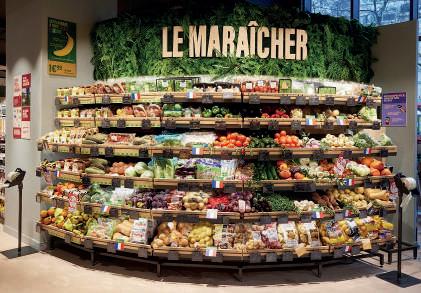

Fresh fruit and vegetables are among the most purchased products at Voll Pflanzlich (above), the vegan-only convenience store which Rewe Group opened in Berlin in April 2024. According to the company’s own six-month review, Rewe Bio organic cucumbers and bananas were in the top ten most popular items bought at the outlet. And crucially, the store appears to have been a hit with shoppers – around 5,500 of them per week in fact, the retailer says – who want convenience, healthy products, and the confidence to choose products without checking whether or not they are vegan-friendly. As a result, the group says it will consider whether or not to develop other plant-based, full-range stores in future.
Marks & Spencer continues to set a high bar in the UK, where it has opened more of its tastefully arranged Foodhall stores in recent months. The format has burnished the company’s reputation for premium quality and presentation, and reflects a commitment to selling and promoting fresh fruit and veg through meticulous sourcing, attractive displays (below), and a strong emphasis on seasonal, sustainably grown produce. As such, it appeals to health-conscious and quality-focused consumers. One of the latest Foodhalls to open was at Cribbs Causeway in Bristol. “The store is the latest evolution of our renewal programme,” says Nick Harris, senior produce supply chain analyst at M&S. “It looks fantastic.” E

For the latest news stories about developments in fresh produce retailing, visit Fruitnet.com. And remember to sign up for our Fruitnet Daily News email for regular updates from the fruit and vegetable business.


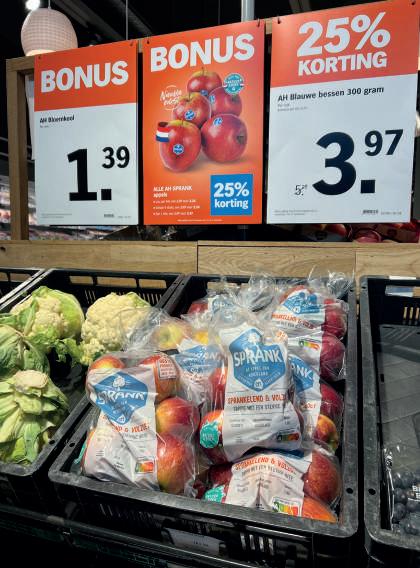
This supermarket packs a lot into a small space. Not just in terms of its range – which includes local apple brand Sprank and plenty of loose fruit and veg – but also as far as product innovation and added value is concerned. Two items in particular stand out. First are the fresh produce combination packs, each of which contains a mix of products to be used for a specific named recipe, such as chilli, lasagna, or burittos. Priced competitively at just over four euros per pack, this is a smart bit of merchandising that
gives shoppers a cost-effective and convenient fast-track to their evening meal. Second, the packs of snack-sized peppers, cucumbers and tomatoes look great and are exactly the kind of product that answers a consumer demand: in this case, a quick and easy way to eat something healthy for lunch. E












